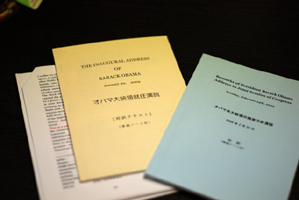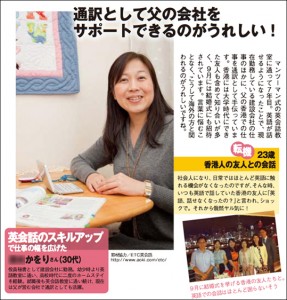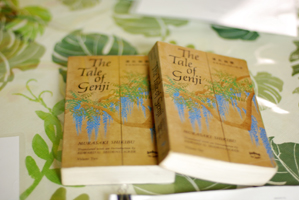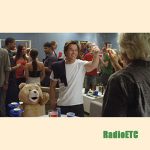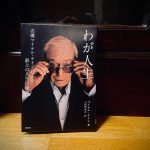Author Archives: HiroAOKI
英語はひとつではありません チャールズ先生(横浜・大坂上) ETCマンツーマン英会話
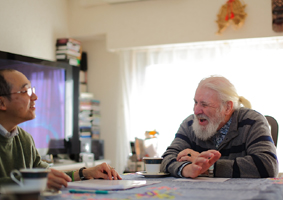
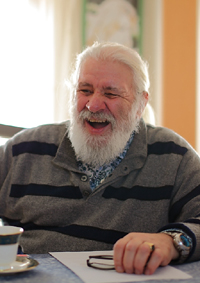 Q お生まれはどちらですか?
Q お生まれはどちらですか?
ハートリプールという北海の小さな町で生まれました。ハートリプールはダラム・カウンティに属し、スコットランドの国境から約40マイルのところにあります。私が子供の頃の主な産業は漁業と鉱業でした。そこには数年住んでいただけで、スコットランドのロック・ローモンドに引っ越しました。ロック(Loch)とは、スコットランド語で湖という意味です。最近ではゴルフコースで有名ですね。その後、アスコットに移りました。また、かつてイングランドの首都であったキングストン・アポン・ハルという主要都市に住んでいたこともあります。
I wan born in a small town on the North Sea called West Hartlepool. It is in County Durham, and about 40 miles from the border of Scotland. When I was young, the main industry was fishing and coal mining. But I spent very few years of my early childhood for there, then we moved to Scotland, and lived in the Loch Lomond area. “Lock” is the Scottish word for lake. And in these days, Loch Lomond is famous for its golf course. Then my parents moved to a place called Ascot. I also lived in navel cities like Kingston upon Hull, which is used to be one of the capitals of England
Q 先生の職歴についてお聞かせください。
英国では精神医学の看護士が本職でした。また、ホテル経営も行っていました。その後、コヴェントリー大学の特別コースで教職免許を取得して、日本で英語を教えることができるようになりました。最初は二子玉川のAITで約3年、そして、八王子の創価ハイスクールシステムで約3年、松戸の昭和学院で約3年、同時期に空いた時間を利用してビジネススクール等でも教えていました。企業向けには、東京ガス、丸紅等で講師をしていました。日本には約25年間住んでいます。
In England, real work was like I used to be psychiatric nurse and I also did hotel management. Then I went on a special course to get a teaching certificate from Coventry University, so I could teach in Japan. The first company I taught for was AIT in Futakotamagawa for about 3 years. Then I taught for Soka high school system in Hachioji area for about 3 years. And I also taught at Showa Gakuen in Matsudo for about 3 years. While at same time, I was teaching for English business school systems as well as in my spare time. On business, I taught Tokyo GAS, Marubeni, et cetera. I have lived in Japan almost 25 years.
Q 日本人は長い期間学校で英語を学んでいても、実際に海外に行くと英語がわからず、ショックを受けることがあります。より実用的な英語を学ぶために、良い方法はありますか?
 様々な英語の訛りを数多く聞くのが良いでしょう。日本人の方は一つの単語に対して、一つの発音の仕方しか知りません。でも、実際はいろいろな発音のされ方があるのです。簡単な単語「can」を例に挙げて説明しましょう。イングランドのいくつかの地域では、「カン」と発音します。でも、スコットランドでは「キン」と発音します。例えば「I can’t understand you.」が、「キネ・アンダスタンデュゥ」のように発音されます。ですから、英国に出張する際には、どの地域に行くのかによって、その地域に対応した訛りを教える必要があります。
様々な英語の訛りを数多く聞くのが良いでしょう。日本人の方は一つの単語に対して、一つの発音の仕方しか知りません。でも、実際はいろいろな発音のされ方があるのです。簡単な単語「can」を例に挙げて説明しましょう。イングランドのいくつかの地域では、「カン」と発音します。でも、スコットランドでは「キン」と発音します。例えば「I can’t understand you.」が、「キネ・アンダスタンデュゥ」のように発音されます。ですから、英国に出張する際には、どの地域に行くのかによって、その地域に対応した訛りを教える必要があります。
It is good to listen to English in many different dialects. You can only say each word in one particular way, but it can be said in many different ways. Let’s use the simple word like “can”. In some parts of England, they will say [kan]. But if you hear “can” in Scotland, they will say [kin] like, “kine understand you”. (=I can’t understand you.) So if they are going to work in England, depends on where they are going to work, you have to teach cross regional dialect in English.
美しい英語が聞きたければ、ぜひインバネスに行ってみてください。ネッシーで有名な場所です。インヴァネスの人々はイングランドよりもきれいな英語を話しており、スコットランドアクセントがほとんどありません。
If you want to hear beautiful English, you should go to Inverness, which is famous for Loch Ness monster. In Inverness, they speak better English than England, and hardly any Scottish accent.
Q イギリスと日本は文化的にどのような違いがあるとお感じですか?
日本とイギリスとは多くの部分で共通しています。私たちはどちらも島国ですし、過去において民族内での被征服の歴史があり、また国としての特性と独立性を保っています。そして、言語においては間接的な表現を用います。日本人は誰に対しても「no」ということが不得意ですね。その代わりに「maybe」という言葉を使います。でも、日本人のことを理解しているなら、日本人が「maybe」と言った時は、通常は「no」の意味であるこを知っているでしょう。
England and Japan also have all things in common. I mean, we are both island nations. We are both in past controlled a lot of countries within ethnicity. We both manage to maintain our individuality and independence. We are an indirect language, meaning Japanese have a hard time saying “No.” to anyone, and use it as the phrase that means “maybe”. But if you understand Japanese, you know that “maybe” usually means “no”.
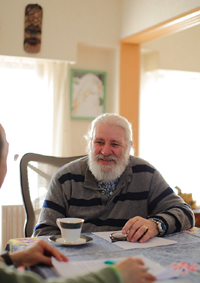 一方、アメリカ英語は、韓国語と同じように直接的な表現の言語です。彼らは、日本人には失礼だと思えるような点まで物事を直接的に表現します。しかし、彼らは決して礼を欠いているわけではありません。彼らの言語を彼らの方法で使っているのです。
一方、アメリカ英語は、韓国語と同じように直接的な表現の言語です。彼らは、日本人には失礼だと思えるような点まで物事を直接的に表現します。しかし、彼らは決して礼を欠いているわけではありません。彼らの言語を彼らの方法で使っているのです。
But American English is a direct language, like Korean is a direct language. They say things directly, almost to the point where Japanese think they have been rude. But they have not been rude. They are using their language in the way they use it.
アメリカ英語とイギリス英語には多くの違いがあります。イギリス英語のほうがずっと間接的です。例えばボクサーのカシアス・クレーのように「私が一番だ」などというイギリスはまずいないでしょう。当事彼は最も強いボクサーだったのでしょうけれど、もしイギリス人であれば、「I am not badder at boxing」(ボクシングが不得意ではない)というような言い方をするでしょう。たぶん本当は「私はかなりボクシングが上手い」ということを意味しています。
There is a lot of difference between American English and British English. British English is far more indirect. You wouldn’t find English person saying something like Cassius Clay, “I am the greatest.” Maybe he was at that time, but English would say, “I am not badder at boxing”, real meaning is maybe, “I am fairly good at boxing”.
Q マンツーマンのレッスンは生徒さん毎にカスタマイズされているのでしょうか?
なぜ生徒さんが英語を学びたいのか、どのようなお仕事をされているのかによってカスタマイズしています。もしビジネス英語が学びたいのであれば、ビジネス上の表現方法をお教えします。もし銀行にお勤めでしたら、銀行業務に関する素材を集めて、銀行業に関連する英語を教えています。ホテルにお勤めの方でしたら、丁寧な英語と接客の仕方を教えています。コンピューター会社に勤めていて、電子機器を販売している方でしたら、その分野で使われる英語を教えるでしょう。また、海外旅行に行くために英語を学びたいのでしたら、旅行英語をお教えします。でも、レッスンを行うのに際して基本的な考え方は同じ、生徒さんが必要としている言葉を教えるということです。
It depends on why they want to study English, and what kind of business they are doing. If they want to study business English, then I teach business phraseology. If they are doing baking, then I will try to find the baking material and teach them baking English. If they are doing hotel work, I teach basic courtesy English and how to deal with their guests. If they are working for computer company, and selling electronic goods, then you will find language based on that kind of area. If they are studying just for touring, then you will teach them tourist English. But basic concept to teach English is the same. It is just giving them the language they need.
 Q 先生の趣味を教えてください。
Q 先生の趣味を教えてください。
本を読むのが好きです。コナン・ドイルの『シャーロックホームズ』、チャールズ・ディケンズ、トーマス・ハーディ、劇作家では、『ピグマリオン』(マイフェアレディの原作)等を書いたジョージ・バーナード・ショー、詩人では、パーシー・ビッシュ・シェリー、現代詩人ではアレン・ギンズバーグ、ローレンス・ファリンゲティ等が好きです。
I enjoy reading. And I used to like reading books like, Conan Doyle、”Sherlock Holmes”, Charles Dickens、Thomas Hardy、play writes, like George Bernard Shaw who wrote “Pygmalion” et cetera. Poetry, poet I like Percy Bysshe Shelley. I like some modern poets like Allen Ginsberg and Lawrence Ferlinghetti.
日本人作家の本も数多く読みました。村上春樹、三島由紀夫。清少納言の枕草子、源氏物語も読みました。源氏物語はファンタジーのようですが、枕草子は作者の時代の活き活きとした現実を書き綴った作品ですね。清少納言は著名歌人の娘でしたが、彼女の歌もとても興味深いです。彼女が30歳を過ぎた頃にこんな歌を詠んでいます。「年經れば齡は老いぬしかはあれど花をし見れは物おもひもなし」。今日本で30歳といえば女性が一番美しい年齢です。でも、当事は女性の30歳と言えばすでに老いた年齢ということになってしまう。時代は変わりましたね。
I also have read lots of Japanese books, like Haruki Murakami, Yukio Mishima. I have read Seishonagon’s pillow book, and GENJI MONOGATARI, which I found that I think Genji is more like fantasy, but Seishonagon is more like real reality of her time. I understand that Seishonagon was a daughter of famous Waka poet. Her poetry is quite interesting too, because I think her age over 30 she wrote something “time has passed and age has come my way. But I need only look at this flower for all my cares to fade away”, which means these days even in Japan, age 30 is a peak of woman’s beauty. But in those days, I think 30-year-old woman was like old woman. Times change.
Q スコットランドの歴史を学ぶために、お奨めの映画はありますか?
とても古い映画ですが、いつかあります。『ウイスキー・ガロア!』はいかがですか。スコットランドの小さな漁村でのお話です。大量のウイスキーを積んだ船が沈没し、漁民たちはウイスキーを救い集め、それを隠してしまいます。国税局はこのウィスキーに課税しようとしますが、漁民たちは持っていないと嘘をつく、というコメディ映画です。
There are some very old movies, which you might like this one called, “Whisky Galore”. It is story about small Scottish fishing community, a boatload of whisky sank off their shore, and they rooted all this whisky and hide it. And Inland Revenue wants to get tax on this whisky, but they pretended they don’t have it. So it is a strange story
 他の映画ですと『ロブロイ』、メル・ギブソンがウォーレスを演じた『ブレイブハート』などからも、少し歴史が学べるでしょう。すべて歴史ドラマです。ただし、ある部分は事実に基づいていますが、ある部分は全くのフィクションだったりします。軽い内容の映画でしたら、かなり古いミュージカルですが、『ブリガドーン』がお奨めです。
他の映画ですと『ロブロイ』、メル・ギブソンがウォーレスを演じた『ブレイブハート』などからも、少し歴史が学べるでしょう。すべて歴史ドラマです。ただし、ある部分は事実に基づいていますが、ある部分は全くのフィクションだったりします。軽い内容の映画でしたら、かなり古いミュージカルですが、『ブリガドーン』がお奨めです。
Other movie like “Rob Roy”, Mel Gibson played as Wallace, “Braveheart” is so good one to learn a little bit. All movies are historical dramas. There is some truth there, but not total true. Light way movie is very old musical called “Brigadoon”.
☆チャールズ先生ご出演のRadioETC/ポッドキャスティング
▽英語の方言を学ぼう
▽英語で枕草子
▽スコットランド英語が学べるコメディ映画
◎Robert Burnsでスコットランド英語
▽Robert Burnsでスコットランド英語 – Caledonian bard とは
▽ビジネス英語とRobert Burns
▽ビジネス英語と英語訛り
▽スコットランド英語の発音の特徴
▽英会話上達にはdictation
▽Robert Burnsでスコットランド英語 – “To A Mouse”(朗読)
▽Robert Burnsでスコットランド英語 – “The Twa Dog”(朗読)
▽Robert Burnsでスコットランド英語 – “It There Fore Honest Poverty”(朗読)
▽Robert Burnsでスコットランド英語 – Burns’ Night とは
▽Robert Burnsでスコットランド英語 – “To A Haggis”(朗読)
◎BBCコメディ『The Thick Of It!』を観ながら
▽not before time”の意味は
▽“kind of”と”sort of”の意味は
▽“I was sucked in”の意味は
▽“flip-flop”の意味は
▽“come up with”の意味は
▽“bread-and-butter”の意味は
▽“belt-and-braces”の意味は
▽“you are on the ball”の意味は
◎バーンズ・サパー参加レポート
▽バーンズ・サパーとは
▽食前の祈り セルカーク・グレース(The Selkirk Grace)
▽バーンズ・サパー ハギスのために(Address To A Haggis)
◎BBCのドキュメンタリー番組『Dylan Thomas From Grave to Cradle』を観ながら
▽“sound familiar”の意味は? – Dylan Thomas From Grave to Cradle
▽“no less an authoritive source”の意味は? – Dylan Thomas From Grave to Cradle
▽atheistの意味は? – Do not go gentle into that good night
▽hang out の意味は? Among Those Killed in the Dawn Raid Was a Man Aged a Hundred
▽impede の意味は – Dylan Thomas From Grave to Cradle
▽ディラン・トマスが真似たチャールズ・ロートンの英語
22年の経験ファイナンシャル・アナリスト – ハーミー先生(横田基地) ETCマンツーマン英会話
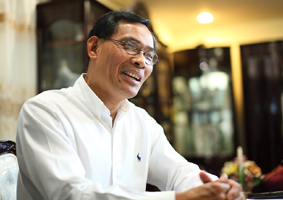
<<休止・帰国された先生のページです>>
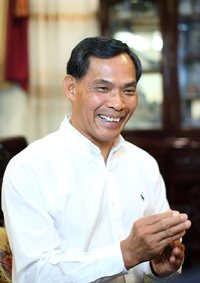
Q お生まれはどちらですか?
生まれはフィリピンです。フィリピンの北部で育ちました。両親は農業を営んでいますが、父は弁護士でもありました。生まれ育った環境はとてもよく、常に教育に重きを置いていました。
フィリピンは大戦後アメリカの統治下にありましたので、学校教育もアメリカの制度です。とても小さい頃から英語を学ばなければなりません。幼稚園では既に英語を話しています。ただし、私達はアメリカ人のように英語で育ったわけではありませんので、英語の構造・仕組みを理解する必要があります。英語を理解するために、同じ意味を持つ複数の異なった語句を覚えなければなければなりません。たいへんですが、とても価値のあることでもあります。驚くかもしれませんが、私たちフィリピン人のほうがアメリカ人より英語が上手いこともあるのです。
Q どのような高校に進学されたのですか?
カトリックの神学校に進学しました。司祭になるつもりでした。しかし、4年後、父が亡くなり、母が再婚したため、私は経済的に自立する必要がありました。私はこう思ったのです。「司祭になりたいわけではない。大学に進みたい。そしてエンジニアになりたいのだ。」 そこで、フィリピン北部にある大学に進み土木建築について学びました。司祭からエンジニアへと私の人生は転換したのです。しかし、また面白いことがおこります。陸軍士官学校に合格したのです。奨学生でしたので、授業料を家族に頼らず、自分自信で払うことができたのです。
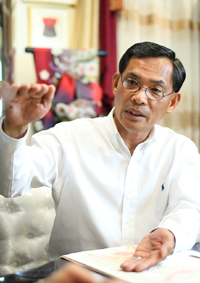
Q 現在のファイナンシャル・アナリストになるのにはどのようなきっかけがあったのでしょう?
1980年に空軍に配属されました。最初の6年間は物流部門にいましたが、上司が財務関連に対する私の能力に気が付き、私にファイナンシャル・マネジャーになるよう命じたのです。これが私のファイナンシャル・キャリアの始まりです。その後、私は所属部門の予算管理の責務を負うことになりました。
Q 民間企業でファイナンシャル・マネジャーをされていた経験もあり、社内教育も担当されていたそうですね。
GEメディカルシステムに努めていた時は、専門家、エンジニア、そして財務部門のスタッフと仕事をしていました。彼らは、アメリカ人の仕事の進め方を理解し、アメリカ人や他の国々の担当者に自分達の考えを伝える方法を理解したいと思っていました。GEは世界各国に支社があり、また本社は米国ミネソタ州にあったため、毎夜彼らは各国の担当者と投資案件や技術的な事柄について話しをしなければなりませんでした。そこで、私は彼らに状況を説明させ、その状況をさらに発展させてロールプレイのようなことを行っていました。ロールプレーは連日異なる内容のものになりました。常にビジネスや技術的なことが絡んでいましたが、私自身エンジニアでしたので対応することができたのです。

Q 最初のレッスンはどのように行いますか?
先ず最初に生徒さんのレベルをチェックします。もし、あなたが日本の技術者であっても、英会話力が初級レベルであれば、初級レベルの方にあったレッスンを行います。もし、いきなり上級レベルのレッスンから初めてしまうと、生徒さんは肝心な部分が抜け落ちたままの状態になってしまいます。先ず私は生徒さんのレベルを見極め、その後レベルアップさせてゆきます。
Q: 実践で使える英語力をつけるためにアドバイスをいただけますか
英語が本来の母国語ではない私が、今日のように英語が話せる様になった経験を振り返ってみると、皆さんが英語を上達させるためには、日常生活で使える語彙を蓄積して行く必要があります。とても簡単な単語からより難しい単語まで。まだ語彙の蓄積ができていない段階で、いきなり難しい単語から始めてはいけません。
レッスンでも毎日たくさんの言葉を学ぶように生徒さんに薦めています。例えば単語を10個選び、次回までにその単語を使って作文をしてもらいます。次のレッスンはその10の単語と10の文章を題材にして、実用方法に関する事柄をたくさん学びます。単語を知っていても、実際の場面での使い方が分からなければ役に立たないからです。
Q:レッスンを行う際に大切にしていることを教えてください。
レッスンに限らず、私が大切にしていることは、聞き手が理解できる言葉を話さなければならないということです。常に難しい言葉ばかりで話していてはいけません。小難しい言葉が良い言葉とは限りません。もし聞き手が理解できなければ良い言葉であるはずがないからです。大切なのは生徒さんが理解出来る様に彼らのレベルに合わせることなのです。
TOEICで高得点を取るには戦略が必要~ニール先生 (田町・板橋)ETCマンツーマン英会話
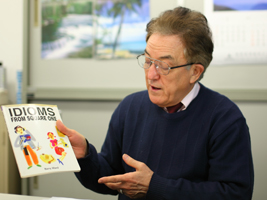
<<休止・帰国された先生のページです>>
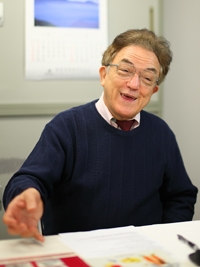 Q: 先生の生い立ちを教えてください。
Q: 先生の生い立ちを教えてください。
サンフランシスコで育ちました。カリフォルニア大学バークレー校でエンジニアリングを学び学位を取得した後、ニューヨークに移り働きながら経営学の修士を取得しました。エンジニアとしての職歴を積んでいます。現在は基本的にはエンジニアリング・ビジネス・コンサルタントとして働いています。
I grew up in San Francisco. I went to the University of California, Berkeley, where I received a degree in engineering. After that, I went to New York. While working there, I also got my master’s degree in business. Though my career was in the engineering, now I basically work as a technical and a business consultant.
Q: ビジネス英語を学ぶ生徒さんの多くは、ビジネスの実経験のある先生を好む傾向があります。
エンジニアは、沢山の書類を書き、お客さんとコミュニケーションを取り、交渉もしなければなりません。e-mailによるやり取りも、交渉も、プレゼンテーションも、それらすべてを行わなければならないのです。私もエンジニアとして、このようなビジネスの現場をすべて実際に体験し、その経験を生徒さんに教えてきています。
Engineers have to write a lot, communicate with customers, and also negotiate with them. In addition, they need to write e-mails give presentations, and so on. Therefore, working as an engineer I was exposed to all these business situations, hands on. Therefore, I feel that I am qualified to share all that with my students.
Q: 先生は日本語たいへんお上手ですね。日本語と英語の大きな違いは何だと思いますか?
英語はリズミカルに話すのに対して、日本語にはリズムがありません。すべての子音の後に母音が来て、また唇を殆ど動かしません。英語を話す時は顔全体の筋肉を使う必要があります。
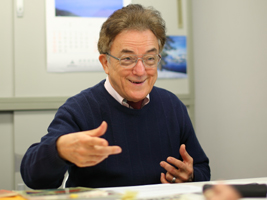 We generally speak English with a certain rhythm. But when speaking Japanese, it is not necessary to speak with rhythm. Every consonant is followed by a vowel. And one’s lips hardly have to move, but in English we have to use all our facial muscles.
We generally speak English with a certain rhythm. But when speaking Japanese, it is not necessary to speak with rhythm. Every consonant is followed by a vowel. And one’s lips hardly have to move, but in English we have to use all our facial muscles.
Q: では、先生が日本語を話すときはリズムをつけないようにしているのですか?
もちろんです。英語圏から来たばかりの外国人の多くがリズミカルな日本語を話していますがおかしく聞こえます。日本人は日本語をリズミカルに話すことはありませんから。
Of course. A lot of new comers from English speaking countries speak Japanese with the rhythm and they sound strange. That is not the way Japanese is spoken.
Q: 先生のレッスンは生徒さん毎にカスタマイズされているのですね。
皆さん明確な必要性、理由があって私のレッスンにいらっしゃいます。プレゼンテーションスキルを学びたい方、TOEICで高得点を取りたい方、外国のお客さんと交渉できるようになりたい方。皆さん特定の理由がありますので、レッスンもすべてカスタマイズされる必要があります。
Everybody has specific needs and a reasons for coming to me. They want to learn presentation skills, they want to get a good scores in TOEIC. There are others who come to me because they want to be able to negotiate when they meet their foreign customer. So every student has specific needs. So all my lessons need to be custom tailored.
Q: 先生がカスタマイズされたレッスンの具体例をお聞かせ下さい。
例えばTOEICの場合には、生徒さんが知っておくべき戦略がありますので、それをお教えしています。この絵の中に見えるものをすべて言ってみてください。リスニングの写真セクションでの戦略は、写真のある一点だけを見るのではなく、すべてに着目するということです。
If it is something like TOEIC, it requires strategies. I would go through the various strategies that students should follow. For example, I would show them a picture and they would have to tell me in detail everything they see in this picture. That way, when the students are working on the photograph section for listening, they will learn to grasp not only one aspect of the picture, but their eyes will focus on everything at once.
 また、このリスニングセクションでもう一つ有益なアドバイスは、過去のことは問われないということ。たとえば、「彼は今音楽を聴いています。彼女は昨日テレビを見ていたのかもしれませんが、でも今は何をしているでしょう?」というように。このリスニング・セクションでより高得点を取るためには、今起こっていることが重要です。
また、このリスニングセクションでもう一つ有益なアドバイスは、過去のことは問われないということ。たとえば、「彼は今音楽を聴いています。彼女は昨日テレビを見ていたのかもしれませんが、でも今は何をしているでしょう?」というように。このリスニング・セクションでより高得点を取るためには、今起こっていることが重要です。
And another good advice in studying for the listening section is that any statements about the past you hear are rarely correct. For example, “she was watching a program on TV” – you see a that there is a picture of a blank TV screen. She may have watched TV yesterday, but what she is doing now? So selecting a statement that says something about what is happening now is important in trying to get a better score in the listening section.
リーディングでは、様々な文章を走り読みをして特定のキーワードを見つけられるようになる必要があります。最初にその段落が何について書かれているか概略が理解できれば、より簡単に設問に答えやすくなります。もしまだ理解できなければ、今度は文をより詳しく読めばいいのです。
In the reading section, you have to be able to skim through the various sentences quickly and then look for specific keywords. So first you learn what the paragraphs is about, then it is easier to answer the questions. And if you still can’t figure out the answer, take your best guess.
また、リスニングセクションで、二人が会話をしている部分では、たくさんのイディオムやフレーズが使われています。たとえば、 In the listening section, specially when two people are talking, they use a lots of idioms or phrasal verb, like,
“Do you want to go out to lunch today?” “I am on.”
“I am on.”は、”I agree.”(同意します。賛成です。) という意味です。
では、“I am in.”は、どんな意味でしょう。
“Who wants to go out to lunch? John, Marry, Peter,,,” “I am in.”
「お昼ごはんを食べにいく人は?ジョン、メリー、ピーター。。。」 「私も仲間に入れてください」
“How many want pizza for lunch?” “I am in.”
「ピザを食べたい人は何人いますか?」 「私も」
Q: TOEIC対策の他に、具体的なレッスンの事例はありますか?
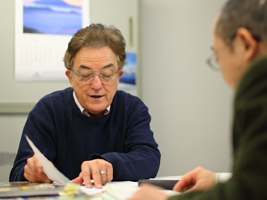 ある企業が社員にディベートのやり方について学ばせるためのレッスンを行っています。ディベートとは、あなたが意見を述べ、他の方も意見を述べ、最終的にある結論に至るとういものです。ディベートでは、あなたが意見を述べた後、必ずそれをサポートする具体的な事例が必要になります。家を立てるのに似ています。先ず屋根から始めて、それを支えるための柱と土台を作ります。よい柱と基礎が作れれば、あなたの意見の前提をうまくサポートできているということになります。
ある企業が社員にディベートのやり方について学ばせるためのレッスンを行っています。ディベートとは、あなたが意見を述べ、他の方も意見を述べ、最終的にある結論に至るとういものです。ディベートでは、あなたが意見を述べた後、必ずそれをサポートする具体的な事例が必要になります。家を立てるのに似ています。先ず屋根から始めて、それを支えるための柱と土台を作ります。よい柱と基礎が作れれば、あなたの意見の前提をうまくサポートできているということになります。
Some companies want their employees to learn how to debate as part of improving their negotiating skills. When you are debating, you start by giving the other person your opinion, and the other person gives you their response. Then the situation is reversed. Eventually,both will come to some kind conclusion. In a debate an opinion always has to be accompanied by supporting statements followed by examples. In a way it is similar to building a house. In order to win in the debate, you have to build a structure that is solid, starting with the roof, then onstruct the pillars, and finally the foundation to support both the roof and the pillars.
BBCNewsリーダーの英語を学んだ理由~リチャード先生(四国) ETCマンツーマン英会話
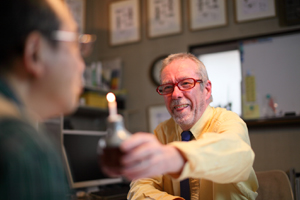
<<休止・帰国された先生のページです>>
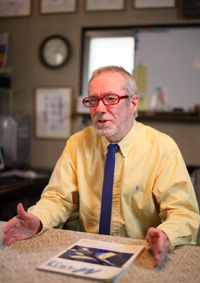
(*)四国へ引っ越しされました。スカイプでのレッスンが可能です。詳細は事務局へお問い合わせ下さい。
Q: お生まれはどちらですか
ロンドンから北へ約50キロにあるニュータウンで生まれました。多摩ニュータウンのようなところです。大戦後、ロンドンは空爆によりダメージを被ったため、多くの人々がロンドンから出て、郊外に新しい町をつくったのです。
I am from just about the 50 km north of London. And it’s a new town like Tama new town. After the war because of the damage to London, so many people had to move out of there and then they built a new town.
私のクラスメイトのほとんどは皆田舎の子供でした。しかし戦後ニュータウンウが建設され、ロンドンの下町イーストエンドからたくさんの若者たちが移住して来ました。そして高校で一緒になったのです。彼らはの喋り方はとても早くロンドン・イーストエンドのアクセントで話すので、私たち田舎の子供たちはそのカルチャーの違いに戸惑いました。
Most of my classmate, we were all countryside children not city boys. And after the war when they built a new town, many young people were coming from the east end of London, It’s Shitamachi part of London, to live in the new town. And they started to mix in the high schools. Because all of us like Inaka boys and suddenly you had all these city boys from London, who were speaking really fast and using their London, East End accent. So their culture is quite different for us.
Q 都会の子供たちはコックニーを話していたのですか?
コックニーとは少し違いますが似ています。ロンドンのバックスラングです。しかし、それは良い経験でした。私自身の世界を広げてくれたのです。ただの小さな田舎町に住んでいた頃の私の世界はとても狭いものでした。
A little bit different from Cockney but similar, London back slang. But it was good. it expanded my own world. Because when I was living in a very small country town basically, that was very narrow world.
Q 高校卒業後に芸術大学に進学したのですか?
いいえ。16歳で卒業し航空機製造会社でインターシップとして5年間働きました。5年終了した時点で、工場での仕事に全く興味が持てずに、その一方芸術にとても興味があったため、1年間浪人をして芸術家になるために芸術大学を受験しました。大学に入学したのは22歳の時です。
No, it didn’t work out like that. My education was very mixed up. I left school when I was 16 years old, than I went to work for an aircraft company. I did this 5 years preintership with them. But I was really not so interested to work in the factory. So I wanted to get out of the factory and I was really interested in doing art. So I took one year out. And then I did like one year Ronin and studied to get the entrance examination for art school for an professional artist. So I went back to college when I was 21 years old.
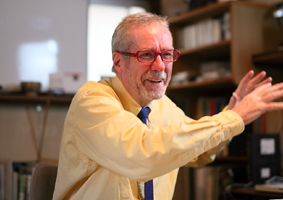
クラスメイトはみな裕福な人々でした。皇室の家族、総理大臣の娘たち、ダンヒル家の人々。お坊ちゃんにお嬢様。皆上流階級の人々でした。
私の家族は皆地元の方言を話していました。12歳の時、BBCのニュースリーダーの話し方をそっくりまねることを私は決意します。当時英国では自分の話し方が自分の処遇に影響することを知っていたからです。私は良い学校に行くことは出来ませんでしたが、訛りのないもっと綺麗な話し方を学ぶことができれば、自分にとってよりよい状況になると、この時すでに考えていました。芸術大学に行く頃には、私の話し方に強い訛は全く無くなっていて、上流階級の人々の中に入っても問題なく溶け込むことができました。
At art school all my classmates were really rich people, they were royal family people, prim minister daughters, Dunghill families, they are all Bochan, kind of Ojousama. They are very all high class people.
One of the things about my family was that they all used local Hogen. And when I was about 12 years old, I decided to copy the BBC news reader way of speaking. Because I knew at that time, in England a way you speak influences to a way people treat you. And so I didn’t go to a good school, but already I was thinking about if I could learn to speak more clearly without any kind of accent, that it would be better for me. So by the time I went to art school, my accent was OK to meet to mixing with all those high class people. Because I didn’t have any strong accent.
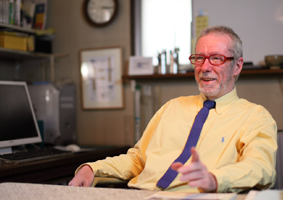 芸術大学卒業後、どうすべきか悩んでいました。私は画家と彫刻家としての教育を受けましたが、今後の進路はとても厳しいものだと思っていました。裕福な子供であれば芸術家として創作活動を続けらるよう家族が支援してくれるのかもしれませんが、私はそうではありませんでした。そこで私は、VSO (Voluntary Service Overseas)というボランティア団体に就職することを決めました。厳しい面接でしたが合格することができ、三年間パプアニューギニアに行くことになりました。焼き物、ゴムの加工、手芸や織り物などの小規模な産業の育成に従事していました。26歳の時には、40名のスタッフと多くの作業場を抱えるリサーチセンターのディレクターに昇進しました。あの3年間は本当に冒険のような毎日でした。
芸術大学卒業後、どうすべきか悩んでいました。私は画家と彫刻家としての教育を受けましたが、今後の進路はとても厳しいものだと思っていました。裕福な子供であれば芸術家として創作活動を続けらるよう家族が支援してくれるのかもしれませんが、私はそうではありませんでした。そこで私は、VSO (Voluntary Service Overseas)というボランティア団体に就職することを決めました。厳しい面接でしたが合格することができ、三年間パプアニューギニアに行くことになりました。焼き物、ゴムの加工、手芸や織り物などの小規模な産業の育成に従事していました。26歳の時には、40名のスタッフと多くの作業場を抱えるリサーチセンターのディレクターに昇進しました。あの3年間は本当に冒険のような毎日でした。
After I finished the art school, I didn’t know what to do, because I trained as a painter and a sculptor. And I thought it’s going to be difficult, because I am not a rich boy. The rich kids could go on and work as an artist and their family would support them. So I decided to apply for a volunteer agency called VSO (Voluntary Service Overseas). And It was also quite difficult interview. But I got accepted as a volunteer. And I went off to Papua New Guinea for 3 years.So I was working on pottery development and I did other small industries like rubber processing and handcraft and weaving. When I was only 26 years old, I became the director of research centre. We had 40 staffs and a lot of workshops and things. So that was really 3 years adventure life.
その後、オーストラリアで一年間、芸術の先生として働いていました。でも、パプアニューギニア、そしてオーストラリアの後に英国に戻ったとき、非常に閉塞感を感じました。西部の辺境地のようなパプアニューギニアで冒険の日々を送っていたからです。英国に戻ったとき、「ここで高校の教師には戻れない」と思いました。
After that I went to Australia to work as an art teacher for one year. But, when I went back to the UK, after Papua New Guinea and Australia, it felt very tight feeling, because in New Guinea it was like wild west place and so many adventures everyday. So when I went back to the UK, I thought “Oh I couldn’t really go back to teaching high school in the UK”.
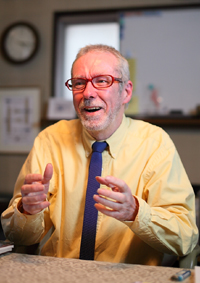 芸術大学での最後の年、私は日本の芸術、音楽にとても興味を持っていました。囲碁やマージャンの遊び方も学びました。私の作品の日本のインテリアに基づいたものが多くありました。鳥居の形も好きでした。これらのイメージを私は彫刻の中にも取り入れました。本当に日本に行きたいと思っていました。
芸術大学での最後の年、私は日本の芸術、音楽にとても興味を持っていました。囲碁やマージャンの遊び方も学びました。私の作品の日本のインテリアに基づいたものが多くありました。鳥居の形も好きでした。これらのイメージを私は彫刻の中にも取り入れました。本当に日本に行きたいと思っていました。
But thing is when I finished art school or my last year, I was very interested in Japanese art, music. I learnt to play Igo and Mahjong. And my artwork was based on a lot of Japanese interior. I liked Torii gate things. I was using these images for my sculpture. And at that time I actually really wanted to come to Japan.
幸運でした。渋谷の英語学校がロンドンの新聞に求人広告を出したのです。面接に合格し1981年私は来日しました。この学校は外務省でも授業を行っていました。一年後、私はそこで教えました。世界中の大使館に勤務することになる日本の政府高官に対する英語集中講座です。外務省だけではありませでした。文部省、大蔵省、防衛庁、SPの方もいらっしゃいました。そこで3年教えました。その後、フリーランスの英語講師となり自宅や企業で教えました。
I was very lucky. English school in Shibuya, they advertised in London newspaper, and I got an interview, everything went OK. And I came to Tokyo 1981. And that school was also teaching at Gaimusho. After one year, I worked there. That was a intensive English classes for Japanese government officials who were going to work in embassies all around the world. It wasn’t just only Gaimusho, there was Monbusho, Okurasho, Boueichou and secret police. So I did that for about 3 years. After that I started freelance teaching at home, teaching at company class.
Q しばらく英語のレッスンをお休みされていた時期がありましたね。
1993年頃、マッキントッシュのパソコンを購入しました。当時私は芸術活動を再開したいと思っていました。私が40歳の時です。コンピュータは近い将来非常に重要になることを知っていましたので、この新しい技術を学ぶこと有益であると思ったのです。そして、このような飛行機の絵画作品の制作を始めるようになったのです。
About 1993, I got my first Macintosh computer. And at that time, I wanted to go back to the art. I was 40 years. I thought this is good chance for me to learn new some technology because I knew the computers were going to be very important in the near future. And then I got into doing the artwork of these kind of drawings for airplanes.
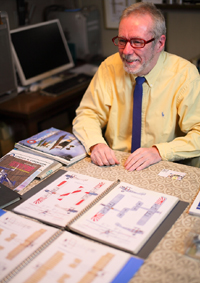 私の作品のいくつかは竹橋の毎日新聞のアートギャラリーに展示されています。2009年には東京大学の仕事もしました。私が描いたグライダーの絵画を利用して同大学の学生が模型を制作したのです。彼らのシンポジュームでも使用されました。現在、同大学内に常設展示がありますが、そこに私の作品も展示されています。
私の作品のいくつかは竹橋の毎日新聞のアートギャラリーに展示されています。2009年には東京大学の仕事もしました。私が描いたグライダーの絵画を利用して同大学の学生が模型を制作したのです。彼らのシンポジュームでも使用されました。現在、同大学内に常設展示がありますが、そこに私の作品も展示されています。
I had some of my artworks exhibited at the Mainich Shinbun’s art gallery at Takebashi. I did on some work for Tokyo University at 2009. I did this drawing of a glider and Tokyo University used it to make Mokei and that was used for their symposium. So now there is a permanent display in Tokyo University and some of my artworks are in that display.
Q レッスンはどのように進めていますか
私の教え方のスタイルは、先生と生徒が同等であること。日本の先生と生徒のような関係は好きではありません。生徒さんにリラックスして欲しい。ですから、生徒さんにプレッシャーをかけるとはありません。
My teaching style is I always like to keep the equal. I don’t like the Japanese Sensei and the student way. I like to make them feel relaxed. So I don’t put any pressure on the students.
英語学習において日本人に大切なことが2つあると思います。ひとつは発音です。ここでは先ず最初に発音のレッスンを行います。日本語の音声は喉で作られます。しかし英語の音声はお腹から送られてくる空気圧で作られます。「a e i o u」のような母音もそうです。喉は全く使いません。この空気圧を使いあとは口の形を変えるだけです。この空気圧はRとLの発音でもとても大切です。Lの発音では、空気圧が上下している舌にぶつかりますので、とてもソフトな音になります。しかし、Rは舌が寝たままの状態で動きませんので、とても力強い音になります。Thも同じですね。通常私はこれをろうそくを使って教えています。
 I think there are 2 points for Japanese. One is pronunciation part. So I always teach here phonetics before I start. One of the biggest things for Japanese people is that the sound of Japanese language is made in throat. But for English, it’s made from the air comes up from the stomach. And so vowel sounds like a e i o u are coming from the stomach. The throat doesn’t do anything. All you are doing is just changing the shape of your mouth and using the air pressure. Air pressure is very important for R and L. With the L sound, your tongue goes up and down. The air is hitting the tongue. So L is very soft sound. But with R, as the tongue stays down, so R is very powerful. Th is the same. What I normally do is I just use a candle.
I think there are 2 points for Japanese. One is pronunciation part. So I always teach here phonetics before I start. One of the biggest things for Japanese people is that the sound of Japanese language is made in throat. But for English, it’s made from the air comes up from the stomach. And so vowel sounds like a e i o u are coming from the stomach. The throat doesn’t do anything. All you are doing is just changing the shape of your mouth and using the air pressure. Air pressure is very important for R and L. With the L sound, your tongue goes up and down. The air is hitting the tongue. So L is very soft sound. But with R, as the tongue stays down, so R is very powerful. Th is the same. What I normally do is I just use a candle.
もうひとつは、英語のリズムです。英語にはリズムとスピードがあります。同じスピードで話されることはありません。日本語は「タ・カ・ダ・ノ・バ・バ」の様に速度は一定ですね。もちろん「ウッソー?」、「ホントー?」のような発音もありますが、非常に限られています。一方英語は、「wow, tooooo hot today」のようにtooの部分を伸ばして発音をしたりします。 優しくWhat are you doing?と言うのと、whatの部分を強く発音して、 [What] are you doing? と言うのとでは、意味が変わって来ます。このようなレッスンをまず最初のレッスンで行います。
And the other part is the rhythm of English. English has a rhythm and speed. It doesn’t go at the same speed. Japanese tense to be just like TA-KA-DA-NO-BA-BA. Of course you have like Usso, Honto before something like that. There are a few things. But the words are not really suitable stretched. But in English, “wow, tooooo hot today”. too is stretched. What are you doing. [What] are you doing? By changing the pressure, you change the meaning. That’s something I do right at the beginning.
Q 英語の正しいリズムをマスターする良い方法はありますか?
ゆっくりと話すことだと思います。日本の生徒さんは英語を早く話すことが良いと思っています。しかしそうではありません。なぜなら、早く話すとリズムを付けられないからです。リズムをつけて話すことのほうが、早く話すことよりも良いことなのです。 I think it’s speaking more slowly. Japanese students think speaking in English fast means good, but it doesn’t mean good. Because speaking fast doesn’t have rhythm. So speaking with rhythm is better than fast.
☆リチャード先生出演のRadioETC/Podcasting
▽英語はストレートな言語?
▽“Where do you live?”を使わずに情報を聞き出す質問
▽“We must play tennis sometime”の意味は
▽イギリス人とアメリカ人の話し方の違い
▽千利休とキリスト教
▽ジョン・レノンとロールスロイス
旅行英語でもビジネス英語でも~スィンヒ先生(高輪) ETCマンツーマン英会話
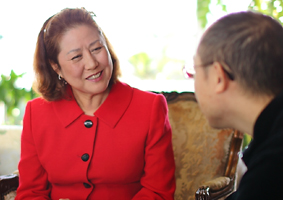
<<休止・帰国された先生のページです>>
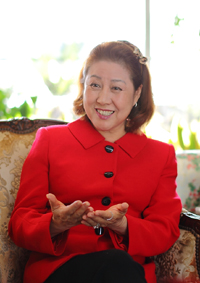
(*)2016年末に帰国予定です。
父はアメリカ人、母は韓国人です。私は韓国で生まれ、サンフランシスコで育ち、長年ハワイに住んでいました。継続してではありませんが約30年日本にも住んでいました。父が軍隊で働いていたため、家族は3、4年ごとに色々な国に引越しをしました。また、私はパンナムでフライトアテンダントをしていましたので、非常に広範囲を旅行をした経験があります。パンナムを知らない方は多いかもしれないですね。ユナイテッド航空に買収されたため、今はもう存在しません。
My father is an American and my mother is from Korea. I was born in Korea, but raised in San Francisco and lived in Hawaii for many years. And I lived in Japan also for about 30 years, but not continuously. Since my father was in a military, we were moved every 3 or 4 years to many different countries. And I have traveled extensively, because I was a flight attendant with Pan American. Many of you probably do not know Pan American, because no longer exist. It was bought by United Airlines.
私は長年英語を教えてきていますが、インターバルがあります。夫が亡くなった後、不動産事業を始めたためです。現在は、マネージャーに仕事を任せているので、私はチェックするだけですんでいます。ここは私の東京の実家です。将来、東京以外の場所に住み続けることは考えられません。すっかりここに落ち着いてしまいました。日本で暮らすことが大好きなのです。定住することになるでしょう。
I have taught English for many years, but then I have an interval, because after my husband died, I started a real estate business. But, because I have managers who are taking care of the business, all I have to do is to monitor how they are doing my business. This is still my predominant main home here in Tokyo. I can’t think of any other places to live continuously in future other than Tokyo, because I all settled here and I love living in Japan. I shall always stay here.
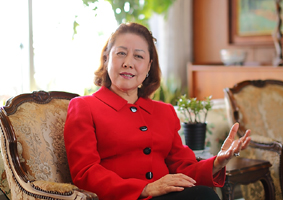 Q: ご自身の経験から、旅行英語、ビジネス英語など多面的なレッスンが可能なのですね。
Q: ご自身の経験から、旅行英語、ビジネス英語など多面的なレッスンが可能なのですね。
はい、旅行をされたい方には、旅行に必要な英語の指導ができますし、ビジネスであれば、ビジネスで使われる言語の指導することもできます。どちらであっても、生徒さんの必要に応じて、喜んでレッスンをさせていただきます。
Yes. Everybody who wants to travel, I can help them in that sense, or whether it is business, then I can help them with the language used in business. So whichever they require me to help them with, I would be very happy to do that.
Q: レッスンでは、テキストを使用しているのですか?
生徒さんがテキストを使用することを希望されるのであれば、そのように対応します。私のレッスンのスタイルは、このリビングルームに座ってコーヒーやクッキー等を召し上がっていただきながら、生徒さんの日々の生活や出来事、生徒さんが希望される話題について会話をするというものです。教室スタイルのレッスンは避けたいのです。それよりも、会話をするために、生徒さんにリラックスして欲しいのです。日本人は英語の読み書きはかなり良くできるのですが、会話が不得意であることに気づいたからです。全ての言語がそうですが、旅行をするのであれば、会話ができなければなりません。旅行中いつもテキストを持ち歩くわけにはいきません。このため、レッスンでは会話を中心に行いたいと思っていますが、それも生徒さんのご希望によって、臨機応変に対応します。
It depends on, if they want me to use a textbook. My style is that to have students sitting in the living room, I always serve them some coffee and cookies, we talk about everyday life or whatever their experiences or whatever subject they like to talk about. I don’t like to repeat the class room style. So I would rather have them command and just relax and to be able to converse. Because what I have been noticed is that Japanese can read and write quite a lot. But they have a difficult time with that conversing. And it is to all of language when you travel, you must be able to converse. You can’t carry your textbooks. So conversation is what I would like to concentrate on. However, whatever, whichever way they want me to teach them, I can adjust.
Q: フライトアテンダントになる際には、どのようなトレーニングを受けたのですか?
 最初に私が飛んだのは1969年。日本人の方が海外に行き、国際的な仕事を始めた時代です。私たちの様な日本語が話せるアメリカ人が雇用されたのは、そのためです。6ヶ月間トレーニングスクールに行き、非常にしっかりとした訓練を受けました。訓練中に最初に言われたことは、いつも微笑み、優しく、と言うことでした。乗客の多くは人生で初めて飛行機に乗る方々ですが、空の旅は恐いものです。乗客はとても神経質になるでしょう。お客様ににリラックスしていただき、快適にしていただくために、話しかけ、微笑み、優美に振舞う、と言うことを教え込まれました。
最初に私が飛んだのは1969年。日本人の方が海外に行き、国際的な仕事を始めた時代です。私たちの様な日本語が話せるアメリカ人が雇用されたのは、そのためです。6ヶ月間トレーニングスクールに行き、非常にしっかりとした訓練を受けました。訓練中に最初に言われたことは、いつも微笑み、優しく、と言うことでした。乗客の多くは人生で初めて飛行機に乗る方々ですが、空の旅は恐いものです。乗客はとても神経質になるでしょう。お客様ににリラックスしていただき、快適にしていただくために、話しかけ、微笑み、優美に振舞う、と言うことを教え込まれました。
When I first flew, it was back in 1969. That is when Japanese people started travelling and doing business globally. That is why they hired us, who spoke Japanese. We had gone to the training school for like 6 months and were very well trained. During training, the first thing they tell us is that we always smile and be kind. Because they said, a lot of our passengers are travelling for the first time in their life and travelling in the air is scary. People will get very nervous. So we were taught to make them relax and always make them feel comfortable and talk to them and just smile all the time and be graceful.
Q: アメリカ英語は、子音を省略する傾向があるため、例えば”can”と” can’t” など、聞き分けが難しいことがあります。
私自身は非常にはっきりと発音するように努めていますが、多くのアメリカ人はそのような傾向があります。特に南部、またはハワイ出身の方がそうです。私の父がカリフォルニア出身だったため、私の英語はまさにカリフォルニア英語です。同時に、父が士官学校に行っていた際、教官によって読み書き会話に関しては非常に厳しい教育を受けました。そのため父は自宅でも、いつもとても優雅で上品な英語を話していました。そのため、私たち家族もそのような英語が話せるようになりました。
I try to pronounce it very clearly, but a lot of Americans so, especially they are from south, or even from like Hawaii. My English is very Californian because my father was from California. At the same time, when my father went to military school, military authors trained him, “you have to speak very clearly. you have to read well, you have to write well”. So he has always spoken very elegantly even at home. So We were able to.
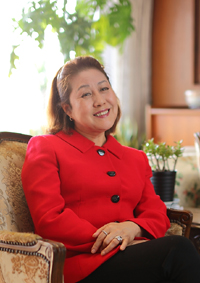 私がハワイに住んでいた時、人々はすぐに私にこう言いました。「あなたはハワイ出身ではありませんね。カリフォルニア辺りでしょう。あなたの英語はハウリー(Haole)英語ですから」。白人英語という意味です。ハワイの人々は、少々異なったアクセントの英語を話しています。例えば“all those flowers are pretty”を、ハワイの人々は“pretty-yah”のように、語尾にヤーという音を加えたりします。イントネーションも若干異なっています。地元の言葉を英語に混ぜて使っているのです。このような英語を話す人をカマアイーナ(kama’aina = ハワイの地元の人)と呼んでいます。
私がハワイに住んでいた時、人々はすぐに私にこう言いました。「あなたはハワイ出身ではありませんね。カリフォルニア辺りでしょう。あなたの英語はハウリー(Haole)英語ですから」。白人英語という意味です。ハワイの人々は、少々異なったアクセントの英語を話しています。例えば“all those flowers are pretty”を、ハワイの人々は“pretty-yah”のように、語尾にヤーという音を加えたりします。イントネーションも若干異なっています。地元の言葉を英語に混ぜて使っているのです。このような英語を話す人をカマアイーナ(kama’aina = ハワイの地元の人)と呼んでいます。
When I lived in Hawaii, the people immediately say you are not from Hawaii, you are from California or somewhere else. They say “your English is Haole English”, meaning Caucasion English. The people from Hawaii has their speaking English with a little different kind of accents. For example, we say “all those flowers are pretty”, but they will say “pretty-yah”. They always add “yah”, something like that. Their intonation is a little different too. They mix with their local languages. They call it kama’aina. Kama’aina means local.
▽スィンヒ先生の英語を音声で
英会話プライベートレッスンでよく使われる英語表現を、スィンヒ先生が読んでいます。
英語の発音は動物の鳴き声をまねて ナオミ先生(荻窪) ETCマンツーマン英会話
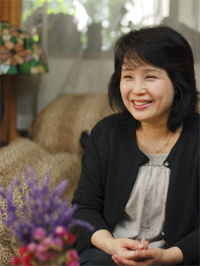
 ナオミ先生は、お父様はアメリカ人、お母様は日本人。荻窪の生まれです。ナオミ(Naomi)と聞くと、日本人の名前のようですが、実は旧約聖書のルツ記に登場するルツ(Ruth)の義理の母、Naomiから取った名前。ルツはダビデの曾祖母にあたります。ヘブライ語で「喜び」、「楽しみ」、「満足」の意味。発音は「ネィオーミ」のように読むそうです。お父様の仕事の関係で、ナオミ先生は小学校から高校まで、東京の米軍基地内にあるアメリカン・スクールに通いました。
ナオミ先生は、お父様はアメリカ人、お母様は日本人。荻窪の生まれです。ナオミ(Naomi)と聞くと、日本人の名前のようですが、実は旧約聖書のルツ記に登場するルツ(Ruth)の義理の母、Naomiから取った名前。ルツはダビデの曾祖母にあたります。ヘブライ語で「喜び」、「楽しみ」、「満足」の意味。発音は「ネィオーミ」のように読むそうです。お父様の仕事の関係で、ナオミ先生は小学校から高校まで、東京の米軍基地内にあるアメリカン・スクールに通いました。
Q: 日本人は長い時間をかけて学校で英語を学んでいても、実際に外国に行くと、現地の人たちが話している英語が理解できずに、ショックを受けることがよくあります。もっと実践的な英語を学ぶために、先生から何かアドバイスはありませんか?
そうですね。まず、日本の英語教育が間違っていると言えるのかもしれません。最近、先生が会話を教えていますので、改善されてきているとは思いますが。私が子どもの頃に、『ニューホライズン』という日本人向けの英語の教科書を手にしたことがあります。学校の友達と、その本を一緒に見たのです。友達は私と同じように日本語を話すアメリカ人ですが、その教科書を見て皆笑ったのです。教科書には「R」の発音方法として、こんな図と説明が記載されていました。「舌で歯茎の上の部分に触れる。」友達は皆言いました。「わあ、これ間違ってる。」日本人が「R」を発音できない理由がここにあります。
Well, first of all, I think that the Japanese education for studying English may be wrong. I would say. Now it’s getting better. Teachers are teaching kids how to do conversation. Maybe it’s not so bad these days. But When I was young, I remember that one time I got a book that the name was NEW HORIZON. And then I look at it at school. So of course my friends are people like me. They speak Japanese like me. And we were looking in the book and then we all laughed. There was a picture of how to pronounce “R” sound. And then the picture, it said “put your tongue and touch the upper of your gum”. That’s wrong. All of us said, “Oh, this is wrong.” That’s why Japanese people cannot pronounce the “R” sound.
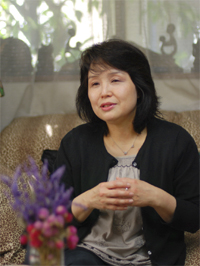 Q: 日本人が使っていた教科書自体が間違っていたんですね?
Q: 日本人が使っていた教科書自体が間違っていたんですね?
そうです。その本の一ページ目には、こんな表現もありました。「This is a pen.」私たちがペンを手にとって、「これはペンです」と言う機会があるでしょうか。まず無いですよね。日本の英語教育、特に発音方の教え方が間違っています。
Yes. And then like the first page, “This is a pen”. Would we say, “this is a pen”? これは鉛筆です。 We’ve never say that, right? We said all the Japanese education is wrong, especially their pronunciation is wrong.
Q: では、「R」の正しい発音方法を教えていただけますか?
これは私の長い英語教育の経験から生れた独自の方法です。「R」の発音はとても難しいのですが、こんな風に教えています。まず口をあけて、私の舌を見てもらいます。これは今でもちょっと恥ずかしいのですが、生徒さんにとってはより分かりやすいと思います。舌が歯茎の上部に触れていないことが分かります。触れている場合は「L」の音になります。「Light」の様に。しかし「R」の場合は、舌は後ろの方に引かれていて、決して上には触れていません。舌は口内の中間に位置して、少し力が入っている状態です。
The first thing, this is my original way of teaching. I’ve teaching such a long time. And “R” is very difficult for one thing. So what I do is sometimes I say, “look at my mouth and look at my tongue!” So I open my mouth. I am still little embarrassing. But it’s better for students to understand. And if students still can’t understand, I tell them, one thing as I told you before, never put your tongue up. OK? If you put it on upper gum, it will be “L” sound. Yes. For example, “light”. But “R” sound I know that your tongue goes in the back. It never ever goes up. It stays in the middle of your mouth. But you put a little strength in it. And then put it in the back is the “R” sound.
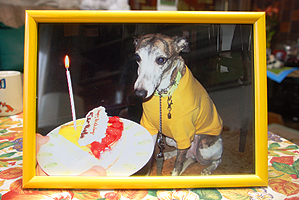 もう一つ良い方法をご紹介します。私は動物好きなので、こんな方法を思いついたのかもしれません。ある日、我が家の犬を見ていて気づきました。彼女の唸り声の「ウゥー」という音が、「R」の音なのです。そこで、生徒さんにはこんな説明しています。「いいですか、決して外でやってはいけませんよ。室内のみで行ってください。変人だと思われしまいますので。ちょっと想像してみてください。あなたが、犬の大切な食事を取り上げてしまったとしたら、その犬は怒って唸り声を上げますよね。その時の唸り声を真似してみてください。」こう言うと、ほとんどの方ができるのです。
もう一つ良い方法をご紹介します。私は動物好きなので、こんな方法を思いついたのかもしれません。ある日、我が家の犬を見ていて気づきました。彼女の唸り声の「ウゥー」という音が、「R」の音なのです。そこで、生徒さんにはこんな説明しています。「いいですか、決して外でやってはいけませんよ。室内のみで行ってください。変人だと思われしまいますので。ちょっと想像してみてください。あなたが、犬の大切な食事を取り上げてしまったとしたら、その犬は怒って唸り声を上げますよね。その時の唸り声を真似してみてください。」こう言うと、ほとんどの方ができるのです。
And then I was thinking a good way. And a good way I think is, since I like animals. I do this probably. But I was looking at my dog one day. She was growling. “ur…..” That is the “R” sound. So I told my students, “OK. Never do it outside, only indoors please! Because people will think you are strange. But remember just imagine that you took a born or something away, a food. And the dog is growling. OK. How can you pretend or can you imitate a growling dog”. Most people can do it.
そして、こう言います。「今、舌はどこにありますか?」「あっ、口内のちょうど真ん中」「下は上の歯茎に触れていますか?」「いいえ」「これが「R」の発音です。」ほとんどの方がこの方法で理解します。「Right」と発音したいのに、「Light」のようになってしまう生徒さんには、「”怒った犬”を思い出して」と言うと、できるようになるのです。かなり滑稽な方法ですが、実に効果的です。一番良い教え方ですね。
OK. And I said, “Where is your tongue?” And they said, “oh, it was in the middle”. “Did it go up?” They said “no”. And then I said, “that is it.”. And then most people learn by that. And one day they said the “L” sound like they wanna say “Right”. 右 Right. But they say “light”. I said, “remember the angry dog!” And then go “urr….., right” That’s how they learn. Most of my students learn that way. It’s very funny way, I know. But it’s really effective. It’s the best way.
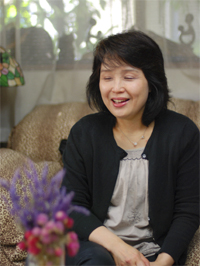 もう一つは、「L」の発音。特にアメリカン人で、「L」が単語の最後に来る場合です。「Lion」の様に、単語の最初に「L」が来る場合は簡単です。しかし、例えば「Special」のように「L」が最後に来る場合、日本人は「スペシャルゥ」というように発音しがちです。「L」の音の後に、母音のウの音を発音してしまうのです。 Another pronunciation is “L”, I think. Especially for American, when the “L” comes at the end like, at beginning I told you like “lion” is easy. But and for example like “special”, “L” is the very end. And Japanese used to say “specialu”. I can hear the “U” after. I can hear the母音.ウウ.
もう一つは、「L」の発音。特にアメリカン人で、「L」が単語の最後に来る場合です。「Lion」の様に、単語の最初に「L」が来る場合は簡単です。しかし、例えば「Special」のように「L」が最後に来る場合、日本人は「スペシャルゥ」というように発音しがちです。「L」の音の後に、母音のウの音を発音してしまうのです。 Another pronunciation is “L”, I think. Especially for American, when the “L” comes at the end like, at beginning I told you like “lion” is easy. But and for example like “special”, “L” is the very end. And Japanese used to say “specialu”. I can hear the “U” after. I can hear the母音.ウウ.
たぶん、これはアメリカ人の場合だと思うですが、「L」を発音しません。
Maybe this is for American, but we really don’t pronounce it. And all we do is we open our throat.
のどを開けるんですね。So スペシャルゥではなくて、ちょっと下向いて”Special”. Just open! My tongue does not go anywhere. All we do is open. Just like a crow. カラスの鳴き声、カアカアみたいな感じ。”Special”, not “スペシャルゥ”. “ローカルゥ”.No, “Local”.
多くの日本人は、「R」の発音はとても難しいと考えていると思います。「R」ほどではありませんが、「L」も難しい発音の一つです。
I guess that the most Japanese think that “R” is very difficult. But “L” is also another difficult one too, not as difficult as “R”.
☆ナオミ先生ご出演のRadioETC
■アメリカ英語発音法
▽ジャパニーズ・イングリッシュから脱出
▽“th”の発音の仕方~アメリカ英語発音法
▽“t”は、詰まる”ッ”の音で~アメリカ英語発音法
▽“t”は、かすれる音で~アメリカ英語発音法
▽“can”と”can’t”の聞き分け方~アメリカ英語発音法
▽“lemon”は”冷麺”と発音?~アメリカ英語発音法
▽“television”は”テレビ人”と発音?~アメリカ英語発音法
■ディクテーション講座
▽David Lynchのインタビュープロジェクトでディクテーション~ETCマンツーマン英会話ナオミ先生のディクテーション講座01
▽言っているつもりの音~ETCマンツーマン英会話ナオミ先生のディクテーション講座02
▽結合して変化する音~ETCマンツーマン英会話ナオミ先生のディクテーション講座03
▽ネイティブも文法を間違う~ETCマンツーマン英会話ナオミ先生のディクテーション講座04
▽イディオムを知っていれば聞き取れる音~ETCマンツーマン英会話ナオミ先生のディクテーション講座05
▽省略され結合するth~ETCマンツーマン英会話ナオミ先生のディクテーション講座06
▽聞き取れないI~ETCマンツーマン英会話ナオミ先生のディクテーション講座07
▽I’m gonna の意味は~ETCマンツーマン英会話ナオミ先生のディクテーション講座08
■英語に訳せそうで訳せない日本語講座
▽「風通しの良い会社」は英語で – 英訳できそうでできない日本語
▽「きっかけ」は英語で? – 英訳できそうでできない日本語
▽「壁にぶつかる」は英語で? – 英訳できそうでできない日本語
▽「反省する」は英語で? – 英訳できそうでできない日本語
▽「軌道にのる」は英語で? – 英訳できそうでできない日本語
▽「開き直る」は英語で? – 英訳できそうでできない日本語
▽「大切にする」は英語で? – 英訳できそうでできない日本語
▽「筋を通す」は英語で? – 英訳できそうでできない日本語
▽「彼は非常に部下に厳しかった」は英語で?
▽「彼は娘に甘い」は英語で
▽「野党がだらしないからいけない」は英語で
▽「中途半端な気持ちならやめたほうがいい」は英語で
▽「せっかくのお誘いですが遠慮します」は英語で
▽「その考え方はおかしい」は英語で
▽「話す前に、考えをまとめる必要がある」は英語で
▽「細かいことにこだわるな」は英語で
▽「ゆとりある生活を送りたい」は英語で
米国コメディでリスニング英語上達~アメリタ先生(横田基地) ETCマンツーマン英会話
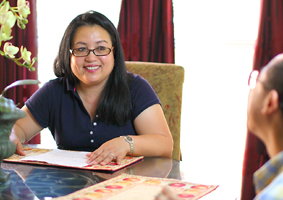
<<休止・帰国された先生のページです>>
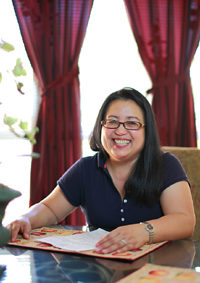
Q お生まれはどちらですか?
フィリピンで生まれ、大学卒業後、米国に移住しました。ニュージャージで20年強暮らした後、フィリピンに帰り、また、サウスカロライナに戻り、仕事の関係でインディアナポリスに越し7年弱暮らしました。
I was born in the Philippines and migrated to the United States after I graduated from college. I lived in New Jersey for over 20 years; thereafter, lived in the Philippines, South Carolina, and Indiana within a span of 7 years because of job relocation.
Q 英語はどこで学ばれたのですか?
保育園から大学まで英語で話すことが義務付けられていました。また、スペイン語も8年間学びました。
We were mandatorily required to speak English from preschool to college, as well as learn how to read, write, and speak Spanish for 8 years.
Q 英語とフィリピンの言語は似ているのでしょうか?
フィリピンの言語はスペイン語に似ています。330年間、フィリピンはスペインの支配下にありましたので。通りの名前の多くや、私の名前”Amelita”もスペイン語です。例えば、机はフィリピンの言葉では”lamesa”、スペイン語でも”la mesa”と言います。また、靴は”sapatos”、スペイン語では”zapatos”。多くの部分が共通しています。
The Filipino language is similar to the Spanish language. The reason was because The Philippines was under the Spanish rule for 330 years. Most of the street names, even my name is in Spanish, “Amelita”. An example would be a the word “table”, in Filipino, we call the table “lamesa”; in Spanish, the table is “la mesa.”. The shoes in Filipino is called sapatos, and in Spanish, it is called zapatos. So, basically they are very similar.
Q 日本に滞在されている目的は何ですか?
仕事のため、現在東京の福生市に住んでいます。インディアナポリスから再配属という形をとっていますので、現在もアメリカで雇用されていることになます。米国公務員の給与支払い部門の日本連絡事務所で働いています。日本、韓国、グアムに駐在する公務員向けの支払い関係は全て私一人で行っています。この仕事は非常に楽しく、幸せに思っています。
We are currently residing in Fussa City, Tokyo, Japan because of my work. I was reassigned here from Indianapolis, Indiana and remained l under the United States of America. I am a Civilian Pay Liaison in Japan, representing Indianapolis, Indiana. I respond to all payroll issues of civilian government employees currently stationed in Korea, Japan and Guam. I truly enjoy and very happy with this job.
 Q 先生自身が頭の中で考えるときは何語を使っているのですか?
Q 先生自身が頭の中で考えるときは何語を使っているのですか?
考える時はいつも英語です。フィリピンの言葉は、私でも分からない言葉がたくさんあります ので、全て英語にしてしまったほうがずっと簡単なのです。
I always think in English, because most Filipino words I find it hard to understand. It is much easier for me to have everything in English rather than the Filipino language.
家ではタガログ語(フィリピン語の方言)を毎日話しています。母、兄弟、家族と話す時も。でも、一歩家を出たら英語です。仕事は英語、お客様とも英語、基本的に全て英語です。家の外では、英語の方がずっと楽なのです。仕事中にある人と英語で電話をしている時に、さらにフィリピン語で電話が架かってきたりすると、混乱してしまうことよくがあります。
Every day, we speak Tagalog (Filipino dialect) here at home. I speak Tagalog when talking to my mother, brothers and family. But, when I go out from my home, I speak in English. I speak English at work; I speak English to our customers. Basically, everything is in English. I am more comfortable speaking in English. Sometimes when I am at work, I will speak to one person in English over the phone and also speak to another person on a different phone line in Filipino. It is very confusing most of the time.
Q 生徒さんが英語の スピーキングやリスニング能力を高めるために良いアドバイスはありますか
練習のために、毎日誰かと英語を話すことだと思います。週に一回のレッスンに加え、映画を一本最後まで英文字幕で観るようにするのも効果的です。日本語字幕は、実際の役者の台詞と訳がことなる場合があります。英文字幕を見ながら映画を観ることは、リスニングだけでなく正しい英文スペルを学ぶ練習にもなります。もう一つは、アメリカのコメディテレビドラマを見るのもよい勉強になります。コメディでは、役者の話す速度がとても早いので、リスニングの練習になるのと、イディオムの勉強にもなります。
I think students should practice speaking English with someone every day. In addition to the one hour English lesson once a week, students should try to watch a full length English movie with subtitle in English as well. When the subtitle is in Japanese, the translation maybe different than what the actor is trying to say. The words use in the movie should actually show in the subtitle. It is good ways to practice listening to the words at the same time learn the correct spelling. Another practice is to watch American comedy TV shows. Actors in a comedy speaks very fast and also a good way to learn idiomatic expressions. 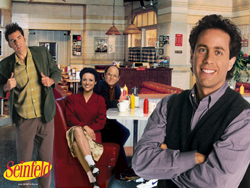
Q 米国のコメディで何かお奨めの番組はありますか
私は『トゥー・アンド・ア・ハーフ・メン』(邦題:チャーリー・シーンのハーパー★ボーイズ)が好きです。チャーリー・シーンは、今後他の俳優に変更されるようですが、とても面白い番組です。兄と弟、そしてその息子が一緒に生活をするというストーリーです。
I like “Two and a Half Men”. That is Charlie Sheen. I think he is going to be replaced by another actor. This show is very funny. The story is about the uncle, the brother and his son, all living together in one house.
しばしば、とてもまじめな顔で何気なく冗談を言うので、楽しむためには、彼らが何について話しているのかしっかりと聞いていなければなりません。ライブのテレビ番組ですので、観客の笑い声が聞こえてきます。「どうして、お客さんが笑っているの?意味が分からない」と思うことがあるかもしれません。これは、会話の聞き取りを学ぶ方法の一つです。
Sometimes you may find the comedy show humor maybe dry and have to listen carefully on what they are trying to say in order to laugh. Because it is a live TV show, you will hear people laughing in the background. You may ask, “Why are they laughing? Did I miss anything? That is one way of learning how to listen to people speaking.
Q 海外のドラマは、その冗談が何故おかしいのか理解するのが難しい場合がありますね。
インサイド・ジョークの場合があるからです。
Because sometimes jokes in the States are considered “inside joke”.
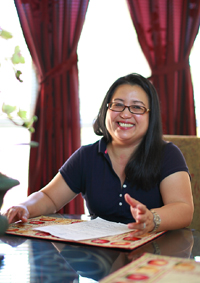 Q インサイドジョークとは何ですか?
Q インサイドジョークとは何ですか?
インサイドジョークとは、米国内だけで意味が分かるようなジョーク、特定のグループ内の人々だけがわかっていて、他の人には理解できなような冗談のことを言います。誰のことを、何について話しているのかを知らなければ、そのジョークが何故可笑しいのか理解することができません。
An inside joke usually happens in the States. Only certain people usually know the joke that is being delivered on stage. Not everyone knows it. You have to know who or what they are talking about in order to laugh at the joke.
『サインフェルド』(邦題:となりのサインフェルド)はご覧になりましたか。10年続いた番組で、アメリカのNo.1コメディ番組です。テレビでは数100のエピソードが放送されましたものがDVDとして販売されていると思うので、チェックしてみてください。
Have you seen “Seinfeld”? Seinfeld is another hit comedy show in the States. The show lasted for 10 years and has a no. 1 rating. You can check the video store if they are selling the DVD’s of the several hundred episodes they showed in TV.
日本生れ、NY育ち、父は大リーガー スティーブ先生(横浜元町) ETCマンツーマン英会話
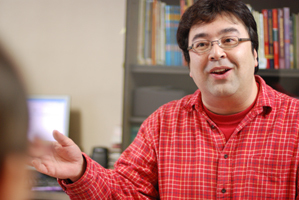
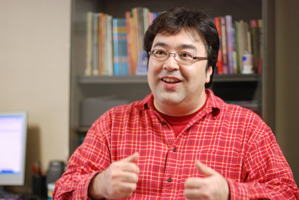 Q:先生の生れ故郷についてお話しを聞かせてください。
Q:先生の生れ故郷についてお話しを聞かせてください。
私の家族は仕事の関係で、日本とアメリカの間を何度も行ったりきたりしていました。私の父が野球選手だったことはお話しましたか?ずっと前のことですがヤンキースでプレーしていました。ジョセフ・ディマジオという選手はご存知ですか?マリリン・モンローの二人目のご主人です。50年代の初めに彼と一緒にプレイしていたことがあります。
私が生れる前の話しですが。すみません。話しが脱線してしまいました。私は日本で生まれ、横浜で育ちました。その後、まだ私が小さかった頃に、家族はニューヨークに引越しをし、私はそこで大きくなりました。小学校の時に、再び私は日本に戻りインターナショナルスクールに通いました。そして再度ニューヨークに戻りました。行ったりきたりです。その後、家族はロサンゼルスに越し、再度日本に戻ります。本当に何度も引越しをしてきていますね。
My family has moved around Japan and United States so many times because of a business. Did I tell you my father was a baseball player? Yeah, he used to play for the Yankees long time ago. Do you know a player, Joseph DiMaggio, Marilyn Monroe’s 2nd husband, he used to play with him in during the early 50s. I was not born yet that time. Sorry. Nothing to do with this. But I was born in Japan, and I was raised in Yokohama. And when I was a baby, my family moved to New York. And I grew up in New York City. And then for elementary school, I came back to Japan again and went to international school and went back New York again. So it’s back and force. And then the family moved to Los Angles and then came back to Japan. So we’ve been moving a lot.
Q:英語の先生になったきっかけは?
私が小学生の時、校長先生が「まだ英語を話すことができない1,2年生に英語を教えてみないか」と言われました。そして、放課後に英語の授業?それとも、お稽古?どちらの言葉が相応しいかわかりませんが、彼らに英語を教えることになりました。それがとても面白いと思ったのです。しばらくすると子ども達の英語力もアップしました。子ども達は私に本当に感謝してくれて、また彼らの両親も私に感謝をしてくれました。子どもの頃に人から「ありがとう」と言われるのは、とても嬉しいものですね。この経験が、私が英語の先生になる一種の動機付けになっているかもしれません。

When I was in elementary school, my school’s principle told me “would you teach some of the elementary school students in the first grade or second grade, who still didn’t have much command of English yet at that time”. So after school, I sort of taught or tutor, I don’t know which is a good word, but tutor or taught them English. And that time I found it very interesting. And children’s English abilities were improved after a while. And they really thanked to me and their parents thanked to me. And I guess other child, this was when I was junior student, so you know, small kids, when we get people say thank you, we really feel happy. So maybe that sort of motivated me to become an English teacher.
本当に様々な国籍の子ども達がいました。日本人、アジア人、ドイツ人など欧州諸国の子どもたちなど。教えること、そして小さなこともたちが少しずつ英語が上手くなってゆくのを見るのは本当に楽しかったです。私にとって本当に素晴らしい機会でした。この経験が私の記憶の中にずっと残っていたのかもしれません。
Various nationals. Some were Japanese, some were from other Asian countries, some children were from Germany, European countries. Since I really enjoyed it and seeing those small children getting better little by little, It was a really great opportunity for me. So maybe that experience was always on my mind.
Q:生徒さん用に授業をカスタマイズされていますか? その実例を教えてください。
レッスンは生徒さん毎にカスタマイズされるものだと思います。例えば、上級者の生徒さんの一人ですが、彼はオバマ大統領のスピーチを学びたいとのことでした。これは、手作りなのですが彼の就任演説です。
I guess that the customized lesson really depends on each student. For example, one of the advanced students, he wants to study about Obama’s speech. This is hand-made. This is his inauguration speech, inaugural address of Barack Obama. There are many texts, which translates English into Japanese.
彼のスピーチを日本語に訳したものをたくさんありますが、私たちが満足できるものはありませんでした。とてもいいかげんな訳なのです。大事なところを省略してしまっているんです。これらのテキストはプロの翻訳家が行ったものなのですが、時々笑ってしまうほどいいかげんなものがあります。私たちはそういうところまで、できるだけ完璧に翻訳をしてみました。もちろん、このような翻訳を授業で行うには、完成するまで何ヶ月という時間はかかりますが。
他の例では、原子力プラントの設計をされている生徒さんがいらっしゃいます。その方は物理が得意です。私の場合は、物理はどちらかというとクラスでは寝ていたほうですけど(笑)
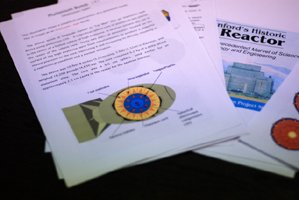
So therefore he teaches me about physics in English. I make him prepare lessons for me. And he gets information and makes a text, and he teaches me. So and he said he really enjoys teaching things in English, because he has never done that. And it is his profession, so he is very familiar with it. So he gets confident to do that.
初心者の方から上級者まで、たくさんの授業の形があると思います。その中でも一番大切なことは、その生徒さんが何に興味があるかとういことではないでしょうか。生徒さんが興味のあるものに添って授業をカスタマイズするのが一番良い方法かもしれない。ですから、先生の都合でクラスをするのではなくて、生徒さんが一番何が好きか、何に興味をもっているか、それを聞いてクラスを作るようにしています。
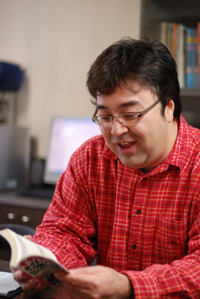 (書籍『その英語ネイティブにはこう聞こえます』を手にとって)これは興味深い本ですね。そう言えば、名古屋に行った時に「ご自由にお入りください」の英訳が書いてあったのですが、すごくおもしろい直訳、strange English でした。
(書籍『その英語ネイティブにはこう聞こえます』を手にとって)これは興味深い本ですね。そう言えば、名古屋に行った時に「ご自由にお入りください」の英訳が書いてあったのですが、すごくおもしろい直訳、strange English でした。
普通だったら
Please feel free to go in.
のように言いますね。それなのに
Please come in freely.
Freely? (笑) これはいかにも直訳ですね。
おそらく多くのネイティブスピーカがこれを読んだら、裸(Naked)で入場してもいい?、というような意味に捉えるでしょう。とても不思議な表現ですよ。面白いですけどね。
Probably for most native speakers, “please come in freely,” means maybe like “Naked?” Wow! It sounds weird, but it’s interesting.
Q:このような間違いをしないようにするにはどうしたらいいのでしょうか?
たぶん、間違いから学ぶことだと思います。人は同じ間違いをしたいとは思わないものです。そう言う私は、同じ間違いを何度も繰り返しますが。(笑)でも、トライ・アンド・エラーしながら学んでゆく。これが一番良い方法だと思います。
Maybe learn from mistakes. Maybe it’s the best way because if we make mistakes, we don’t want to make same mistake over and over again. I make same mistake over and over again myself, but maybe try and error. Maybe it’s the best way, I guess.
☆スティーブ先生出演のRadioETC
▽”ご自由にお入りください”は英語で?
https://etc-eikaiwa.com/25podcast/post_173.html
本物の英語はICレコーダーで マイク先生(新小岩) ETCマンツーマン英会話
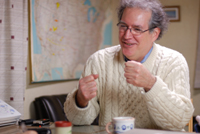
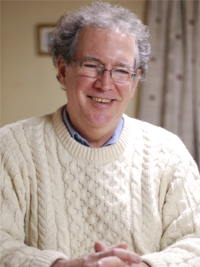 Q: お生まれはどちらですか?
Q: お生まれはどちらですか?
南カリフォルニアのオレンジ郡です。生れ故郷は、フォールトン市。有名ではありません。とても小さな町です。1958年に生まれ、南カリフォルニアで育ちました。父は私たちを毎年キャンプに連れて行ってくれました。アメリカ中、特に西部を旅しました。アリゾナ、ネバダ、コロラド、アイダホ、モンタナ、オレゴン、ワシントンなど。キャンプをして、釣りをして、ハイキングをして。父はアウトドアが大好きでしたので、私たち子どもにも好きになって欲しいと思っていたのでした。
I was born in the southern California, Orange County. And my city is not famous. My city is named Fullerton. It’s a very small city.
I grew up in the southern California and I was born in 1958. And my father took us camping every year, family trips. We’ve traveled all round the United States, especially to the west. We went to Arizona, Nevada, Colorado, Idaho, Montana, Oregon, Washington and we camped and fished and hiked. My father loved the outdoors and he wanted to us to hopefully love the outdoors too.
19、20歳の時にオレゴンに引越しをします。そこに15年間住み、その後東京に来ました。
I moved to Oregon when I was twenty or nineteen. And I’d lived here for 15 years in Oregon. And then I came to Tokyo.
Q: オレゴンでパイロットライセンスを取得されましたね。
そうです。セスナ150という一番小さなセスナです。私はブッシュ・パイロットになることを夢見ていました。ブッシュ・パイロットとは、アラスカやカナダなどの遠隔地に食料や物資を配達する仕事です。友人の一人が、私と同じパイロットで、卒業後アラスカに行き、その仕事をしていたのですが、事故でなくなってしまいました。とても衝撃的な出来事でした。
Yes. Cessna 150, the smallest Cessna. What I was hoping to do was to become a bush pilot. A bush pilot means you fly in remote areas. You deliver foods and supplies in Alaska, Canada. And that was my dream. But one of my friends, who was a pilot like me, and he graduated, and he went to Alaska, and he did that kind of work, and he crashed and he died. It was very shocking. And he was a very good pilot.
そして、「自分はどうなのだろう」と思ったのです。彼のように優秀なパイロットになりたいのならば、もっと訓練をしなければいけない。でもそれには自分は充分ではない。自分はパートタイムのパイロットで、自分の技術を磨くには、操縦時間が少なすぎたのです。業務用の免許を取得するには、時間に加え充分なお金も必要です。私はブッシュパイロットになることを諦めました。
And I thought, “if he crashed, what’s about me”. And I thought, “if I want to be a really good pilot like him, I really have to practice much more”. And I thought, “I am not good enough”. Because it takes a lot of skills, I was a part time pilot. I would fly a few times a year just to brash up my skills. And I couldn’t get a commercial license. It costs a lot of money and a lot of time to get a commercial license. So I gave up.
Q:レッスンで英語を学んでも、実際にネイティブが話す英語を聞いて理解できず、ショックを受ける生徒さんが多数いらっしゃいます。実際に話されている英語を理解するために、なにかアドバイスはありますか。
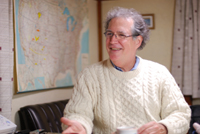 初心者の生徒さんについてでしょうか?口語英語の聞き取りに慣れる最も簡単な方法は、DVDを見ることです。俳優が話している英語を聞いた後、日本語の字幕を見る。そして分からない部分があれば、DVDを止めて、字幕を読み、巻き戻しをして、もう一度聞く。同じ映画を三回を見る必要があるでしょう。これは口語英語になれるとてもよい方法です。なぜならば、アメリカ映画の中には、あらゆる種類の人々、黒人、白人、アジア人、メキシコ人、アメリカ人、老人、若者、太った人、やせた人、たくさんの種類の声質に出逢うことができます。
初心者の生徒さんについてでしょうか?口語英語の聞き取りに慣れる最も簡単な方法は、DVDを見ることです。俳優が話している英語を聞いた後、日本語の字幕を見る。そして分からない部分があれば、DVDを止めて、字幕を読み、巻き戻しをして、もう一度聞く。同じ映画を三回を見る必要があるでしょう。これは口語英語になれるとてもよい方法です。なぜならば、アメリカ映画の中には、あらゆる種類の人々、黒人、白人、アジア人、メキシコ人、アメリカ人、老人、若者、太った人、やせた人、たくさんの種類の声質に出逢うことができます。
Are you talking about beginner students? Well, the easiest way for them to get used to hearing spoken English is to watch DVDs. And so the actor and actress are speaking English and then you have 日本語 subtitle. And then when they can’t understand something, then stop the movie and then you can read the subtitle and then playback and listen. And they should do that 3 times I think. Watch the same movie 3 times. It’s a very good way to get used to hearing spoken English. Because in American movies, you have all kind of people, black, white, Asian, Mexican and American, old, young, fat, skinny, many tones of voices.
一方、最近のアメリカの映画を見ていると、発音はほぼ同じになってきていることに気づくかもしれません。アクセントがとても平坦なのです。最近アメリカでは、俳優学校やアナウンサー学校、セールスマン講座などで、この平坦なアクセントの英語を教えているのです。私たちはこれをCNNアクセントと呼びます。アメリカでは4、5種類のアクセントが話されています。訛りではありません。ニューヨーク、ニュージャージー・アクセント、カーボーイ・アクセント、中西部アクセント、そしてカリフォルニア・アクセントなど。最近はアメリカのニュース番組、ABC、CBS、MSBN、FOXを見て、ニュースキャスターのしゃべりを目を閉じて注意して聞いていると、全員が平坦なアクセントの英語を話していることに気づくでしょう。もちろんイントネーションは上下しています。でもアクセントはほとんど同じなのです。もし英会話のサークルに参加できなかったり、英語を話す友人がいない方は、このテレビニュースを見ることも良い方法だと思います。
And nowadays if you watch American movies, the pronunciations are almost all the same. We called that CNN accent. It’s a flat English accent. Because now in America, when you go to an acting school, and if you go to a radio broadcasting school, if you go to professional sales classes, they teach the flat accent. And we call that CNN accent. We used to have 4 or 5 distinct accents, not dialects. We have the New York, New Jersey accent, the Cowboy accent, the Midwest accent and then the California accent. Nowadays if you watch American news programs, ABC, CBS, MSBN and FOX, and you listen to the newscasters, close you eyes, and just listen. And you will find that they are all speaking in a flat accent. And the intonation rises and falls. But if you listen carefully, the accents are almost same. So that’s the best way I think. If they can’t join a English circle, if they don’t have foreign friends who speak English, watch TV news.
Q:通常のレッスン以外に、お勧めの勉強方はありますか?
 私のレッスンに来る生徒さんにはICレコーダーでレッスンを録音することを勧めています。それを家に帰って、パソコンに取り込んで、CDにコピーして週に3日、一回10分だけ聞くのです。一週間は168時間、一日8時間寝るとすると、56時間を引いて残りは112時間。週40時間働くとして、その他諸々の時間を差し引いても、最終的に30時間から35時間の自由時間が一般の人にはあることになります。その中で30分勉強するのはとても簡単ですよね。
私のレッスンに来る生徒さんにはICレコーダーでレッスンを録音することを勧めています。それを家に帰って、パソコンに取り込んで、CDにコピーして週に3日、一回10分だけ聞くのです。一週間は168時間、一日8時間寝るとすると、56時間を引いて残りは112時間。週40時間働くとして、その他諸々の時間を差し引いても、最終的に30時間から35時間の自由時間が一般の人にはあることになります。その中で30分勉強するのはとても簡単ですよね。
I recommend to every student to come to my lesson with an IC recorder and put it on a table and record our lesson. I recommend when you go home and transfer the data to the PC, and make CD files, and listen to them. Or they listen to the CD 3 times in a week, for at least 10 minutes each time. And I point out this is relatively easy to do, because there are 168 hours in a week, and an average person sleeps 8 hours, so minus 56. 112 hours are remaining. You work about 40 hours – and end up, it’s about 30 or 35 hours absolutely free time for the average person. So it’s very easy you study 30 minutes.
テキストを見ながら週に30分CDを聞いて勉強したら、6ヵ月後には、あなたの耳、脳は口語英語が理解できるようになっています。単語のグループによって構成されているキーフレーズが認識できるようになっているのです。おっ、これは動詞、これは形容詞、これは複合動詞というように。また、喜び、悲しみ、怒りなど、もっと多くの事柄が、どこにストレスおかれているかということから理解できるようになるでしょう。でも、直ぐにはできませんよ。時間はかかります。魔法ではないのですから。ここに来て6ヶ月で英語が話せるようになるという意味ではありません。家に帰ってCDを聞くのです。
If they study by listening to the CD, following the text and dialogue 30 minutes a week, if they do that 6 months, and the end of the 6 months, your ears, your brain, you are gonna be turned in to spoken English. They are going to be able to recognize the key phrases of the word groups. Oh there is a verb, there is a adjective. There is a compound verb. More things like happiness, and sadness, and anger and they are going to learn more from the stress. But I tell them, you can’t do this quickly, it takes time! It’s not magic. You can’t just come here and think I am going to speak English 6 months. No. You have to go home and listen to the Audio material.
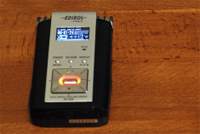 もう一つお勧めしたいことがあります。私の生徒さんの多くが仕事で、会議やセールスミーティングに参加するために、海外出張をしています。医者、歯科医、営業、その他あらゆるタイプの日本人の方に言っているのは、ICレコーダーを持って行き、アメリカで飛行機を降りたら、スイッチをいれ、すべてを録音してみてください、と言うことです。タクシードライバー、ホテルのスタッフ、レストランのシェフ、すべての会話を録音するのです。それが本物の英語です。教科書には載っていません。
もう一つお勧めしたいことがあります。私の生徒さんの多くが仕事で、会議やセールスミーティングに参加するために、海外出張をしています。医者、歯科医、営業、その他あらゆるタイプの日本人の方に言っているのは、ICレコーダーを持って行き、アメリカで飛行機を降りたら、スイッチをいれ、すべてを録音してみてください、と言うことです。タクシードライバー、ホテルのスタッフ、レストランのシェフ、すべての会話を録音するのです。それが本物の英語です。教科書には載っていません。
I want to say one more thing. I have a lot of students who had to travel overseas on business. And they have to go to conferences, and they have to go to sales meetings. All kind of people, doctors, dentists, sales people and other kinds of Japanese business people, And I tell them “you take an IC recorder, and when you get off the plane in America, you turn it on. And you record everything, the taxi drivers, the hotel staffs and the restaurant chefs. You record everything. That’s real English. You can’t find it in a textbook.
会議に参加する時に、ICレコードをコートに入れておくのです。他に人に言ってはいけませんよ。社外秘などの問題もあるでしょうが、それは置いておいて。それをホテルに帰って、ベッドに横たわり、聞きなおすのです。もしそれができれば、テキストで英語を学ぶよりずっと早く英語が上達するでしょう。
Go to the conference, and put it in your coat! Don’t tell anybody! I don’t care about your company secrets. I don’t want to know. It’s not my business. Go to your hotel room. Laid down, turn it on, and review. If you do that, you are going to improve English much faster than just studying with the textbooks.
この方法は文法にはあまり着目していないで、文法的な誤りはまだあるでしょう。でも、このようなビジネスマンは文法を勉強している時間はないのです。英語を仕事のために使っているのであって、大学に行くためではありません。これはサバイバルです。彼らは多くの場合、自分の仕事を守るため、ビジネスでよりよい結果をだすために英語を学んでいるのですから。ICレコーダーを使ったこの勉強方法はお勧めです。
And they are still making grammatical mistakes when they speak, because we are not focusing so much on a grammar. These kinds of business people, they don’t have time to study the grammar, they do it only for the work. They are not going to the university and not going back. No. It’s survival. They have to learn English to keep their job and get promotion usually. So that technique is really effective, using IC recorder.
☆マイク先生出演のRadioETC/Podcasting
▽The Beatles Legend ビートルズ特集
The Beatles Legend ~ブライアン・エプスタインの影響
The Beatles Legend ~インドへの旅
The Beatles Legend ~ジョンレノンの詩の特徴
The Beatles Legend ~作詞をしたのはポール or ジョン
The Beatles Legend ~ポール死亡説
The Beatles Legend ~ブライアン他殺説
The Beatles Legend ~サージェント・ペパーズ・アルバムの秘密
The Beatles Legend ~Good Morning,Good Morningの秘密
The Beatles Legend ~Fake Paul?
▽Real Englishの理解力を高める秘密の方法
https://etc-eikaiwa.com/25podcast/100131mp3.html
英語のプレゼンでは最初にインパクトを トレントン先生(木場) ETCマンツーマン英会話
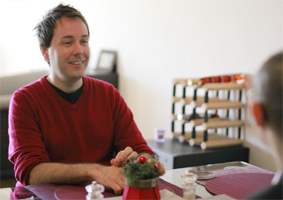
<<休止・帰国された先生のページです>>
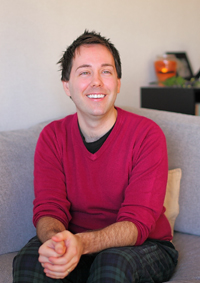 Q: お生まれはどちらですか?
Q: お生まれはどちらですか?
ルイジアナ州のニューオリンズで生まれました。ニューオリンズはとてもすてきな街です。ジャズフェスティバルやカーニバルなどたくさんのイベントがありました。子供の頃、この街で過ごせたことは、とても楽しくて刺激的でした。良い思い出がたくさんあります。
I was born in New Orleans, Louisiana. New Orleans is a lovely place. We have a lot of festivals, like a Jazz festival and a carnival. It is very fun and exciting to grow up there. I have a lot of good memories.
Q: ご両親は今もニューオリンズにお住まいですか?
はい。カタリーナ台風の時、両親の家は倒壊してしまったため、その地を離れましたが、再び同じ場所に戻り、新しい家を再建築して住んでいます。弟二人も現在ルイジアナ州で暮らしています。
Yes, they are. Their house was destroyed in Hurricane Catalina. So they moved away, but then came back. And they rebuilt their house in the same place. I have 2 younger brothers and they live in Louisiana too.
Q: 米国外で生活をされた経験もお持ちなのですね
大学時代、フランスに一年間住んでいました。イギリスでは3年間大学院に通っていました。フランス語に関してはほぼバイリンガルだと思います。
I have lived in France for about a year during a college, and then I have lived in England for 3 years for a graduate school. I am almost kind of bilingual in French.
Q: 来日されたのはどのような目的だったのですか。
5年前に来日しました。最初は英語教師として英会話学校で約1年間、小学校で1年年間教えていました。それ以後は、現在までビジネス英語を教えてきています。
I have been here for 5 years. I originally came to be a teacher. And I worked at a conversation school for about a year, and then I worked at an elementary school for a year. I have been working business English since then.
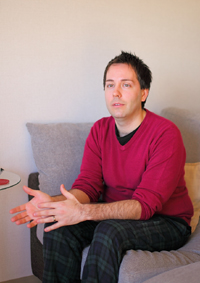
Q: 現在は主にどのようなお仕事をされているのでしょうか。
フリーランスライター、ジャーナリストとして文筆活動を行っています。『メトロポリタン』、『デイリー読売』、『ジャパンタイムス』などの媒体に、映画、舞台、レストランなど、芸術、文化に関する記事を出稿しています。
My main occupation is writing. I am a freelance writer and journalist. I write about arts and culture, like movies, theater, restaurants and things like that, for magazines and newspapers: “Metropolitan” webs, “Daily Yomiuri” or “Japan Times”, that kind of thing.
Q: 日本人の方は実際に海外に行くと、ネイティブスピーカーの英語が理解できずに苦労する場合が多いようです。日常的に英会話を学べる良い方法はないでしょうか。
やはり日本人の方は、ネイティブスピーカーと話す経験が必要だと思います。ネイティブスピーカーの英会話レッスンを受けるか、ネイティブスピーカーの友人を作って、日常会話をしたり、彼らの普段の英語に慣れる必要があるでしょう。また、映画やテレビも自然な英語を学ぶには良いと思います。特にリスニングには良いですね。
I think they need experience with a native speaker. So I think either they need to take lessons with the native speaker or they need to make friends with native speakers and then just to have usual conversations and get used to their casual English. And I also think movies and TV are good for learning natural English, especially for listening. They watch the news or they watch a movie or TV show in English.
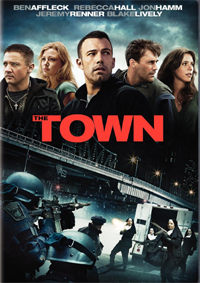 Q:最近の映画で何かお奨めはありますか?
Q:最近の映画で何かお奨めはありますか?
新作ですが『ザ・タウン』という映画が気に入っています。ベン・アフレックが主演兼監督も努めています。 I like a movie called “The Town”. It is a new one. Ben Affleck, he was acting a movie and directing. He is a director now too. That is very good.
Q: 生徒さん毎にマンツーマン・レッスンのカスタマイズされているとお聞きしました。具体的にはどのような事例がありますか。
たくさんの事例があります。主に社会人の方に教えていますが、それぞれの会社には、それぞれの異なった目的がありますので。たとえばゴールドマン・サックスで教えていたときは、株式市場など主にファイナンスに関する英語を教えていました。個人の方ですが、英語でプレゼンテーションを行いたいとのことでしたので、その指導を行っていました。海外出張をされるかたには、トラベル英語を。英語で採用面接があるという方には、その、面接の事前対策をおこないました。本当にたくさんの異なった状況に対応して、カスタマイズしてきています。
I have done a lot, because mostly I did with business people. So different companies have different meanings. I have taught at Goldman Sachs, and it is mostly about financial language like stock markets. Or some companies have individual students, they want to do presentation. So I had to help their presentation. Or some students are traveling abroad, so I had to help them with travel English. I had students that are going for a job interview in English and they need help for preparing for the interview. I just had a lot of different situation that I had to.
 Q: 例えばプレゼンテーションに関してはどのようなレッスンをされているのでしょうか。
Q: 例えばプレゼンテーションに関してはどのようなレッスンをされているのでしょうか。
英語のプレゼンテーションは、日本語でのプレゼンテーションとかなり異なっています。たとえば、英語のプレゼンテーションでは、まず最初に、大きなインパクトのあることを行い、聴衆の関心を引くようにします。最初にジョークを言ったり、面白い写真を見せたりするなどして。また、聴衆にも、そのプレゼンテーションの一参加者となってもらえるようにします。プレゼンテーショーンの途中に、プレゼンターの方から聴衆に質問するなど、聴衆らが常に耳を傾けてくれているような雰囲気作りをして行くのです。日本でのプレゼンテーションとはかなり異なったスタイルですね。
English presentations are very different than Japanese. For example, usually at the beginning of English presentation, we are going to tell a joke or we are going to show something like a funny picture, or doing something like big with impact at the beginning to get people’s attention. And also in English presentations, we like to engage the audience. So we like to ask the audience the question directly during the presentation and make sure they are paying attention. That’s just different style than Japanese.
マーケティングの実務経験をレッスンに活かして エマ先生(六本木) ETCマンツーマン英会話

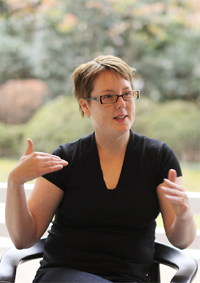 (*)しばらくの間、新規生徒の受付けを停止しています。あしからずご了承下さい。
(*)しばらくの間、新規生徒の受付けを停止しています。あしからずご了承下さい。
Q お生まれはどちらですか
オーストラリアのシドニーで生まれました。シドニーは今では国際都市ですが、私が子どのもの頃はまだ小さな街でした。住むにはすばらしい場所です。ボンダイビーチなど、美しい海岸がたくさんあります。
I was born in Sydney, Australia. Today it is an international city, but when I was growing up, this was not the case. Sydney is a beautiful place to live. There are a lot of beautiful beaches, like Bondi beach.
Q 今までにどのようなお仕事を経験されたのでしょうか
直近では、ジョンソン& ジョンソンでマーケティングの仕事をしていました。医療機器を取り扱う会社です。米国の企業ですが世界中で事業を展開しており、私は外科用の機器を担当していました。実は2000年と2006年に出張で来日したことがあります。日本の外科医とオーストラリアのチームとのジョイントプロジェクトでした。
Most recently I was working in marketing for Johnson & Johnson Medical, a medical device company. It’s an American company, but they have operations all over the world. I worked in the area of surgical devices. I actually did a business trip to Tokyo, in mid 2006, which was very interesting. I met some Japanese surgeons. We shared ‘best practices’ from Australia with the Japanese team and learnt about ‘best practices’ in Japan.
それ以前は、ロンドンビジネススクールでMBAを取得しました。非常に苦労も多かったですが、刺激的ですばらしい体験でした。多くのことを学び、またすばらしい人々と出会いました。
Before that, I did my MBA at London Business School. It was a very challenging program, but fabulous, really amazing. I learnt a lot and met some great people.
Q 英語教育に携わった経験はありますか?
英会話レッスンに関しては初めてですが、ずっと教育には携わってきています。ロンドンビジネススクールでは、ファイナンスの科目で指導助手を行っていました。ファイナンスを苦手とする学生に個別に指導を行う役割を担っていました。また大学生時代には高校生に数学や科学を指導していました。
I’ve been in a teaching position, but I have not taught English before. So, that’s new to me. But whilst I did my MBA, I was a tutor in the finance department for the students that were new to finance.
Also when I was at university, I coached high school students in maths and science.
 ビジネスの世界においては、教育がとても重要で、労力がかかります。ジョンソン&ジョンソン時代は、販売員を教育することが私の役割のひとつでした。マーケティングの仕事は、外科のニーズ、製品やその機能よく理解し、マーケティングのための資料を用意しなければなりませんが、それと同時に販売員がそれらの事柄を本当に理解し販売できるように、彼らの教育も不可欠です。そして、この教育訓練に関するスキルは、ロールプレーの作成など、英語教育に必要とされるスキルにとても似ているのです。
ビジネスの世界においては、教育がとても重要で、労力がかかります。ジョンソン&ジョンソン時代は、販売員を教育することが私の役割のひとつでした。マーケティングの仕事は、外科のニーズ、製品やその機能よく理解し、マーケティングのための資料を用意しなければなりませんが、それと同時に販売員がそれらの事柄を本当に理解し販売できるように、彼らの教育も不可欠です。そして、この教育訓練に関するスキルは、ロールプレーの作成など、英語教育に必要とされるスキルにとても似ているのです。
Coaching is an important but challenging aspect of doing business. When I was working for Johnson & Johnson an important part of my role was training the sales force. To convince a hospital to buy your product, you must understand the needs of the surgeons and what the product features are. I needed to prepare the marketing materials, but also train the sales force, so they really understood how to demonstrate and sell the products. So in some ways that is quite a similar skill set to teaching English, because you are often role-playing conversations and learning new vocabulary.
Q マンツーマン・レッスンの生徒さん用に作成されているロールプレーが本格的なのは、その理由からですね。
たとえば、これは今日レッスンにこられる生徒さんに用意したロールプレーです。私が作成し、事前に生徒さんに送っているので、今日はこれを使ってレッスンを行います。この生徒さんがおっしゃるには、英語を使うのは、ほとんどがご主人の海外からのお客様と食事に行かれる時なのだそうです。そこで、こんなリアルな状況を作ってみました。
For instance, this is what I have done for the student coming today. I prepared and sent this to her in advance. Now we can talk through it during the lesson and she can ask me questions about anything she does not understand. She said that she mostly uses English when she’s going out for dinner with her husband’s customers who visit Japan from overseas. So I thought, let’s make a more real situation.

(ロールプレー・エクササイズによる会話例
場面: あなたはレストランで大切なお客様を接待しています。東京の日本食レストランでメニューはすべて日本語で書かれています。お客様には何を注文してさしあげたらよいかを知るために、お食事の好み(好き嫌い、アレルギーの有無等)を知りたいと思っています。あなたは、ぜひお客様に心地よく食事を楽しんでほしいと思っています。
会話1 お客様はリラックスされていて、食事に関してもいろいろなものにトライしてみたいと思っています。 今晩は何を召し上がりたいですか?食べられないものなどはありますか?(後略)」)
「Example dialogues for role-playing exercise Situation: You are entertaining an important client in a restaurant in Tokyo, which serves traditional Japanese food, and the menu is only written in Japanese. You would like to understand your guest’s food preferences (like, dislikes and any allergies etc) so that you know what to order for them. You would like to make sure they feel comfortable and that they enjoy their meal.
Dialogue 1. The client is relaxed and open-minded about food What do you feel like eating tonight? Is there anything you can not eat? (後略)」
レッスンにおける私の目標のひとつは、生徒さんが本当に英語を必要としている状況に関連した授業を行うことです。そのようなレッスンは当然興味深いものになりますので、生徒さんも自信を持って英語を使えるようになります。そのために、生徒さん毎にこのような上質なロールプレーなどの教材を作り上げて行きたいと思っています。
So one of my goals is to make the lessons relevant to how the students really want to use their English. So it’s interesting, and they can get their confidence up to use it. I would like to build up good resource kits for the students.
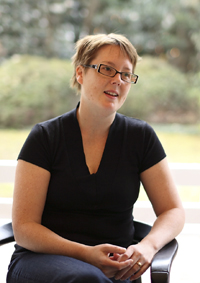 Q:日本のビジネスパーソンが市場価値を高めるために、アドバイスをいただけませんか
Q:日本のビジネスパーソンが市場価値を高めるために、アドバイスをいただけませんか
若い世代にとって、会社は非常に難しいものだ思います。なぜなら、古い経営陣がすべての事柄を決めてしまっているので、若い世代が新しい考えと熱意を持ち、新しいことに挑戦したり、別の方法でやってみよう思っても、いつも上司から「だめだ、だめだ、だめだ」と言われてしまう。若い世代は非常に疲弊してしまっているのではないでしょうか。
I think it’s hard for younger people in companies, because the older management might be set in their ways of “this is how we do things” and “we have a process in our business”. Young people may have new ideas and new energy and want to try new things or think “we can do this differently”. But they’re so often just told, “no”, “no”, “no”. I think they can feel defeated and begin to give up making new suggestions.
Q: そのような状況を打破するためにはどうしたらよいのでしょうか?
あなたをサポートしてくれる人脈、メンターを探してみるのはいかがでしょうか。海外の方、海外経験のある方、または人とは違った考え方ができる人、あなたが信頼している人など、あなたと話をし、助言をしてくれる人です。月に一度か二度、時間を作って会い、あなたが考えていることに対してアドバイスをもらうのです。
I guess it’s aligning yourself with people that will support you, finding a mentor, someone you can talk to. Maybe it is someone who is from overseas or someone who has been overseas, or just someone who is thinking differently. You need to find someone that you can believe in. Ask them to talk to you once a month, to make time to have a coffee and say, “Please, these are challenges that I am facing. In my role, do you have any advice for me?”
アドバイスしたいと思っている人は多いと思います。そのような方々のアドバイスから、経営者層が今どのような状況にあるのか理解するためのヒントのようなのが得られるでしょう。 私自身も人生の様々なステージにおいて、メンターに助けられてきました。皆さんにもぜひメンターを持ってみてはいかがでしょうか。
I think a lot of people like to be asked for advice. Maybe you will find someone, or a couple of people that will make the time to give you their insights into what’s going on in the senior ranks. At various stages of my life, I have had mentors that have been very helpful for me. I think everyone can benefit from that.
心で感じていることを英語に ロブ先生(大倉山) ETCマンツーマン英会話

<<休止・帰国された先生のページです>>

Q: 先生は俳優のお仕事をされているのですね。現在(2010年秋)劇場公開中の日本映画にも出演されているそうですし、たくさんのテレビドラマにも出てこられたとのこと。また、シルク・ドゥ・ソレイユの一次オーディションにも合格されたとそうですね。先ず自己紹介をしていただけますか。
私はカナダのバンクーバーで生れました。日本に来たのは2004年。英語は2006年頃から教えています。基本的に俳優が仕事ですが、充実した時間を過ごしていただくために生徒さんをエンターテインするという意味では、英会話レッスンも演技の一種とも言えますので、私自身とても役に立っています。フォトショップを使った写真の編集やウェブサイトのデザインなどもやっています。
I was born in Vancouver Canada. I’ve been living in Japan since 2004. As for teaching English, I guess that I started from around 2006. Basically what I do now is, I am trying to do acting, but 英会話レッスン is very good, because still I can do entertain students so that they can have a good time. It’s kind like acting. And I do a photo editing with PhotoShop and web design.
Q: そう言えば、先生のことを何かの映像で見た記憶があります。
テレビにもたくさん出演しています。ただ、主役ではなく、一人の役者としてですので、印象には強く残っていないかもしれません。でも、私にとっては、全ての作品が大切です。母がこんなことを言っていました。「小さな役なんてありません。小さな人間がいるだけです。」 小さな役とは、例えば、私がある映画で演じたわずか1分間の役がそうです。私はスターではありませんが、でも私が出演した1シーンもその映画に貢献しているのです。そのことを私はとても幸せに思います。ですから大切ではない小さな役などないのです。でも、そのことに気付けない精神的に貧しい人がいたとしたら、それが問題でしょう。どんな役も素晴らしい。それが私の俳優業に対する姿勢です。
I’ve been on a lot of TV. It’s just I’ve never main. I just do like I am always actor, but never strong. No, It’s important, whole pictures are important. So as my mama said, “there are no small rolls, only small people.” Basically what does it means is small rolls is like on the movie only one minutes. Okay, I am not a star, but my scene helps them. So I am happy with everybody. I think it’s cool. Acting is still acting. So that’s why there are no small rolls, only small people. Small minded, it might be very difficult. Any acting good, that’s my attitude.
Q: 日本人の生徒さんは学校で長い時間英語をかけて学んでも、なかなか上達せずに苦労しています。英会話上達のために何かアドバイスはありますか
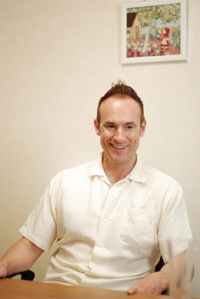 最も単純な上達法は、英語を話すということです。日本人は学校では本を使って英語を学んでいますが、話すことにはほとんど時間を割いていません。英語を話すことと学ぶことは別のことです。英語の習得には、英語を学ぶよりも英語を話すことの方が強い意味を持ちます。
最も単純な上達法は、英語を話すということです。日本人は学校では本を使って英語を学んでいますが、話すことにはほとんど時間を割いていません。英語を話すことと学ぶことは別のことです。英語の習得には、英語を学ぶよりも英語を話すことの方が強い意味を持ちます。
The easiest one to do is speak, speaking English. I mean that at school, they studied a book. You go to high school in Japan, and open up a book, read English, practice grammar. Out of that, one hour passed, maybe ten minutes is speaking, the rest is studying. Speaking English and studying English is two different things. Speaking language is much stronger than learning language.
Q: では、先生のレッスンではどのようなことを大切にしているのですか?
生徒さんが先週何をしたのかという質問でレッスンを始めます。そしてその答え中から主題を見つけ、会話を広げて行きます。例えば、こんな会話があったとします。「先週何をしましたか?」「公園に行きました。」そこで、次に5W(誰が、何を、いつ、どこで、何故)を使って質問を続けます。「そこで何をしましたか?」「公園のどこに行きましたか?」「誰と行きましたか?」「なぜ行ったのですか?」そして、今度は公園のことについて質問をして行きます。この「公園に行った」ことは、教科書の中ではなく、生徒さんの記憶の中にあること。ですから、頭の中にはそのことに関するたくさんの情報があります。さらに、そこには生徒さんの気持ちも含まれているのです。この感情に係わる事柄は、とても話しがしやすいのです。英語にその人の生活を関連付ける。そこに生徒さんの気持ちが絡んでくると、単なる教科書で英語を学ぶよりも、ずっと早く英語を学ぶことができる。これが私がレッスンで大切にしている考え方です。すべては心です。
I used to start off with what a student did a week before. And I take key points and I extend the conversation. For example, “what did you do last week?” “I went to the park”. Okay, so I know they went to the park. Usually I try to follow 5W. Who, what, when, where, why. So I said, “Okay, so what did you do at the park? Where did you go? Who did you go? Why did you go?” and ask question about the park. So there’s a lot of information in their head, “go to the park” in their mind, not just a book. So their feeling are mixed. So it’s much easier to explain their feelings. So my philosophy is English plus person’s life mixed, then much faster with speaking English. If you have a feeling, you learn English much faster than just a book. It’s all heart.
Q: ところで、映画『ボーリングフォーコロンバイン』で、カナダはアメリカに比べ、とても安全な国だと紹介されています。実際はどうなのでしょうか?
 その前提になっているのが恐怖です。アメリカの問題の原因は恐怖であるとマイケル・ムーアー監督は言っています。例えば、「あなたが銃を持っているから、私も持たなければならない」というように。そしてメディアも同様に大量の恐怖をもたらしています。
その前提になっているのが恐怖です。アメリカの問題の原因は恐怖であるとマイケル・ムーアー監督は言っています。例えば、「あなたが銃を持っているから、私も持たなければならない」というように。そしてメディアも同様に大量の恐怖をもたらしています。
Premises are fear. Michael Moore saying is that fear is the cause of America’s problem. For example, if you have a gun, I have to have a gun either. So also media put a lot of potential fear.
マリリン・メイソンは、マイケル・ムーアーにこう話しをしています。「”ニキビ治療薬を買おう。だって、ニキビがあると、誰も君のことを好きにならないから”というような広告を、テレビは大量に流して若者達を日々不安に陥れている」これは、fear tactic(恐怖戦術)と言われています。買わなければ、という気持ちにさせてしまう。日本ではまだあまりありませんが、アメリカではあらゆるものが恐怖戦術にのっとっています。「テロリストだ!テロリストだ!テロリストだ!」「買え!買え!買え!」彼らは、物を買わせるために、人々の恐怖心を利用しているのです。これが、マイケル・ムーアーの映画の前提にある考え方です。
Marilyn Manson said, he talked to Michael Moore, he said “yeah, you know, buy some acne cream. If you got pimples, nobody’s gonna like you.” This is called fear tactic. So I have to buy. I have to buy. I have to buy. That’s very little in Japan. But in America, everything is fear tactics. Everything is fear. Like there’s terrorist, terrorist, terrorist. Buy! Buy! Buy! So they use fear to scare people to buy. This is a premise of Michael Moore’s video.
カナダでは、アメリカのように恐怖を広めるようなことをはしていません。住宅のドアも鍵はかけられれずに、開いたままで安全です。例え、鍵をかけていたとしても、誰かが侵入しようと思えば、侵入できてしまうのですから。ですから、私たちは銃をもちません。もちろん、カナダ人だって争うことはあります。でも、殺人までには発展しません。日本でも同じだと思います。争いごとはあります。でも、アメリカの恐怖戦術ほどではありません。
In Canada we don’t really push fear. The doors are locked open, just safe. Even if you lock the door, they can still get in. I mean it’s not really, you don’t need a gun. All Canadians fight, but we also end it, no murder. It’s same as in Japan. People fight in Japan. But there’s none of as much as fear tactics.
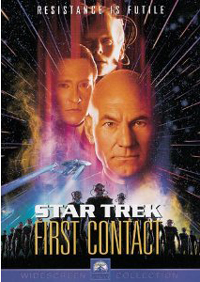 「かつらを付けないと、人に好かれない。」というような広告戦術も同じですね。パトリック・スチュワートをご存知ですか。かれはシェークスピア劇の俳優で『スタートレック』にも出演しています。とても素晴らしい俳優ですが、はげています。でも、かれはアメリカで一番セクシーな俳優の一人です。ルックスももちろん大切ですが、それだけではない、かれの立ち居振る舞い全てが彼をセクシーに見せているのでしょう。
「かつらを付けないと、人に好かれない。」というような広告戦術も同じですね。パトリック・スチュワートをご存知ですか。かれはシェークスピア劇の俳優で『スタートレック』にも出演しています。とても素晴らしい俳優ですが、はげています。でも、かれはアメリカで一番セクシーな俳優の一人です。ルックスももちろん大切ですが、それだけではない、かれの立ち居振る舞い全てが彼をセクシーに見せているのでしょう。
And bald guys for a KATSURA, “If you are bald, you don’t have KATSURA, nobody gonna like you.” You know Patrick Stewart? He is a Shakespeare actor. He was in Start Trek. He is very good. He is very bald. But he is very sexy, one of the sexiest guy in America, because his attitude. It’s not as looks. Looks are so important, also as attitude. Being bald doesn’t necessarily mean that you are ugly. Attitude, that makes you ugly usually, I think.
Q: マイケル・ムーアー監督の映画を見ると、カナダは天国のような国という印象を持ってしまいがちですが
天国ではありません。カナダも他の国と同様にたくさんの問題を抱えています。カナダ人は直接的に物事を伝えてしまうところがあると思います。そのことがしばしば問題になります。一方、日本の文化で難しいのは、あいまいさを尊ぶところですね。大切なのは、何を言うのか、それをどう伝えるのか、ということなのですが。
It’s not heaven. Canada got just many problems as the other countries. I think Canadians are some direct in real, no sugar coating, too straight. Sometimes that’s bad. Japanese culture, sometimes difficult is “あいまい”. So this case, it’s hard to, “読みにくい”. But Canada is just straight, but I understand, sometimes too direct. The question is, is it important how you say it or what you say.
 私にはカナダ人の友人がたくさんいますが、時々すぐに怒り出してしまうことがあります。一方、日本人は、感情を表に出しませんね。それはとても良いことだとおもいます。でも、時には思っていることを言わなければならないこともあります。おそらく、この中間、60%の日本人と40%のカナダ人ぐらいがいいのでしょう。でも、日本人もいつも我慢をしていないで、たまには意見を言わないと健康に良くないと思います。
私にはカナダ人の友人がたくさんいますが、時々すぐに怒り出してしまうことがあります。一方、日本人は、感情を表に出しませんね。それはとても良いことだとおもいます。でも、時には思っていることを言わなければならないこともあります。おそらく、この中間、60%の日本人と40%のカナダ人ぐらいがいいのでしょう。でも、日本人もいつも我慢をしていないで、たまには意見を言わないと健康に良くないと思います。
I have a lot of Canadian friends there, sometimes get very angry very quickly. Japanese use no reaction. So that’s very good. Also sometimes you have to fight. So maybe the middle is better. 60 % Japanese, 40% Canadian. But if you are always 我慢、you feel like you gonna die. I think. Sometimes you have to say something.
☆ ロブ先生出演のRadioETC
技術英語にはギリシャ語とラテン語を ピーター先生(小岩) ETCマンツーマン英会話
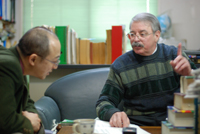
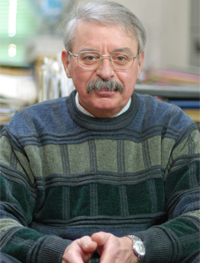 Q: 生まれ故郷の思い出についてお話しいただけますか?
Q: 生まれ故郷の思い出についてお話しいただけますか?
それは難しいです。私は今までに21カ国で暮してきたからです。生れはテキサス州のエルパソ、でも、そこには3日しかおらず、メキシコに行きました。そして3歳のときにイングランドに越しました。そして4歳の時にスコットランドへ。その後アイスランドに住み、英語を学ぶために、オーストラリアに行きました。当時英語が話せなかったのです。オーストラリアで10ヶ月過ごした後、ハワイに越し、一年間住みました。日本に始めてきたのは1958年、旅行でした。父の仕事の関係でたくさんの国に住みました。フィリピン、マレーシア、シンガポール、ベトナム、インド、パキスタン、南アフリカなど。だから生まれ故郷についてお話しするのは難しいのです。
I think it’s difficult, because I’ve lived 21 countries. And I was born in El Paso Texas. But I was only there 3 days and then to Mexico.
And then when I was 3, we lived in England. And then when 4, I lived in Scotland. Then we lived in Iceland. And then I was sent to Australia to learn English, because I could not speak English. After 10 months in Australia, I moved to Hawaii, and lived there for 1 year. First came to Japan was 1958. We had been here for tourists, when we lived in Philippine, because of my father work. Many countries, Philippines, Malaysia, Singapore, Vietnam, India, Pakistan, South Africa, Many countries. So that’s why I am saying it’s little difficult.
その後、オーストラリアで軍隊学校に入学、後に日本の大学で学び、フィリピンで国際経済開発研究の大学を卒業しました。
And then I was in a military school in Austria. After that, I came to the university here in Japan and I graduated the school in Philippines at international economic develop research university.
Q: なぜ英語の先生になられたのですか?
私が英語を教えていたほとんどの方は、大学教授でした。皆さん技術科学者で、とても興味深いものでした。英会話の勉強というよりも、国際学会に提出する論文を作成していました。これらの論文は、第一に英語で作成しなければならないこと、第二に日本の技術を英語に訳すことはとても難しいということ。日本語はやや漠然とした言葉なのです。そこで、技術的知識のバックグラウンドがあり、英語が話せる私が必要とされたのです。 In a most of people whom I taught were Japanese professors. So it was interesting to talk to. And the most of time with them, we were doing engineering. So it was not really English conversation, mainly we did proof reading, because they wanted to submit their research to international publications. So it has to be number 1 in English. And number 2, it has to be taking translating Japanese engineering into English is very difficult, because Japanese is little vague. They want somebody who of course speaks English, also has engineering background. So I can understand that.
Q:レッスンで英語を学んでも、実際にネイティブが話す英語を聞いて理解できず、ショックを受ける生徒さんが多数いらっしゃいます。実際に話されている英語を理解するために、なにかアドバイスはありますか。
 一番大切なことは、話すということです。それが正しいか正しくないかは心配しないでください。話せばいいのです。何事にも練習が必要です。よりたくさんしゃべれば、より早く上達するでしょう。完璧な文章を考えて、考えて、考えていたら、コミュニケートすることができなくなってしまいます。ただただ話しましょう。正しかろうと無かろうと関係ないのです。日本以外のほとんどの国は、誤りを気にしていませんよ。あなたがフランスやドイツなど、ヨーロッパに行ったら、彼らは間違うことなど気にしていないことに気づくでしょう。
一番大切なことは、話すということです。それが正しいか正しくないかは心配しないでください。話せばいいのです。何事にも練習が必要です。よりたくさんしゃべれば、より早く上達するでしょう。完璧な文章を考えて、考えて、考えていたら、コミュニケートすることができなくなってしまいます。ただただ話しましょう。正しかろうと無かろうと関係ないのです。日本以外のほとんどの国は、誤りを気にしていませんよ。あなたがフランスやドイツなど、ヨーロッパに行ったら、彼らは間違うことなど気にしていないことに気づくでしょう。
The most important thing is to speak. Don’t worry about whether it is correct or not. It’s better speaking, like anything takes practice. So the more you speak, the faster you improve. If you were just thinking, thinking, thinking for the perfect sentence, you would never communicate. So I just say, just speak, doesn’t matter with the perfectly accrued or not, because outside of Japan, in most of countries, people don’t care. I mean you go to Europe, French and Germany, they don’t care of made a mistake or anything.
同じことが私にも言えます。私はたくさんの外国語を学ぶ必要がありました。スペイン語、ゲール語、フィリピン語など。でも学校で正式に学んだのは英語だけなんです。レッスンでも、できるだけたくさん話してください。小さい間違いがあったとしても、私はそれを指摘して会話を中断させたりしたくありません。
And same thing, I had to learn languages. The only language I learned officially by school was English. But I have to learn Spanish, Gaelic, Filipino and all this. I just say to them just speak as much you can, if it is a big mistake, I’ll correct it, but if it is a small mistake, I don’t want to break the conversation.
もう一点は、興味があることは何かとういことです。より興味のあるとは、より話し易くなります。そして文法は気にしないで下さい。オーストラリアでは、文法を学ぶのはたった二年間だけなのです。日本で何故そんなに文法に時間をかけるのかが理解できません。
But also the other thing is that I ask them what is interested in. If it is interested in usually the more, the easier to speak, because they have interest. And I ask them to please don’t worry about grammar. Because in Australia, we only have 2 years for grammar. That’s it. Finished. I don’t know why so much grammar in Japan.
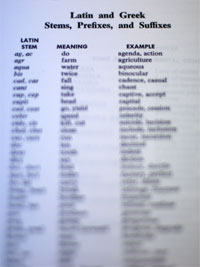 生徒さんによって、ギリシャ語とラテン語の勉強も同じレッスンの中で行っています。たとえば、dentは歯という意味、英語でdentistというと歯医者になります。Marは海という意味。英語では、Submarine(潜水艦)という単語がありますね。これらはすべてラテン語です。Peddは足、Peddleといいますね。 Spectreは見る。英語でInspector は検査官。In、im、il、ir、unはnoという意味。convenient と inconvenient、possible とimpossible、 regular と irregular、interesting と uninteresting。ラテン語とギリシャ語の幾つかを知っていると英語はとても簡単です。すべてのロマンス語は、ラテン語とギリシャ語から生れているのです。ですから、これらを知っていると、ドイツ語やフランス語も話せます。
生徒さんによって、ギリシャ語とラテン語の勉強も同じレッスンの中で行っています。たとえば、dentは歯という意味、英語でdentistというと歯医者になります。Marは海という意味。英語では、Submarine(潜水艦)という単語がありますね。これらはすべてラテン語です。Peddは足、Peddleといいますね。 Spectreは見る。英語でInspector は検査官。In、im、il、ir、unはnoという意味。convenient と inconvenient、possible とimpossible、 regular と irregular、interesting と uninteresting。ラテン語とギリシャ語の幾つかを知っていると英語はとても簡単です。すべてのロマンス語は、ラテン語とギリシャ語から生れているのです。ですから、これらを知っていると、ドイツ語やフランス語も話せます。
Depend on person, I use this. I learned English, I also learned Greek and Latin at the same class. If you take any word that you know. Let’s take, here you have dent means tooth. So you have dentist is a doctor. If you take mar. means sea. So you have submarine. These are all Latin. If you take pedd, pedd means foot. So you have Peddle. Then you have “spectre” means to see or to look. Inspector. You have in im il ir un. It means no. You have convenient and inconvenient. Possible and impossible. Regular and irregular. Interesting and uninteresting. So if you know some of these, English is very easy. This is Latin and Greek. All Romans languages come through Latin and Greek. So if you know certain Latin and Greek, you can speak German, French.
logyは学問という意味。Egyptologyはエジプト学、geoは土という時意味、geologyは地質学、Horrorは時間、Horologyは計時学、psycheは心理、psychologyは心理学。
Logy means study of. Egyptology is study of Egypt. You have geology. Geo means earth. Study of earth. Horror means time. Study of clocks, Horology. Psyche is mine, psychology.
Phobiaは異常な恐れ、Acroは高い場所。ですから、acrophobiaは高所恐怖症。Claustroは狭い場所、Claustrophobiaは閉所恐怖症、Inは否定。Somnは睡眠。Insomniaは不眠症。Ambularは歩く。Somnambularは夢遊病者。Pyroは火、Pyromaniaは放火魔。
phobia means extreme fear, unusual fear. So you have, Acro means high place, so acrophobia. Fear of high place. Claustro means narrow. Claustrophobia is fear of narrow places. In not. Somn sleep. Cannot sleep. Insomnia. Somn again means sleep. Ambular means walk. Sleepwalk. Somnambular. Pyro fire. Pyromania, likes to make fire.
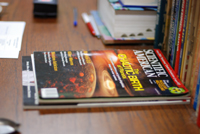 オーストラリアのすべての学校では、これを学びます。アメリカでは学びません。なぜなのでしょう。これを覚えると、単語を見ただけで、その意味とスペルが推測できるようになるのです。また、科学技術に関する単語は、ラテン語を多用しています。
オーストラリアのすべての学校では、これを学びます。アメリカでは学びません。なぜなのでしょう。これを覚えると、単語を見ただけで、その意味とスペルが推測できるようになるのです。また、科学技術に関する単語は、ラテン語を多用しています。
In Australia, in school, all schools teach like this, in America they don’t. I don’t know why. But having this, it’s easy. If I see the words, I can guess and also for meaning and for spelling. And in engineering or science, we use a lot of Latin.
☆ピーター先生出演のRadioETC/Podcasting 単語の意味が直感的にわかるようになる方法
https://etc-eikaiwa.com/25podcast/post_170.html
大使館員宅で国内留学 シェイリン先生(米国在住) ETCマンツーマン英会話

<<休止・帰国された先生のページです>>
 Q:和太鼓を演奏されるそうですね。米国にいらした時から和太鼓をご存知だったのですか?
Q:和太鼓を演奏されるそうですね。米国にいらした時から和太鼓をご存知だったのですか?
いいえ。大使館職員住宅で年に一度開催されるフレンドシップデーで知りました。太鼓の響を聞き、その演奏する姿を見た時、直感的に演奏方法を習わなければと思いました。日本の伝統的な音楽を聞くと平和な気持ちに包まれます。他の音楽には無い感覚です。
No. No. I heard it here at the friendship day that is a kind of a big party of the year. And I heard this booming of drums. I went looking and I find them paying and I just thought oh, wow. I got to learn how to do that. You know, traditional Japanese music usually here, uhm, and it’s peaceful. Japanese music is peaceful to me compare to other music.
Q:現在どんな生徒さんに教えているのですか?
生徒さんのうち、お一人は日本料理の資格を取得されている方です。外国に行きその国の料理を食したり、日本の料理を海外の国々に紹介したり。彼女のレッスンの目的は、現在の英語力を維持すること。フルタイムで仕事をしながら、学校に通いさらに資格の取得をしようとされている努力家です。今後、日常的に英語を使う機会に出会うでしょう。外に出てレッスンをすることもありました。お散歩をしたり、お花見をしたり、目に見える全てのものがレッスンの題材になるのです。
She has a certain degree and a national cuisine. And she travels to different country and tries foods and introduces Japanese foods to other countries. Then she just wants to keep up her English, because she works for full time job on top of going school and end another degree. And she just will get to chances to speak English all regular bases. So we go out, the past lessons were very nice outside. So we just walked and looked at SAKURA blossom and just talking, talk about everything that we saw.
 テキストも用意していますが、生徒さんたちは皆会話形式のレッスンを希望されました。机に坐ってお互いに顔を見合わせているよりも、外に出た方が変化に富み、話題に事欠きません。生徒さんもレッスンに来るのが楽しみになるのではないでしょうか。通りを歩いている人のことだったり、犬や変わった帽子のことだったり。「あれを見て!今まで見たこと在る?」「あのレストランに行ったことありますか?おいしいって評判ですよ」などなど。なによりも、生徒さん自身が、何をしたいかを理解しているとはとても大切なことですね。
テキストも用意していますが、生徒さんたちは皆会話形式のレッスンを希望されました。机に坐ってお互いに顔を見合わせているよりも、外に出た方が変化に富み、話題に事欠きません。生徒さんもレッスンに来るのが楽しみになるのではないでしょうか。通りを歩いている人のことだったり、犬や変わった帽子のことだったり。「あれを見て!今まで見たこと在る?」「あのレストランに行ったことありますか?おいしいって評判ですよ」などなど。なによりも、生徒さん自身が、何をしたいかを理解しているとはとても大切なことですね。
I introduced the textbooks, and they did not want. They wanted just regular conversational English. And so that’s why I am doing. I am kind of making. As we are walking, we are seeing different things in it and it’s introducing other things to talk about, rather than just sitting on the table looking at each other. And so I tried to make things kind of come to us easier. And so only we see someone walking down streets or maybe dogs or funny hats, something we can talk. “Oh, you know. Look at that! Have you seen that?” or “Have you been to the restaurants? Do you know it’s good?” And it worked out. So my students are very figured out really what they want. So that’s great thing for teacher to know.
どんな言葉でも、テキストだけで学ぶのはとても難しいです。知らない言葉を学ぶ際に、先生がジェスチャーと共に教えてくださると、なかなか忘れることはありませんね。私が日本語を学ぶときも同じです。
Any languages, learning with just textbook is very, very hard. If you can think of things I don’t remember learning language before, you can make some thing remember, if she would do a gesture every time she said the word, that word sticks. And even though when I took my Japanese lesson.
 今朝のことです。ある日本人のお母さんが嘆いていました。自分の娘は女の子らしい服を着たがらずに、そこら中を飛び回り、暴れまわってばかりいると。私は「娘さんはTomboyですね」と言いったのですが、お母さんはその意味がわかりませんでした。そこでは私は男の子の様に動いてみせて、引っかき傷や青あざを作るジェスチャーをして見ました。TomはThomas、男の子の名前。Boyは女の子なのに、男の子のように振舞うこと。お母さんは、「そう、そう、そう」と言い、スペルを確認すると「My daughter is a Tomboy.(私の娘はおてんば娘)」と言ったのです。その通りです。私もおてんば娘でしたけど。
今朝のことです。ある日本人のお母さんが嘆いていました。自分の娘は女の子らしい服を着たがらずに、そこら中を飛び回り、暴れまわってばかりいると。私は「娘さんはTomboyですね」と言いったのですが、お母さんはその意味がわかりませんでした。そこでは私は男の子の様に動いてみせて、引っかき傷や青あざを作るジェスチャーをして見ました。TomはThomas、男の子の名前。Boyは女の子なのに、男の子のように振舞うこと。お母さんは、「そう、そう、そう」と言い、スペルを確認すると「My daughter is a Tomboy.(私の娘はおてんば娘)」と言ったのです。その通りです。私もおてんば娘でしたけど。
You know, just this morning, we were working to preschool, one of the mothers was compiling, kind of, I mean just like, “Uh my daughter, she doesn’t want to dress and tight and beautiful. And she’s jumping around and paddles and everything. So I said “Oh, she’s a tomboy.” And she didn’t know that word meant. So I kind of acted like this. Tomboy like, Tom like a boy. Tom is Thomas, boy’s name. And a boy is meaning she acts like a boy. And so I acted like a boy, and you know, “bruises and scratches.” And she said “yes, yes, yes.” Then I said “tomboy”. She asked how to spell it and “Oh, my daughter is a tomboy”. That’s right. So was I.
(*)シェイリン先生は2011年6月で帰国されました。
シェイリン先生は震災以来、国外避難もせず数多くのボランティア活動を精力的にこなされ多くの避難者の方に元気をもたらしてくださいました。 この場を借りて再度シェイリン先生に深く御礼申し上げたいと思います。
ETC事務局一同
異文化比較を通して アイリス先生(麻布十番) ETCマンツーマン英会話
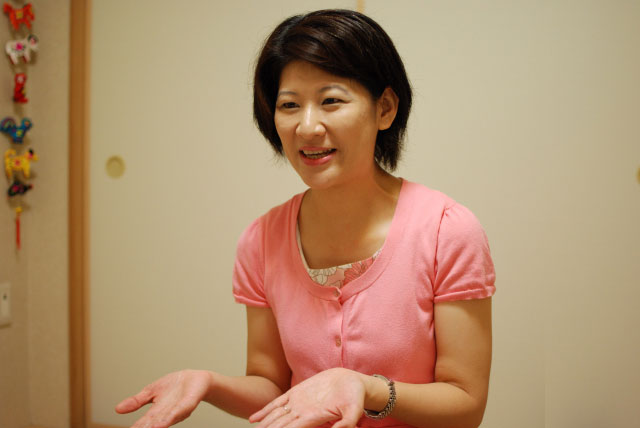
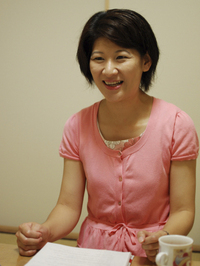 Q: お生まれはどちらですか?
Q: お生まれはどちらですか?
Q: Where were you born?
台湾で生れました。高校卒業後、勉強のためハワイに行き、その後学位を取得するために香港へ。その後、日本に来て、現在は慶応大学で学んでいます。
I was born in Taiwan. And after I finished high school, I went to Hawaii to study. And after that, I went to Hong Kong to gain my master degree. And after that, I moved to Japan and study one year at Keio University. So just a little bit here, a little bit there, in different countries.
Q: 生れ故郷についてお話しを聞かせていただけますか。
Q: Please tell us a little more about your hometown.
故郷ですか。そうですね。人生の半分を海外で暮しているので、私にとって故郷という概念を特定するのがとても難しいのです。 Hometown? Well, first of all it’s too difficult for me to define a hometown, because more than a half of my life I lived abroad. The time I lived in overseas is more than the time I lived in Taiwan. So it’s too hard for me to describe my hometown. I am sorry about that.
Q: 自分には故郷がないという感覚ですか?
Q: Do you feel like you don’t have any hometown?
私は旅人という感覚ですね。どの国も4年から6年住むと、次の国へという生活を送ってきたものですから。
Yeah, I feel like I’m a traveler. It’s like every country I live like 4-6 years and move to another country. And now it happens in 2-3 years later we might leave to other countries as well. It’s really difficult for me to describe my hometown.
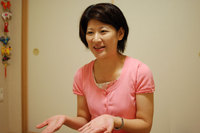 Q: 多くの生徒が英会話を学んでいるにも係わらず、実際にネイティブスピーカーの英語が分からず、ショックを受けることが良くあります。日常生活に密着した実用的な英語を学ぶ方法はありますか?
Q: 多くの生徒が英会話を学んでいるにも係わらず、実際にネイティブスピーカーの英語が分からず、ショックを受けることが良くあります。日常生活に密着した実用的な英語を学ぶ方法はありますか?
Q: Although the students study English at the school, many of them are shocked, when they can’t understand the native speakers. Do you have any recommendations with regards to practical English for daily situations?
私の生徒がその様な問題に直面した場合には、まず、彼らにこう言って励まします。「あなたには問題はないんですよ」。なぜなら、ネイティブスピーカーでさえ、オーストラリア、ブリティッシュ、そしてアメリカのアクセントで話をしているわけですから。それはあなたの問題ではなく、これらのネイティブスピーカーのアクセントに聞き慣れていないだけなのだと。これは、テレビを見たり映画を観ることで改善してゆくことが可能です。ですから、いつも私は生徒に、こう言って勇気付けます。「自信を失うことはありません。あなたの英語は問題ありません。問題はネイティブスピーカーのアクセントにあるのです」と。
OK. When my students have a hard time to understand native speakers, first of them I always comfort them first. It’s not your problem. Because even native speakers, they speak different accent like Austrian accent, like British English accent, American accent. So it’s not your problem. It’s just you haven’t get to used the native speaker’s accent. The only thing you need to do is just to watch more TV, watch more movies to get to used to the accent. Then you should be fine. So I always encourage them like don’t be discouraged, it’s not your problem, your English is good. Just be comforting yourself. The problem is the native speaker’s accent.
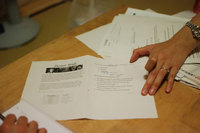 Q: 生徒さんのリクエストに応じて、レッスンをカスタマイズされたことはありますか。
Q: 生徒さんのリクエストに応じて、レッスンをカスタマイズされたことはありますか。
Q: Have you ever customized lessons to suite students’ needs. If yes, please tell us an example of such lesson?
その様な例は沢山あります。
Actually I have too many examples, because I customized almost every students lessons.
最初のレッスンでは、私はいつもこのようなインタビューを生徒に行います。まず自己紹介をしていただいて、今までの英語の学習の経験にすいて、そして不得意な部分、そして英語を学ぶ目的について。
Usually at the first lesson, I always have this style. And I always interview my students at the first lesson, I ask them to introduce themselves and I want them tell me their learning experiences in English before and their learning difficulties like listening, grammar, or whatever. And then the purpose of learning. Why they want to learn English.
生徒さんの一人は、文化、歴史、そして人類学について興味があるとのことでした。そこで、時々彼女にとって勉強になる映画や本を紹介しています。2週間前にも、日系ハワイ人の映画を勧めました。また、レッスンでは、その映画の中で使われているハワイ語についても学んでみました。たとえば、ハナという単語。日本では花ことですが、ハワイではお仕事の意味になります。ですから、「私はたくさんのハナを持っている」というと、ハワイでは「仕事が忙しい」という意味になりますね。
One of my students is interested in culture events. And she said she is interested in history and Jinruigaku. sometimes I introduce some movies or book for her to read or to study. And 2 weeks ago, I recommended her a movie about Hawaii Japanese. So I explained the story in movie first, and because they use some Hawaii-go in the movie. So I also translate the Hawaii-go into English for her, like Hana. Hana in Japanese is flowers. But actually in Hawaii it means work. So if you go to Hawaii, people say we have Hana Hana to do, it means that we have a lot work to do.
Q: 通常のレッスン以外に、お勧めの勉強方法はありますか?
Q: How can students improve their English next to formal lesson?
多くの生徒さんが、日本は英語の環境が無いので、英語が話せるようにならないと不平を言います。それに対する私のアドバイスは、自分自身で英語の環境を作ろうというものです。
I think many of my students they complain that they can not speak English well because they don’t have the English environment. But my advice is that you have to create your own English environment.
まず外出したら、英語の標識、英語の看板、英語の説明を見るように心がけてください。また、例えば薬を買うと、英語の説明がある場合があります。既に日本語の意味は分かるのですから、そちらはなるべく見ないようにして、英語だけを読むようにしてみてください。
You go out, try to look at those English sign, English Kanban, English instruction. Sometimes when you buy the medicine, they have the instruction in both Japanese and English. So because you know Japanese already. So you have to create own English environment. You try not to look at Japanese instruction only read English one and image that kind of situation.
また、電車、特に山手線ですが、常に英語の社内アナオンスがあります。また、電車の中にも外にも、沢山の英語表記があるのです。ですから、できるだけ日本語を見ずに、英語表記だけを読もうとすることで、あなた自身の英語環境を作り出すことができるのです。
And then when you take Densha specially in Yamanote line, they always have the English instructions, like the next station is nani-nani. In the train and train station, there are many English directions, like priority seat. So actually you know those words already. Those words are already in your environment. You just look at Japanese only instead of English. So I tell my students create your own English environment, try not to look at those Japanese instructions or direction, only look at English one.
日本はこの点において、他のアジア諸国よりもずっと恵まれていると思います。なぜなら本当に沢山の外国人の旅行者がいるおかげで、あらゆるところに英語表記があるではありませんか。日本には英語環境がないなんていうのは間違いです。そこら中に溢れています。ただそれを読まずに、日本語表記を読んでしまっているだけなのです。
I think Japan is actually better than in other Asian countries, because there are so many foreign tourists in Japan. So like everywhere they have the English instruction and writing. So I think why Japanese still say they can not speak English. They have English everywhere. It’s just the read Japanese. That’s it.
===== ===== ===== ===== =====
■ アイリス先生のレッスンを受講されているかをりさんからのフィードバック
 日常ではまったく2年くらい英語を話さない状況の中で、香港に行くたびにどんどん英語が下手になっていく → 話せなくなっていく負のスパイラルが続いたとき、友人に「英語を話せなくなったのかい? 君は発話障害かい?」と聞かれ、ものすごいショックでした。
日常ではまったく2年くらい英語を話さない状況の中で、香港に行くたびにどんどん英語が下手になっていく → 話せなくなっていく負のスパイラルが続いたとき、友人に「英語を話せなくなったのかい? 君は発話障害かい?」と聞かれ、ものすごいショックでした。
そこから「いつでも英語を話せるようにしよう」との「転機」が訪れたと思います。彼らもそこから日本語学校へ通うようになってくれました。このように私に「やる気」を起こさせようとしてくれた友人達にも感謝の気持ちでいっぱいです。
とにかく1日でも早く「伝わる英語」を取り戻したくて、必死で英語学校を探しました。入会するにあたり、1度に100万円以上のお金を一度に入金しなくてはいけない英語学校や、時間の融通が利かない学校など、なかなか自分に見合ったスタイルの学校がみつかりませんでしたが、ネットでマンツーマンレッスンのETC英会話を知り、最初は半信半疑で入会してみましたが、予想以上にホスピタリティも高く、相性の合う先生が見つかるまで何度もやりとりし、顔を見て話さなくても十分満足できるスクールだとわかり感謝しています。
私のアイリス先生は台湾人ですがきれいな英語を話し、数カ国に在住した経験を持ち、聡明で(ハワイ大学特待生・香港中文大学院特待生・慶応大学大学院卒業)、ご主人が香港人ということで、私の香港生活を非常に豊かにしてくれる、すばらしい先生です。
 私が特に気に入っていることは、たまに理解できない表現を先生が使うときでも<決して日本語で私に話さない>という徹底した姿勢です。段階を追って、方法を変えて私に表現するという教え方をしてくれます。私は日常会話のスキルアップを望んでいるので、会話の内容の多くは、香港と私達の身の回りにおきた出来事を話すことが多いです。
私が特に気に入っていることは、たまに理解できない表現を先生が使うときでも<決して日本語で私に話さない>という徹底した姿勢です。段階を追って、方法を変えて私に表現するという教え方をしてくれます。私は日常会話のスキルアップを望んでいるので、会話の内容の多くは、香港と私達の身の回りにおきた出来事を話すことが多いです。
「そのときどう思った、どう感じたか?」
と絶えず聞いてくれます。そこで、一通り聞いた後で、間違ったところを指摘されます。そして毎回「まちがったところ」を紙に書いて私にくれますが、これが繰り返しの勉強法に必須なものであり私の宝物です。
私が台湾旅行したときには、アイリス先生は現地の親友を紹介してくれ、彼女達が案内をかってでてくれました。その時に、彼女達は私よりも英語を話すことができませんでした。後に彼女達からメールをもらい、「私達はアイリスの友人でありながら、あなたより英語が話せなくて悔しかった。今からあなたを追い越せるように英語を勉強します」と書いてありました。
そのときのアイリス先生への感謝の気持ちを私は一生大切にしていきたいと思います。
幼少期より英語に親しみ高校時代にはホームステイを体験。その後も色々な英語学校で様々な経験をしながら英語力をアップ。たまたまできた香港人の友人との付き合いに加え、父の香港での仕事の手伝いも増えることで、英会話学校を再び探し、マンツーマンレッスンのETC英会話に入会。
(*)「ケイコとマナブ」2012年5月号(3/25発売)に生徒さんのインタビュー記事が掲載されました!
細かいニュアンスは日本語で ダイアン先生(目黒不動) ETCマンツーマン英会話
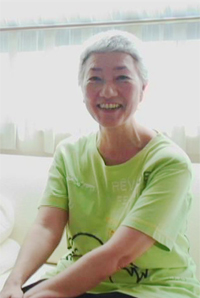
 Q: お生まれはどちらですか?
Q: お生まれはどちらですか?
Would you tell me, where were you born?
私は日本で生れました。生れて8ヶ月でアメリカに移りました。 I was born in Japan but I went to America when I was about 8 months old and lived there, in America.
Q: アメリカにいたときのことをお聞かせください。
Please tell us a little more about when you were in the United States.
私がアメリカにいたのはまだ小さなときです。父は軍隊に勤務しており、母は日本人でした。彼らは日本で出会い、私が生まれると、私たち家族は米国に戻りました。ニュージャージで5年間暮しました。住んでいたのは父が働いていた基地の直ぐ側の住宅地で、住みやすい場所でしたが、大きな都市ではありませんでした。 When I was in the United States, I was there only a little time so actually as I said I was born here. My father is in the army, my mother is Japanese so they met in Japan and I was born in Japan but after that my father was back in America and we went there and I lived in New Jersey for about five years. The place I lived was very near the base area where my father was working so it was a residential area and very nice but not a big city.
Q: 日本には何年住んでいらっしゃるのでしょうか。また滞在の目的を教えてください。
Then how long have you lived in Japan and what is the purpose of your stay in Japan?
日本には、私が小学生の頃から住んでいますので、40年以上になるでしょうか。日本滞在の目的は、母が日本人であること、そして私の夫も日本人であること。結婚して30年以上になりますが、その間ずっと教師として仕事をしてきています。 Oh, I have lived in Japan for a long time now as I said, since I was in elementary school so well over what 40 years now? And the first purpose of course is because my mother is Japanese and of course we were American, so I went to international schools here in Japan. And now my husband is Japanese so that’s another reason I stay in Japan and ever since I got married for over 30 years now I have been teaching. So I am a teacher all the way.
 Q: 英語教師としての経歴についてお聞かせください。
Q: 英語教師としての経歴についてお聞かせください。
Please tell us about your English teaching background.
結婚して東京に移り住んでから30年以上、専門学校で英語教師として、文法、作文、会話、などを教えています。同様に様々な英会話学校やプライベートレッスンなどでも教えてきています。 I have been teaching at a Semon Gakko for over 30 years after I got married and moved to Tokyo. I have been teaching as a teacher teaching grammar, writing, conversation and so on. And for a long time and I have been teaching also in different conversation schools, also private lessons like students that you send me.
Q: マンツーマンの授業ではどのようなことを強調されていますか?
What kind of points do you emphasize during your classes?
リラックスして話すことです。多くの生徒は、英語を話す時に正しい文章で話そう、間違わないように話そうと、神経質になってしまいます。でも、それはあまり大切なことではないのです。間違うことは問題ありません。なぜなら先生が生徒の間違いを正すことができるから、生徒はその間違いから学んでゆくからです。でも生徒が間違うのを気にするあまり何も話さなくなってしまったとしたら、先生は間違いを直すことができなくなってしまいます。ですから、私のクラスではブロークンでもかまわないので、生徒が思い切って話せるようにしています。また、日記を書くことも勧めています。文法的に間違っていてもかまいません。授業で私が間違いを直しますし、日記の中から話題を見つけて、自由に会話することもできますから。 I have the students try to feel relaxed in speaking. Many students feel nervous. When they study English so they think they have to make a correct sentence, not make a mistake but that’s not important. Making a mistake is OK because the teacher can correct the students. Then the students will learn from the mistake. But if you don’t try to say something then the student will not learn because I cannot correct. so I have my students try to speak out in class even if it’s broken phrases or as I said write a diary and even if it’s wrong in grammar it doesn’t matter because when they bring it here I can fix it and we can talk about the topic. So it gives a chance to speak or have a free topic for a free conversation too.
 Q: 全くの初心者の方がマンツーマン・レッスンにいらっしゃった場合はどのように対応されますか?
Q: 全くの初心者の方がマンツーマン・レッスンにいらっしゃった場合はどのように対応されますか?
If you have a complete beginner student how do you start speaking?
いい質問ですね。私は日本語を話しますので、もし初心者の方がいらっしゃった場合は少し日本語を使います。辞書やインターネットを使って学ぶのことも良いのですが、辞書は時々直訳になってしまったり、インターネットの翻訳システムは多くの場合、上手く機能していません。でも、私の場合は日本語が分かりますので、細かいニュアンスなどを伝えるには、日本語で説明したほうが良い場合がありますので、その場合は日本語を使います。
That’s a good point, because I speak Japanese when I have very beginners I usually speak, use a little Japanese. Because checking in the dictionary or checking on the Internet is OK. But when you search on the Internet or use a dictionary it is sometimes just a straight translation. Many times the Internet translating system is not so good so you get strange translations. But in my case I understand Japanese so when I have beginners I sometimes have to explain some phrases or words in Japanese, which I think is easier, the nuance is very different which is difficult to find on the dictionary.
 Q: 英会話上達のために、通常のレッスン以外にお勧めの方法はありますか?
Q: 英会話上達のために、通常のレッスン以外にお勧めの方法はありますか?
How can students improve their English next to formal lessons?
例えば、気に入った映画があれば、まず全編を日本語で見て内容を理解した上で、二回目は英文字幕で見る。そして三回目は字幕を消して英語だけで観る。映画がお好きな方でしたら、この方法をお勧めします。 For example you have a favorite movie you can watch the movie in Japanese first and understand the whole story. Then later on the DVD for example you can change it to, I don’t know how it works but maybe English subtitle and you can watch the movie and read the subtitle and then thirdly just turn off everything and just watch the movie and when the actors are speaking in English and listen to the English on the DVD. People who are interested in movies I think this is good.
元ジャーナリストと英会話マンツーマンレッスン マイク先生(富ヶ谷) ETCマンツーマン英会話
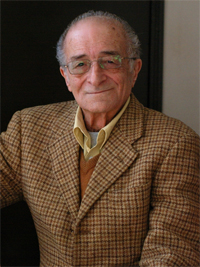
生前の貢献に深く感謝するとともに謹んでご冥福をお祈り申し上げます。
 Q:かつては、ジャーナリスト、ライターとしても活躍されていましたね。また、英語の先生としても20年の経験をお持ちです。英語の先生になった理由をお聞かせください。
Q:かつては、ジャーナリスト、ライターとしても活躍されていましたね。また、英語の先生としても20年の経験をお持ちです。英語の先生になった理由をお聞かせください。
英語を学びたかったからです。ライターは英語を勉強することがありません。しかし教師であれば学ばなければなりません。日本の学生の方が私よりも文法に関しては詳しかったこともありました。本当の話ですよ。ネイティブスピーカーは母国語を学ばないものです。英語の勉強はとても興味深いです。 Because I wanted to learn English. You see, as the writers, you don’t study. But as the teachers, you must study English. So Japanese students knew more that I did about the grammar. No, serious. You see, a native speaker doesn’t study. Studying English is very interesting.
Q:レッスンで英語を学んでも、実際にネイティブ・スピーカーが話す英語を聞いて理解できず、ショックを受ける生徒さんが多数いらっしゃいます。実際に話されている英語を理解するために、なにかアドバイスはありますか。
大切なのは、英語で考えるということです。考えることができなければ、話すことはできません。日本語は感じる言語です。どう感じているか。英語は考える言語です。明確な考え、クリアな考え方が必要です。クリアな考え方とはクリアなイメージを意味します。ですから生徒さんには英語で論理的に考える方法を教えています。物事を分解して考える方法、英語で考える方法です。理解する方法です。記憶する方法ではありません。理解です。日本での教育においては、記憶、記憶、記憶、記憶、そして繰り返し記憶することばかりが強調されます。英語においては、理解することを教えています。理解できれば、決して忘れることはありません。理解するためのイメージを作り出すことができるからです。
Well, you know what’s thinking, how to think in English. If you can not think, then you can not speak. You see Japanese is feeling. How do you feel. In English is what are you thinking. So you must have clear thought, clear thinking. Clear thinking means clear image. You go to teach the students how to think logically in English. You know what I teach the students how to think logically, how to think in small piece, how to think in English. How to understand, it is not remember, understand. In Japanese teaching, you see, remember, remember, remember, remember and repeat. In English is understand. If you could understand, you never forget. You create image to understand, not remember.
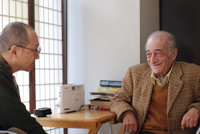 Q: 英文フレーズに関して、一つ質問です。「後悔先に立たず」の英訳でRepentance comes too late. というフレーズを見つけました。これは日常の会話の中で使っても良い表現なのでしょうか。
Q: 英文フレーズに関して、一つ質問です。「後悔先に立たず」の英訳でRepentance comes too late. というフレーズを見つけました。これは日常の会話の中で使っても良い表現なのでしょうか。
Repentanceは、「ごめんなさい」とひたすら詫びる事ですが、宗教的な言葉で、神に対して謝罪する際に使われます。宗教的な話題の際に用いるのであれば問題ありませんが、日常会話の中で用いるのならば、“being sorry comes too late”. という表現が良いと思います。ところで、日本人は宗教を持たないのですか? であれば、神に対して詫びること(repentance)もないですね。(笑)
Repentance comes too late. Repentance is ごめんなさい、ごめんなさい、ごめんなさい。 Well, that’s religious. That’s a religion. This is repentance for God. Repent your things. If you say 神様ごめんなさい, then it’s OK. This is repentance. If you are talking, its subject is religion, it’s OK. If the subject is everyday life, you say “being sorry comes too late”. But there is no religion in Japan? No repentance.
企業ITのスペシャリスト ジョー先生(豊洲) ETCマンツーマン英会話
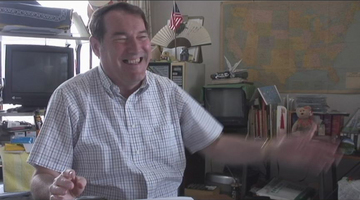
※動画は以前先生が拝島在住の際に撮影したものです。現在は豊洲で教えています。
 Q: 出身地はどちらですか?
Q: 出身地はどちらですか?
Q: Where were you born?
A: 中西部で生れました。アメリカのほぼ中心にあるネブラスカ州です。ネブラスカはとても寒い場所です。
I was born in the midwest, almost the center of America I was born in a place called Nebraska, it’s very cold in Nebraska.
Q: 生まれ故郷についてもう少しお話しをお聞かせください。
Q: Please tell us a little bit about your hometown.
A: ネブラスカには18歳になるまで住んでいました。その後コロラド・スプリングに引っ越しました。コロラド・スプリングが私にとって本当の故郷です。コロラドはロッキー山脈で有名ですね。そこは高地で、日本と同じように温泉もあります。また、高地トレーニングのために多くのオリンピック選手がこの地を訪れます。いわゆる田舎町で、夜11時にお店などは閉まってしまいます。日の出も日の入りはとてもきれいですよ。私は東京では日の出も日の入りも見たことがありません。
After I was born, I lived in Nebraska for 18 years, I moved to Colorado Springs. So really my hometown is Colorado springs, Colorado is famous for the rocky mountains, and is very high in the air, We have hot springs also, the same as you have in Japan in Colorado springs. Colorado Springs is very clean and very good for training. We have many olympians to come and train in Colorado springs because of the thin air. So people can exercise. So it’s sort of a country town, at about 11 o’clock at night it closes, the town just closes up, OK but it’s very beautiful. the sun rise is beautiful, the sun set is beautiful. I never see sunrise and sun set in Tokyo.
 Q: 日本滞在の目的は?
Q: 日本滞在の目的は?
Q: What’s the purpose of your stay in Japan?
A: 現在、私はITの専門家として会計財務会社に務めています。同社のすべてのコンピュータを管理するのが私の仕事です。 The purpose now is I work for an accounting and finance agency as the IT specialist, so my purpose is to take care of all the computers in the accounting and finance agency.
Q: 英語教師としての経歴をお話ください
Q:Would you tell me about your teaching background, teaching history?
A:私が最初に日本で英語を教えたのは、福生の床屋さんでした。友人が福生で床屋をやっていて、閉店後に彼の子ども達に英語を教えたのが、私の英語教師としての最初の仕事でした。 その後、八王子の英会話学校で働くこととなりました。同学校の校長は本当に英語教育のプロでした。新しい生徒にはまず彼が英語の基礎を教え、少し話せるようになったところでアメリカ人の先生が生徒を引き継ぐというものでした。そこで、個人向けの一対一のレッスンや、様々な企業で2、3人のグループにレッスンを行うことができたのは、私にとってとてもよい経験でした。現在のレッスンにも、その経験を活かしています。
The first time I taught English in Japan was at a barbershop in Fussa, that was my first teaching job. I was a friend of a barber and he had his family living in Fussa so I… my first teaching job was teaching his children English on the barber shop floor. He would close the barbershop and we’d have an English lesson inside the barber shop. But then I started working for a school in Hachioji, OK, and the schoolmaster was a real pro about teaching English. He had a very good system of teaching English so he gave me his system of teaching English where he took the new students and gave them basic English and then when they was able to speak a sentence in English he would give them to us Americans. I’ve worked in companies and I’ve worked in one-on-ones student, I’ve worked in companies and I’ve also worked in group lessons with 2 or 3 students at one time. So I think for me the variety of a company class and students one-on-one is really a great success for me because I have both environments, and I can bring both of them to the class room.
 Q:日本人の生徒が抱える共通の問題点は何でしょうか?
Q:日本人の生徒が抱える共通の問題点は何でしょうか?
Q: What are the common problems the Japanese students are facing?
最も大きな問題は、Peer Pressure (周囲/仲間からの圧力)だと思います。ですから生徒さんが私のクラスに来たら、私は彼らをできるだけその仲間から切り離します。そして、周りを気にせずに質問ができ、オープンに意見を言うことができる環境を作ります。私は日本人の方々の意見を行くの大好きです。
I think their biggest problem as far as I am concerned is peer pressure. When they come to my class room I try to separate them from their peers. They are individuals. They come to me, they should ask questions, they should be open and be opinionated, give their opinions. I love to have Japanese give me their opinions.
周りの人々、父親、母親、社会から受ける圧力が日本人の生徒さんにとって一番の重荷なっていると思います。それらの圧力から解き放たれることができたら、彼らはもっと早く英語を習得できると私は思います。
So I think the biggest draw back for Japanese students right now is the peer pressure, they are receiving from others, and their fathers, the mothers, the society. And if I can bring them to this room and cut off the peer pressure from outside and open them up, I think they’ll learn English much faster.
Q: Peer pressureとはどういう意味ですか
Q: Could you explain to me what does peer pressure mean?
Peer Pressureとは、とたえば同じ年齢の生徒が同じクラスになった場合、そのうちの一人がリーダーとなると、他の生徒はフォローワー(従属者)となり、そのグループの一員になりたいと思うばかりに、そのグループに属する仲間からの圧力を感じ、生徒さん自身の正確を変えてしまうのです。Peersは同年齢、同じグループという意味です。
OK, peer pressure is when you have a group of students in the same age, the same class. One student is the leader and the other students are pretty much the followers, so the followers want to feel like they are part of the group, so they’ll change their personality to the peer pressure of their peers. Peers is same age, same group. The company has the same thing in Japan.
Q: ヒアリングとスピーキング能力をつけるためにアドバイスをいただけますか。
Q: Please give me your advice how we can improve our hearing and speaking abilities.
ヒヤリングは一部の生徒さんにとっては大きな課題のようですね。 私がほとんどの生徒さんに勧めているのは、何でもかまいませんの自宅で大きな声を出して読むことです。これには三つの効果があります。スピーキング力、リスニング力 そして読解力のアップです。大きな声を出すことが大切です。黙読では効果はありません。大きな声を出して読み、その自分の声を聞く。自分の声が聞こえるようになると、それは自信に繋がってきます。
OK, hearing seems to be a big problem for some students. So what I recommend for most students is to read something aloud at home, read something aloud. this gives them practice speaking, gives them practice listening to their own voice, OK, so it provides three things: speaking, listening and comprehending. Because when you read something, you comprehend it. So I think for speaking and hearing, to practice at home or in a quiet place, reading aloud, aloud is very important, don’t read silently, read aloud so you hear your own voice. And once you hear your own voice, you have a raise in confidence too, your confidence is increased,
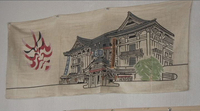 Q: 生徒さんからの希望でレッスンをカスタマイズされたことはありますか。
Q: 生徒さんからの希望でレッスンをカスタマイズされたことはありますか。
Q: Have you ever customized lessons to the student’s needs. if yes, please tell us an example of such a lesson.
私の最初のレッスンでは、生徒さんの英語能力の確認をしています。次に「何故英語を学びたいのか」その目的を尋ねます。英語を話す人々と話しがしたいから、これが最も一般的ですね。また、ある生徒さんは仕事のため、ある生徒さんは来週アメリカに行くから。えっ、来週ですか?(笑) 一週間で英語は学べませんよ。みなさん様々な理由がありますが、生徒さんのその目的が何より大切です。目的が何であれ、私のレッスンも同じ目的を共有して行われます。
For my first few lessons I am actually testing or reviewing the student’s capability, ability. Then I ask the students, “why do you want to study English?”, and of course many students say I want to talk to English speaking people, conversation. That’s the most common one. Some people say I want to learn English for business. some people say I want to learn English because I am going to America next week. What do you mean next week? (Laughing) You can’t learn English in one week. Some students have different reasons. I do have some students that want to learn English because of their career for like college or university, OK, so what I do is I customize all my lessons to suit the student. The student’s purpose is most important. Whatever the student’s purpose is, my purpose is the same.
しかし、驚くのは、幾人かの生徒さんはすでに英語に対する基本的な理解はできていて、後は自信をつけるだけでよい方もいます。多くの生徒さんにも言えることです。ですから私の仕事は、風船を膨らませるかのように、最初は小さい自身でも、それに空気を送り続けて、だんだんと大きくしてあげる。それが私が試みていることです。
But some students surprise me. some students have a very basic understanding of English and we just need to work on the confidence, the confidence level. Many students need confidence, I mean it is like a pump. pump up their confidence, OK. like a balloon when they come to me they have very little confidence and I just pump, pump, pump, pump, pump their confidence up. That’s what I try to do.
子どもから大人まで サンドラ先生(豊島区) ETCマンツーマン英会話
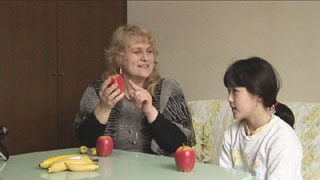
 東京都豊島区にお住まいのサンドラ先生。ご自宅は最寄の駅から歩いて15分程度。閑静な住宅街の中にあります。
東京都豊島区にお住まいのサンドラ先生。ご自宅は最寄の駅から歩いて15分程度。閑静な住宅街の中にあります。
来日して既に10年以上。お休みの日には日本各国を旅をされているそうです。
Q:日本でお気に入りの場所はどこですか?
サンドラ先生:「四国です。四国の人々は本当に親切なんです。土地柄からかお遍路さんが多く普段から「旅人には親切に」という習慣が自然と身についているのかもしれませんね。」
 サンドラ先生は現在、小学生から社会人まで幅広くレッスンをされています。
サンドラ先生は現在、小学生から社会人まで幅広くレッスンをされています。
サンドラ先生:「日本の子ども達はお行儀が良いのでとても教えやすいです。レッスン中にふざけて遊んでしまう子もいるのですが、注意をすれば、ちゃんと先生の言うことを聞きますし、私の話を耳を澄ましてよく聞こうとしているのがわかります。」
サンドラ先生:「週末には社会人のクラスを集中的に行っています。皆さん平日は仕事が忙しくいらっしゃれないのですね。日曜日は朝からレッスンがあります。」
Q:社会人の方にはどんなレッスンをされているのですか
 サンドラ先生:「製薬会社にお勤めの方なんですが、国際会議に出席するために海外出張をされる前には『Passport to New Places』を使って、入国管理のロールプレーを行いました。また、会議に必要な基本的な表現についても学びました。」
サンドラ先生:「製薬会社にお勤めの方なんですが、国際会議に出席するために海外出張をされる前には『Passport to New Places』を使って、入国管理のロールプレーを行いました。また、会議に必要な基本的な表現についても学びました。」
Q:生徒さんが英語が話せない全くの初心者の場合はどうされるのですか
サンドラ先生:「その場合は私が日本語を話したり、『Exploring English』等の初心者向けのテキストを使います。また時には子供向けの教材などを使ったりするのですが、結構評判がいいのですよ。」
Q:英会話を教えていて楽しいことはどんなことですか
サンドラ先生:「私自身も英語を教えながらとても勉強になっています。たとえば、”It’sraining cats and dogs.”という表現があります。日本に訳すと”土砂降り”ですね。では何故こんな表現をするかご存知ですか?
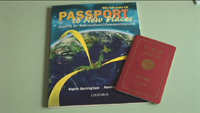 それは17世紀英国で大量の雨が降ったそうです。雨は何日も降り続き、雨が止んだあとには、そこらじゅうに犬や猫が倒れてなくなっていたそうです。その様子はまるで、彼らが空から雨と共に降ってきたような見えたそうです。だから、”It’s raining cats and dogs.”と言う様になったそうです。」
それは17世紀英国で大量の雨が降ったそうです。雨は何日も降り続き、雨が止んだあとには、そこらじゅうに犬や猫が倒れてなくなっていたそうです。その様子はまるで、彼らが空から雨と共に降ってきたような見えたそうです。だから、”It’s raining cats and dogs.”と言う様になったそうです。」
Q:日本人の生徒さんに英会話上達のためのアドバイスはありますか
サンドラ先生:「皆さんがお仕事が忙しいとは思うのですが、ゴールデンウィークや連休などを上手く利用して、ぜひ実際に海外を旅することをお勧めします。旅の過程で、実際に外国語に接することが、何よりもご自身のためになり、上達につながるでしょう。また、普段レッスンで学んだことの確認、力試しになるかもしれませんね。」
英語だけでなく、仕事のアドバイスも ジョン先生(尾山台・等々力) ETCマンツーマン英会話
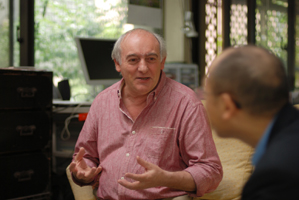
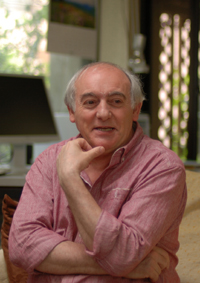
(*)しばらくの間、スケジュールがいっぱいの為、新規生徒の受付停止中です。あしからずご了承下さい。但し、状況によって余裕ができることもあります。最新情報は事務局にお電話にてお問い合わせください。
Q: ご出身はどちらですか?
イギリスのダラム(Durham)という古い町です。ダラム城、ダラム大学などでよく知られています。
Q: 英語を教えるようになったきっかけは何でしょうか?
私が日本に住むようになって40年がたちました。その間、いろいろなものを日本から頂いてきたと思っています。ですから、今度はそのお返しをしなければならないという気持ちがあるんです。でも、大手企業の責任者として働いていた頃は、なかなか時間が取れませんでした。自分の会社を設立してから、比較的時間に余裕が生れたため、英会話のレッスンを始めるようになりました。
Q: どんなお仕事をされているのですか
現在は、自動車メーカーの海外生産用に工作機械の輸出を行っています。
以前はイギリスと日本の大手企業の合弁会社を設立して、その責任者を務めていました。劇場やテレビ局のスタジオなどのデザインを行っていました。東京オペラシティの舞台装置も、その会社で行った10年越しの事業の一つです。イギリスの企業がデザインしたものを、日本の企業が現場で作っていました。
Q: 異国間でデザインのやり取りを行うのは難しそうですね
かなり難しいです。結局、日本語と英語ですからね。例えば、日本のエンジニアがイギリスのデザイナーと直接話しをしても、何を言っているのか全然わからない。原因は、日本人の英語力だけではないのです。イギリス人のデザイナー達の方も、普段自分達が使っている英語しか知らない。ですから、日本人のために話す英語などわかるはずかないのです。結果として、そこにコミュニケーション・ギャップが生れました。
そこで、あまり英語がわからなくても、お互いがコミュニケーションを取るためには、どのようにすればよいのか、そのシステム、考え方を私は作りました。
 Q: コミュニケーションで、一番大切で一番難しい部分ですね。
Q: コミュニケーションで、一番大切で一番難しい部分ですね。
まず、電話はできるだけ使わないようにしました。もちろん、相手の話しがすべて理解できるなら別ですが。なかなかそうはいかない。当時(1985年~1995年)は、まだe-mailが無い時代。テレックスとファックスの時代でした。お互いのやり取りは、これらを使ってすべて書面に残るようにしました。また、何を相手に聞きたいかのか、それをどうやって明確にするか、それをどのように質問するか、実際に文面にする場合にはどのように書くのか。書き方、考え方など、いろいろなシステムを作り上げました。これは、東京オペラシティの舞台装置を完成させた、大切なシステムの一つです。
Q: レッスンはどのように行っていますか。
レッスンでは、英語を教えているというよりも、「道」を教えていると言ったほうがよいかもしれません。もちろん、必要な場合は、英文法等に関しても細かい指導をしていますが。ここにいらっしゃる生徒さんは皆、基本的な英語は分かっているのです。12歳の頃から学校で英語を学んできたわけですから。でも、それをどう使ってよいかがわからない。だから、その「道」を見せてあげる。そして、時々手を引いてその「道」を一緒に歩いてあげる。時には、優しく後ろから背中を押してあげる。
Q: 一度、ある生徒さんの英語面接の直前対策をお願いしたこともありましたね。
あの生徒さんは、英語はよくできたのです。ただ、今までの様々な経験や現在の自分の情況から、自分に対する自信を無くしていました。そのためか、面接では必要以上に緊張してしまっていました。「面接官も同じ人間です。たまたま今立場が違うだけ。だから、もっと自然に。心配しすぎないように」など、色々なアドバイスをしました。すると、何回かレッスンに通ううちに、自信を取り戻してきたようです。面接に合格した際には、とても喜んで電話をくれました。
Q 経営者の立場から、たくさんの人をご覧になっていた経験があるのですね。
大手企業で働いていたときは、約1700人のスタッフがいました。それだけの人数がいると、仕事のほとんどは、本来の事業よりも、人事面での仕事がメインになっていましたので。
 Q: 先生のレッスンを10年間も続けられた生徒さんがいらっしゃいましたね。
Q: 先生のレッスンを10年間も続けられた生徒さんがいらっしゃいましたね。
あの生徒さんがレッスンを辞めたのは、ご結婚をされて旦那様のお仕事の関係で上海に赴任されたかれたからなんです。先日、一時帰国された際に、旦那様と一緒にご挨拶にいらっしゃいまいた。「先生のところには伺わないと。ファミリーだと思っていますから」と言ってくれました。夏には帰任予定だそうで、その時にはまたレッスンをお願いしますとのことです。
Q: 家族ぐるみのお付き合いですね。
私には三人の子どもがいます。一人はメルボン大学を卒業し、現在東大大学院に通っています。もう一人は、ハワイ大学を卒業して現在日本でファイナンスの仕事をしています。もう一人はこれから大学に入ります。そうそう、この時計は、上からメルボン、東京、そしてハワイの時間を指しているんです。
生徒さんは皆、私たちの子ども達のことも、私の妻(日本人)のことも知っています。 時々、生徒さんと私の家族と一緒に、この屋上でバーベキューパーティを行ったり、自由が丘のイングリッシュ・パブで食事会を行ったりしています。皆さん、お互いのことにものすごく興味があるようですよ。「今何勉強してるの?」とか、「仕事はどう?」とか、よく話をしています。
Q: 先生の紹介で、生徒さん同士が会社を立ち上げることになったそうですね。
ある生徒さんが始めようとしていたことが、別の生徒さんが興味を持たれていることとものすごく繋がりがあると思ったものですから、二人を紹介したのです。英会話レッスンというより、ビジネス・コーディネイトという感じですね。(笑)
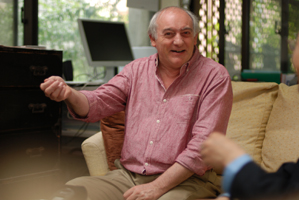 先日、生徒さんの一人がこんなことを言っていました。「先生は英語だけでなく、ビジネスのことまで教えてくれて、本当にありがとう」って。昔から、レッスンでは、英語だけではなくて、ビジネスについて生徒さんから聞かれることが本当に多いのです。それは、私が日本のことと外国のこと、その両方わかっているからなのだと思います。
先日、生徒さんの一人がこんなことを言っていました。「先生は英語だけでなく、ビジネスのことまで教えてくれて、本当にありがとう」って。昔から、レッスンでは、英語だけではなくて、ビジネスについて生徒さんから聞かれることが本当に多いのです。それは、私が日本のことと外国のこと、その両方わかっているからなのだと思います。
6ヶ月間のレッスンで生徒さんが手にした贈り物は ― ニッキー先生(勝どき) ETCマンツーマン英会話
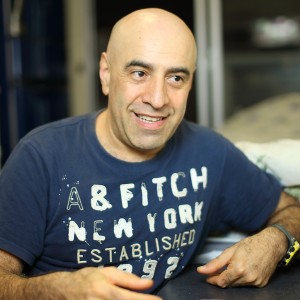
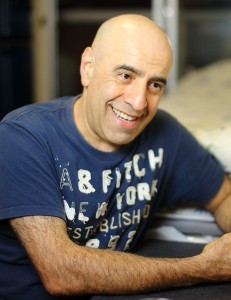 Q 先生には以前聾唖の生徒さんにレッスンを行っていただいたことがあります。
Q 先生には以前聾唖の生徒さんにレッスンを行っていただいたことがあります。
― それまで、学習障害、記憶障害などハンディキャップを持つ子どもたちにレッスンを行ってきましたが、聾唖の方にお教えするのは初めての経験でした。何よりも驚いたのは、その生徒さんが私の唇を完璧に読んで、英語で会話することができたことです。もちろん、耳が聞こえませんので、生徒さんの発音は不明瞭なところがありましたが、理解できるレベルだったため、何の問題もなくレッスンを行うことができました。
Q そうだったのですね。事務局はその生徒さんとは、ずっとファックスでのやり取りをしていました。先生がハンディキャップを持つお子さんにレッスンを始めるようになったきっかけはどのようなものだったのでしょうか?
― 先生というものは、多かれ少なかれ生徒さんのその後に人生に何らかの変化をもたらします。子どもたちにとって、そのような先生の存在は大切です。しかし、ハンディキャップを持つ子どもたちはそれ以上に先生の助けを必要としています。残念ながら、教師の多くはそのような生徒さんと積極的に係わりを持とうとはしません。係れば、係るほど、教師自身が精神的な負担を感じてしまうからのようです。しかし、私は彼らから必要とされていると感じましたし、私の能力を最大限発揮できると思いました。
Q そもそも、先生の子供クラスのレッスンには定評があります。
― 大学で児童心理学を学びましたので、子どもたちの精神構造が理解できるのです。現在ある学校で、2歳児ばかり14人の生徒に40分のレッスンを行っています。皆40分間、教室を走り回ったりせずに、ちゃんと椅子にすわっています。
Q いったいどうしたら、そのようなことが可能なのでしょうか?
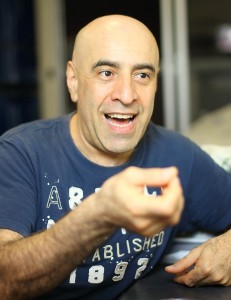
― 子どもたちが走り回る変わりに、私が走り回っているのです。(笑) 大切なのは、子どもたちの集中力をきらさないこと。子どもたちが集中できる時間はとても短いので、次から次へとトピックを変えて行きます。ボキャブラリーを学んでいたかと思ったら、突然発音の勉強。発音の勉強をしていたと思ったら、いつのまにかリスニングのトレーニングというように。また、常に子どもたちを楽しませること。楽しければ、子どもたちは飽きることはありません。
たとえば、アルファベットを教えるときも、最初はABC….と超高速で発音します。すると、私の言い方が可笑しいのか、子どもたちはゲラゲラ笑い始めます。「おや、ちょっと早かったかな。じゃあ、次はゆっくりと」と言って、今度はわざと超スローで、A…B…C…を発音して行きます。このスローモーションにも、子どもたちは大喜び。しかし、笑いながら子どたちは、早口の英語に耳がなれてきたり、スローな英語でしっかりと発音を学んでいるのです。
数字を教える時は、マグネットを使うのですが、「1」の次の「2」をわざと逆さまに貼り付けたりします。すると、子どもたちがいっせいに「逆さま!」と指摘してきます。「Oops, upside down?」(おっと、逆さま?)と、言って元にもどします。「3」は、「2」の隣に貼らずに、ボードの端に貼り付けます。これも、子どもたちから「そこじゃない!」と。「Sideways?」(端っこだった?)と、言ってこれも直してあげます。実は、この方法で子どもたちは数字だけでなく、upside down(逆さま)、sideways(端)というボキャブラリーも学んでいるのです。
Q 特に、ビジネス英語を学ばれる生徒さんには、そのニーズや目的にあったきめ細かいレッスンのカスタマイズが必要になってくると思います。先生のレッスンではいかがでしょうか。
 ― 以前、CAの方のレッスンを行ったことがあります。昇級試験があったそうですが、英語の機内アナウンスがうまくできずに落ちてしまったとのこと。アナウンス文をすべて書き出し、発音してもらいましたが、アクセントに問題がありました。私たちが良く耳にする離着陸のアナウンスは良いのですが、緊急着陸時のアナウンスがうまくいえませんでした。じっくりとレッスンを行い、半年後の再試験で見事合格、無事昇給することができました。
― 以前、CAの方のレッスンを行ったことがあります。昇級試験があったそうですが、英語の機内アナウンスがうまくできずに落ちてしまったとのこと。アナウンス文をすべて書き出し、発音してもらいましたが、アクセントに問題がありました。私たちが良く耳にする離着陸のアナウンスは良いのですが、緊急着陸時のアナウンスがうまくいえませんでした。じっくりとレッスンを行い、半年後の再試験で見事合格、無事昇給することができました。
そんな彼女に私はあるプレゼントをあげました。最初のレッスンで彼女がアナウンスを読んでいるとき、私は内緒で録音していたのです。贈り物はその録音テープです。彼女はあらためてそのテープを聴きながら、「私の発音ってこんなにひどかったの?!」と笑っていました。
Q 半年で自分の英語がどれほど上達したのかがわかるテープですね。先生が生徒さんに贈ったのは、実は、テープでなく、生徒さんの勉強に対するモチベーションだったのかもしません。
最後に先生の趣味についてお聞かせください。
― ドライブ、料理、映画鑑賞、旅行。海外は86カ国を旅しています。私はバンクーバーの出身ですが、20代のころにヨーロッパ、東南アジア中心に旅をしました。旅のエピソードは数え切れないほどあります。続きはぜひレッスンで。
[了]
掲載 15.4.3
※2022年4月に帰国予定となりました。
世界で最も英語を使っているのはノンネイティヴ・スピーカー – タニア先生(西早稲田) ETCマンツーマン英会話

 バングラディシュのダッカで生れました。ダッカはバングラディシュの首都。大学、学校、病院、様々な技術、モスク、ショッピングセンターなど、すべてのものが集まっている国際都市です。私が生れた頃は、もっと人口も少なく静かな場所でした。現在ではあらゆる国からあらゆる人々が集まり、インターナショナルスクール、国際大学、国際劇場なども作られています。とてもすてきな場所ですよ。食べ物もおいしいです。
バングラディシュのダッカで生れました。ダッカはバングラディシュの首都。大学、学校、病院、様々な技術、モスク、ショッピングセンターなど、すべてのものが集まっている国際都市です。私が生れた頃は、もっと人口も少なく静かな場所でした。現在ではあらゆる国からあらゆる人々が集まり、インターナショナルスクール、国際大学、国際劇場なども作られています。とてもすてきな場所ですよ。食べ物もおいしいです。
私が子どもの頃、インターナショナルスクールに通いました。そこを卒業して普通の学校にも5年通い、ダッカ大学に入学しました。ダッカ大学はとても名声の高い大学で、英国のオックスフォード大学とも並び賞されています。
Q: 英語の先生になった理由をお聞かせください。
バングラディシュでは、高校の卒業試験が国家試験となっています。その国家試験の結果50%と大学入学試験50%で、大学での専門が決まります。ダッカ大学の英語教育学科に合格するためには、80点以上を取らなければなりませんでした。80点といっても日本の大学の試験とは比較にならない難しい試験です。 私の時代で同科に応募した学生数は約12000人、その内合格したのは65人だけでした。
最終的に英語教師になることを決めたのは、次世代の学生達のロールモデル、お手本になれると思ったからです。本来バングラディシュ人にとって外国語である英語で先生になり、日本の大学で教えている私の姿を見て、学生たちは自信を持つことができているのです。外国語学習に対するモチベーションも非常に上がっています。ですから、これからも英語の先生を続けて行きたいと思っています。
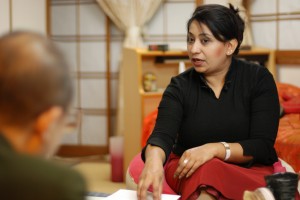
Q:授業で英会話を学んでも、実社会に出て相手の話している英語が分からず、ショックを受ける生徒さんが多いようです。このようなPractical Englishを理解できるようになるために、何か良いアドバイスはありませんか。
それは日本の英語教育制度に問題があると思います。
一番大きな問題は、英語を話すのは白人だと思っていることです。でも、世界で最も英語を使っているのは、ノンネイティヴ・スピーカーなのです。たとえば、学者の社会はほとんどがノンネイティヴ・スピーカーです。 宇宙工学の世界でも、40%がインド人です。でも、日本の教育システムが白人英語中心で作られているので、私たちのようなノンネイティブ・スピーカーの英語が分からなくなってしまっている。たとえば、日本の学校に行くと、私たちが実社会ではがほとんど使わない英語で話しているヒヤリング教材を使っているのを知り驚くことがあります。また、アメリカン人といっても、フランス系のアメリカ人、ノルウェー系のアメリカ人、バングラディッシュ系のアメリカ人がいて、それぞれの発音があります。今の日本の英語教育では、その様な英語が理解できないのです。

私はバングラディシュから来て、現在7箇所の日本の大学で教えています。 これは、私の話している英語が、いわゆるネイティブ・スピーカーの英語とは違う、本来の英語、オリジナルの英語だからなのです。日本の大学では、それを学生に教えたいと考えるようになってきたのです。アフリカの英語、ミヤンマーの英語、サウジアラビアの英語、日本人の英語、中国人の英語、色々な国の英語がわからないと実社会ではコミュニケーションができない。そのためには私の話す本来の英語を習得しておく必要があります。実社会はネイティブスピーカーの世界ではありません。英語は皆の言葉です。それが分からないと、このPractical Englishは分からないと思います。
[了]
※最寄り駅は東西線早稲田徒歩5分、メトロ副都心線西早稲田は徒歩7分です。
She is an Associate Professor of Sociolinguitics at Waseda University, Tokyo, Japan. She is a native of Dhaka, Bangladesh. She holds a doctorate degree from International Christian University, Tokyo, Japan.
Her seminar examines English language issues at societal and global levels. It discusses the historical context of the global development of English, status of English as a first and second language, and issues involving English that are currently developing in and across diverse societies. This seminar will help students to understand the educational systems, successes, and problems of different countries. It will also show how education creates inequalities in the society.
One global issue is the policy prescription that guides the delivery of education in school systems in developing nations. She has been actively involved in education for about a decade. She earned a doctoral degree in the Division of Education at International Christian University (ICU). Her thesis: “English language education in Asia: Issues of policy, ideology, curricula and equality of opportunity for learners.” In that study, she investigated the development and implementation of education policy. Her case study focused on the differences between classes and curricula in rural and urban schools, as well as between the Bengali-medium and English-medium schools. Her analyses include the formal and non-formal education systems in Bangladesh. Throughout her career, she has been knee-deep in discussions on a slew of challenging issues in Asia. She is a member of the Japanese Society of Language Sciences, and follow educational issues in Asia around the world.
Prior coming to Waseda University, she worked at Dokkyo University as a lecturer. At the same time, she worked at several universities in Tokyo as a part-time lecturer. She also worked at the United Nations University Institute of Advanced Studies (UNU-IAS) as an intern. She also served as an assistant language teacher in several elementary schools in Mitaka, Tokyo
She is a multilingual person. She knows Bangla, English, Japanese, Hindi and Urdu. Along with teaching, she works as an interpreter and translator nationally and globally. She is a travel writer, poet and a novelist. Among her works Neel, Holud Valobasa, Jana Na Jana Pother has drawn noticeable popularity.
人生を深めるために外国語を コリン先生(松本) ETCマンツーマン英会話
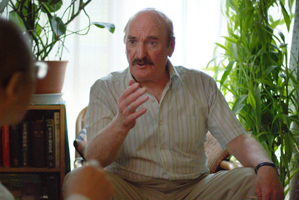
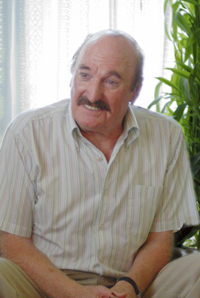 Q: お生まれはどちらですか?
Q: お生まれはどちらですか?
イングランドのヨークシャー、リーズ市で生れました。リーズは同地域の主要都市、人口は約75万人程。繊維、工業、そして印刷の街です。ヨークシャー・ウールは世界でもっとも上質な生地の一つで、様々なスーツに使われています。ただ、私はヨークシャーにはそれほど長く住んだことがありません。時々帰省していますが、現在も父が私の兄弟と共に住んでいます。
I was born in Leeds Yorkshire Capital City of Yorkshire. It has population of about 750,000, Its main industries are clothing, engineering and printing. Most suites made in Savile Row, London are made with Yorkshire cloth. I haven’t lived there for many years, but I occasionally go home to visit my father and brothers who still live there
日本に来たのは1982年、28年間住んでいます。スペインで出逢った現在の妻に再会するために来日しました。そして結婚することになり、日本に住むことになりました。
以来、ずっと目白に住んでいます。だから、目白ボーイです。
II’ve lived in Japan 28 years now. I came in 1982. The reason I came was I met my wife in Spain, and I came to see her, after while I decided to stay and we married. I have always lived in Mejiro, I think I am a Mejiro boy.
Q:どんな趣味をお持ちですか?
趣味はガーデニング。ラグビー観戦。もう何十年も前のことになりますが、私もラグビーをやっていました。娘が小さい頃から、ヨーロッパやアジアなど、色々な国に連れて行きました。他の国の人々に対する理解を深め、より良い人間になってもらいたいからです。私たちの人生において大切にしていることです。
My hobbies are gardening, watching rugby and travelling. Now I enjoy watching rugby, many, many years ago I played. We have a daughter and from a very early age we started taking her on overseas travel. She has had opportunity to visit many countries in Europe and Asia. We wanted her to have a chance to see her people live and get to understand the many different cultures. This, I think, has made us all better people.
読書も好きです。通常はアクションものが好きですが、源氏物語は二回読みました。
I enjoy reading action stories, but also enjoy books such as the Tails of Genji. I’ve read it twice, and many others.
Q:ご職業は何ですか?
英語の教師です。ずっと教育に携ってきています。東芝、リコー、NTT、日立、JGC、日揮等など、著名な企業を数多く教えてきています。専門学校で12年、高校でも2年教えました。
I have taught at many famous companies in Japan such as Toshiba, Ricoh, NTT, Hitachi, JGC, Nicki Corporation. 12 years at Senmon Gakko and two years at high school.
Q: マンツーマンのレッスンではどのような点に重点を置くのでしょうか?
プライベートレッスンの場合は、生徒さんが何のために英語を必要としているのかという点に重点を置きます。一般的な会話を学びたいのか、旅行に行くためなのか、試験もしくは仕事で英語が必要なのか。就職のためにTOEIC受験が必要な方もいます。生徒さんの目的にあわせて私は教えています。
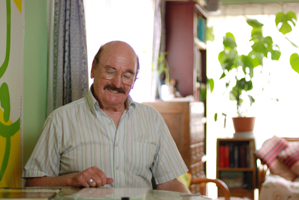 When teaching the most important thing is with private lesson to find out what they need it for, social, travel, hobby, exams or business. Some need TOEIC for job employment so what they need is to receive, isn’t it?
When teaching the most important thing is with private lesson to find out what they need it for, social, travel, hobby, exams or business. Some need TOEIC for job employment so what they need is to receive, isn’t it?
生徒さんがイディオムを覚えることもまた大切ですね。食べ物、数字、身体の部位名、動物、地理、遊び、に関する単語を使ったイディオムについて紹介している本を使います。たとえば、こんなイディオムです。
I also feel to give student a use in idioms is important. I use a book which has group idioms, example food, numbers, body parts, animals, geography, recreation for example,
busy as bees, (非常に忙しい、たいへん活動的で、よく働く) fit as fiddle, (元気で, ぴんぴんして) good as gold, ((子どもが)とてもおとなしくて) happy as a lark, (楽しい) hard as nails, (無慈悲な、毅然とした、実に強健な.) hungry as a bear, (とてもおなかの空いた) regular as clockwork, (規則正しい.) sick as a dog, (とても気分が悪い) stubborn as a mule, (どうしようもなく頑固な,まったく言うことを聞かない) weak as a kitten, (弱虫な)
イディオムを学ぶと、一つの単語は複数の意味を持っていることがわかります。このことは生徒さんの語彙力を増やすことになります。ただ、初級レベルに生徒さんが、あまり多用すると混乱することもあります。幾つか覚えて、実際に使えるようになるといいですね。でも、例えば「sick as a dog」は、男性的な表現です。女性が使う言葉としては、上品さに欠けています。
Idioms give students a chance that a word has more than one meaning, so it expands their vocabulary. Too many idioms would confuse low level students. But to master a few gives pleasure. “Sick as a dog” is not really lady’s talk. It is unrefined for ladies speech.
 ネイティブスピーカーに英語を学ぶのは、多くの生徒さんが週に一回だけ、趣味の方もいらっしゃいますが、それでも文化を学び、外国の人々の考え方を知ることはとても大切なことですね。
ネイティブスピーカーに英語を学ぶのは、多くの生徒さんが週に一回だけ、趣味の方もいらっしゃいますが、それでも文化を学び、外国の人々の考え方を知ることはとても大切なことですね。
Although most people only study once a week like a hobby with a native speaker, you will lean a culture and inside to foreigner view.
※2012年4月に松本へ引越。
2016年1月逝去されました。謹んで哀悼の意を表します。
☆コリン先生出演のRadioETC
◎BBCコメディー『Only Fools And Horses』を見ながら
▽コックニーって何?~Bow Bellsの音が聴こえますか?
▽コックニーの特徴~H-dropping
▽リージェント・ストリートとオックスフォードストリートの違い
▽Don’t split hairs” の意味は
▽“The girls wouldn’t touch him with 10 foot barge poles.” の意味は?
▽“purple heart”の意味は?
▽“milk monitor”の意味は?
▽“swing it”の意味は
▽“Are you putting me on?”の意味は
▽“Your bottle is gone”の意味は?
▽“immaculate”の意味は?
▽“fed up”の意味は?
▽“Let’s call it a day!”の意味は?
親しい仲間が作れる英語 – エイドリアン先生(カナダ在住)

 (*)2012年9月カナダへ引越
(*)2012年9月カナダへ引越
Q:横浜には何年お住まいですか?
横浜には合計で15年間住んでいました。みなとみらいで生まれ、15歳の時にハワイに引っ越しました。
I have been here for total about 15 years. I was born here, in Minato-Mirai, and when I was 15 years old, I switched to Hawaii.
Q: 日本語がお上手ですね。バイリンガルなのですね?
(ここから先生は日本語で)
トリリンガルです。5歳の時に初めてパリでフランス語を習いました。フランス人の父は私がフランス語を学ぶことを強く望んだのです。次に日本語、その後に英語を習いました。
Q:英語を教えるようになったきっかけは?
15歳の時に、ちょうどこのビルの隣にある教会で子どもたちのグループにボランティアで教えたのがきっかけです。その後、家庭教師をやるようになり、英語、フランス語、そして算数まで。気がついたら全科目を教えていました。
生徒さんが「やっとわかった。よかった」という表情をする瞬間が好きでした。教えている自分もとても嬉しかった。教える喜びを知ったのです。
Q:現在はどのようなレッスンをされているのですか?
生徒さん毎に独自のレッスンプランを作成して行っています。例えば、社会人の方には、英語でのプレゼンテーションのレッスンを行っています。
プレゼンテーションで大切なことは、話し手の自信を伝えること。そのためには、言葉遣いだけではなく、目線も大事ですし、顔の動かし方、立ち方、手の使い方も大切です。全身を使って、相手にどのようにインパクトを与えていくかを指導しています。
 Q:日本人が特に気をつけたほうがよいボディーランゲージはあります。
Q:日本人が特に気をつけたほうがよいボディーランゲージはあります。
多すぎるくらいあります。たとえば、日本人は常に小さなお辞儀の仕草をしますね。身体に染み付いているのでしょう。「はい。はい。そうですね。」等と言うのと同時に、オートマティックにペコペコ上体を倒す仕草をしてしまいます。日本人どうしであれば違和感のないことなのかも知れませんが、外国人には不思議な動作に見えます。
また、必要以上に照れる日本人が多いと思います。手は後ろに組んで、リラックスして、背筋を伸ばし、堂々とした態度で話すことで、よりプロフェッショナルに見えるでしょう。
Q: 「よろしくおねがいします」にあたる英語はないのでしょうか。
初対面の人に会った時に言う「よろしくおねがいします」は、英語では
”nice to meet you.”
くらいでしょうか。
フランス語には、「あなたとお近づきになれて大変うれしく思います」という意味で、
“Ravi de faire votre connaissance.”
という言い方がありますは、これは企業の社長など立場が非常に上の方に対して使う表現で、同等の立場の人に対しては使いません。
Q よく日本人の英語は丁寧すぎると言われます。
日本人はフォーマルで堅苦しい表現を使う傾向があります。また、文法的な正しさを気にしすぎるため、場面によっては浮いた表現なってしまうこともあります。
以前、二十代後半で米国に留学予定のある獣医さんにレッスンをしたことがあります。彼には患者さんに対する時の表現と、同僚であるドクターどうしで会話する際の表現の違いを教えました。日常会話であっても、相手や状況によって英語表現を変えていったほうがよいのです。
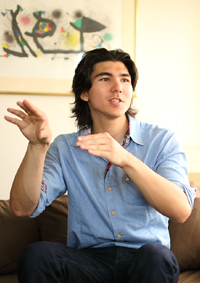 例えば、患者さんに対する時は、
例えば、患者さんに対する時は、
I am sorry to inform you… (申し訳ありませんが、こうなりました。。。)
と丁寧な表現を使います。
一方、同僚との挨拶等では、
Hey, how are you doing? What’s up man? What are you up to?
等など、若い人たちがよく使うフレンドリーな挨拶をしたほうが、仲間づきあいが上手く行くでしょう。
これは、私自身が日本語、英語、そしてフランス語を習ってきて感じたことです。日本語のテキストの表現は、そのまま会話で使用してもおかしくはありません。しかし、英語とフランス語は、特に話し言葉の場合は、テキストの表現と実際に使われる言葉が大きく異なるのです。
使われない言葉を習っても意味がありません。テキストから離れて、実際に使われる英語、使える英語、そしてたくさんの親しい仲間が作れる英語をお教えしたいと思います。
[了]
聞いたら真似て耳を慣らす モナ先生(米国在住) ETCマンツーマン英会話

<<休止・帰国された先生のページです>>
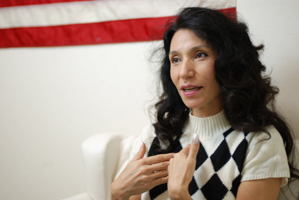
Q: ご出身は米国のラスベガス。でも、流暢な日本語を話されますね。バイリンガルになられたのはいつ頃からですか?
小さい頃からです。一ドルが360円の時代がありましたね。あの時代に母が来日して、最初の4年間は本牧の近くに住んでいました。兄達はアメリカンスクールに入学したのですが、私だけ日本の学校に入りました。学校のお友達とは日本語で話し、家族とは英語で話していたので、兄弟の中で私だけがバイリンガルになったのです。でも、兄達は横浜で暮したこともあって、英語を喋っていても、いまだに「ナイスじゃん」なん言ってしまうことがよくあるんですよ。
Q: ラスベガスと日本と故郷が二つある感じですね。小さい頃の思い出は、どちらの印象が強いですか?
4年間日本にいた時、同じ小学校に通っていたお友達が、3年前に私を探しあててくれたのです。それからまた交流が始まり、毎年クラス会で会うようになりました。その学校での友達は、私の心の中で大事な大事な人たちで、素晴らしい思い出でした。あの時期、日本に住んでいたアメリカ人はとても少なかったのでしょう。私は凄く珍しがられましたし、凄くいじめられました。でも、今はその時のお友達が、凄く大事な良いお友達になっているのです。
Q: 昔からのお友達は大切ですね
レッスンでも新しい生徒さんが来らた時には、まず自分と家族の紹介、趣味、そしてベストフレンドの話をするようにしているんです。
Q: フレーズや発音だけでなく、イントネーションにも力をいれて教えられていますね
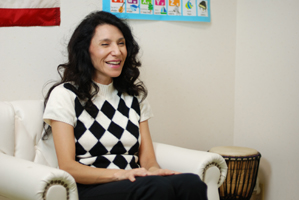 英語を話す時に、「どこで上がる」、「どこで下がる」、「どこで切る」、「どこを強める」ということを修得することができたら、凄く話せる人だとネイティブスピーカーに思われるくらいに英語が上手に聞こえます。ですから、私が英文を読む時には、この「上がる、下がる、切る、強める」ところを、生徒さんに必ずチェックしてもらっています。日本語自体が平坦なので、イントネーションを付けて話すのが苦手な生徒さんが多いですね。思い切り、アップダウンをつけて、大きな声で喋ること。最初は恥ずかしいけれど、聞いている方は聞きやすいものです。
英語を話す時に、「どこで上がる」、「どこで下がる」、「どこで切る」、「どこを強める」ということを修得することができたら、凄く話せる人だとネイティブスピーカーに思われるくらいに英語が上手に聞こえます。ですから、私が英文を読む時には、この「上がる、下がる、切る、強める」ところを、生徒さんに必ずチェックしてもらっています。日本語自体が平坦なので、イントネーションを付けて話すのが苦手な生徒さんが多いですね。思い切り、アップダウンをつけて、大きな声で喋ること。最初は恥ずかしいけれど、聞いている方は聞きやすいものです。
また、こんな例もあります。
[Is] there a problem?
と言うように”Is”を強くすると、「大丈夫ですか?」と、相手の状況を気遣っているような意味合いになりますが、
Is [there] a problem?
のように、[there]を強くすると、「問題でもあるの?」というように、高飛車な印象を与えてしまうことがあります。ですから、生徒さんには、[Is] there a problem? と、[Is]を強くする方を使うように言っています。
Q: このようなマンツーマンの英会話レッスンだけでなく、日常生活の中でも、英語を学んでゆく方法はありますか?
それに関しては、私のイギリスでの体験を生徒さんにお話ししているんです。私が通訳の仕事で初めてイギリスに行った時のことです。イギリスのアクセントが全く聞き取れなかったのです。
イギリスでの最初の仕事は、皆さんの定期券を買って来る事でした。「お安い御用」なんていう気持ちで駅に買いに行ったら、もう何を言っているのか本当に分からない。最初は「これフランス語?」と思ってしまうくらいでした。とりあえず「OK」と言って買って来たんですが、その夜からパニックでした。他の皆さんは、ミーティングが終わって、食後に踊りに行ったり、飲みに行ったりしているところを、私だけは部屋に戻って、一人でイギリスのアクセントの勉強をしたんです。
Q: お一人でどんなふうに勉強をされたんですか?
例えば、”culture center”。イギリスでは”culture centre” と言うスペルになる。発音も、アメリカの ”er”の “r”の音が無いんです。アメリカ英語が” center”(センタァー)というような発音するのに対して、イギリス英語は”centre”(セントゥー)のようになる。このようなイギリス英語に自分の耳を慣らせるために、その日耳にしたイギリス英語を、アクセントも一生懸命真似て、何度も何度も声に出して言ったのです。すると、三日目になったところで、今度は面白いくらいにイギリス英語が話せるようになったのです。もう絶好調でした。嬉しくなって、友達に電話して「私、今イギリス英語しゃべってるの」と自慢したぐらいでした。
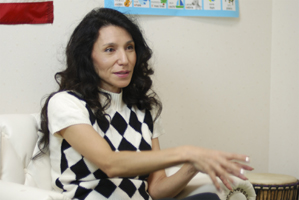 生徒さんには必ずこの私の体験談をお話しします。そして、たとえばテレビのニュースで “Today’s weather is partially sunny.” と言っていたとします。これが全て聞き取れなくても、”Today’s ララララララ sunny” でもいいから真似をして、声を出して言ってみる。すると、何かの瞬間に、”Today’s” の次に来る ”weather”という単語が、何かぱっと弾けるみたいに、分かる時が来るのです。私の経験がそうでした。ですから、「聞いたら真似る」ということを皆さんに言っているんです。耳を慣らすことができたら、面白くらいに喋れるようになるんです。
生徒さんには必ずこの私の体験談をお話しします。そして、たとえばテレビのニュースで “Today’s weather is partially sunny.” と言っていたとします。これが全て聞き取れなくても、”Today’s ララララララ sunny” でもいいから真似をして、声を出して言ってみる。すると、何かの瞬間に、”Today’s” の次に来る ”weather”という単語が、何かぱっと弾けるみたいに、分かる時が来るのです。私の経験がそうでした。ですから、「聞いたら真似る」ということを皆さんに言っているんです。耳を慣らすことができたら、面白くらいに喋れるようになるんです。
Q: 先生自身が英語で苦労された経験があるからこそできるアドバイスですね。
そうですね。また、私は英語と日本語、両方の意味がわかるので、教え方で少し得をすることがあります。たとえば、日本語のハンサム。これは、英語では、hand(手)にsome(少し)しかのらない特別なもの、と言う意味なのです。ですから、男性だけに使うのではなく、格好いいシャツだったら、「ハンサムなシャツ」(handsome shirt)というふうにも使えるんです。
☆モナ先生出演のRadioETC
生徒さんは10~60代。幅広い話題で英会話 ロクサーヌ先生(西麻布) ETCマンツーマン英会話

 (*)2012年6月オーストラリアへ引越
(*)2012年6月オーストラリアへ引越
Q: お生まれはどちらですか?
オーストラリアのニューサウスウェールズ州のべガです。Bega Cheese で有名です。19歳まで住んでいました。結婚後は夫の仕事の関係で、イギリス、アメリカ、そして日本と転勤を続けています。日本には合計で10年間住んでいることになります。
Q: お仕事は何をされていたのですか?
ヘアドレッシングやメークアップなどを学ぶ美容専門学校で教えていました。そこで教えた経験が、現在の英会話レッスンに生かされていると思います。
Q: マンツーマンのレッスンでは生徒さん毎に内容をカスタマイズされているのですか?
もちろんです。現在教えている生徒さんは10歳から60代まで。英語を学ぶ目的も興味ある話題も様々。政治、気候、食事、音楽、などなど幅広い。例えば、今度オーストラリアに行く15歳の彼のレッスンでは、彼のお気に入りの音楽の話題になった時に、私も話しができるように、”FUNKY MONKEY BABYS”の楽曲や活動内容について事前にチェックしたりしているんです。
また、生徒さんがレッスンのために選んでいらっしゃる英文記事もとても興味深いですね。私自身がレッスンを通して日本のことについて学ぶ機会にもなって、実はとても感謝しているのです。それにしてもETCさんの生徒さんは素敵な方ばかりですね。どうしてですか?

趣味はアートです。私自身は墨絵を描いています。入り口にあった絵をご覧になりましたか?いくつかは私自身が描いたものです。日本に来るまで、墨絵についてはほとんど知識がありませんでした。全て日本に来てから学び、描いたものです。
Q: 日本人の芸術家で好きな方はいらっしゃいますか?
篠田桃紅さんの作品が好きです。でも、日本人で彼女の作品をご存知ない方が多いですね。
Q: 英会話の勉強において日本人に共通する問題は何でしょうか?
“confidence” 皆さん、自信をもって英語を話すことができずに、苦労されていますね。
Q: その自信はどのように修得するこができるのでしょうか?
 とても難しい課題だと思いますが、やはり”practice”しかないと思います。
とても難しい課題だと思いますが、やはり”practice”しかないと思います。
こんな例があります。私の娘は、私たちと共に日本に住んでいて、私よりも流暢な日本語を話していました。ところが、2年間のアメリカ生活を終えて、日本に戻ってきた時、彼女は日本語をすっかりわすれていたのです。あんなに上手に話していたのに。私の日本語もまだまですが、でも今では娘より話すことができます。やはり、毎日少しでも外国語に接し、その能力を保つことが、語学の上達にはなによりも大切なことだと思います。
Q: オーストラリア英語とアメリカやイギリスの英語は違うのですか
もちろんです。オーストラリア独特の口語表現がありますし、発音、イントネーション、単語などいろいろな違いがあります。オーストラリア英語の表現でよく知られているのは、
G’Day ! (Good day!)= こんにちは、See ya (see you) = またね、No sweat! (Don’t worry) = 心配いらない、などの言い方がありますね。
 オーストラリア英語用の辞書(『Macquarie Dictionary』)もあります。例えば、”He is a larrikin.”と言ったりしますが、”larrikin”は、この辞書によれば、”mischievous young person”(行動の好ましくない若者)と記載されています。
オーストラリア英語用の辞書(『Macquarie Dictionary』)もあります。例えば、”He is a larrikin.”と言ったりしますが、”larrikin”は、この辞書によれば、”mischievous young person”(行動の好ましくない若者)と記載されています。
Q: 古い映画ですが『クロコダイルダンディー』の主人公が話す英語は?
彼のような英語を話す人を”ocker”と言います。典型的なオーストラリア訛りの英語を話す人のことです。肉体労働者系の方に、彼の様な英語を話す方が多くいらっしゃいます。
英語は、社会や国によっても本当に様々な違いありますね。私の夫は、イギリスのヨークシャー出身なのですが、時々私にとって何の意味を持たない単語を使ったします。例えば、手がべたべたしてくることを英語では、”sticky”と言いますが、彼は”clarty”と言ったりするんです。ヨークシャー独特の方言なんでしょうね。
 私自身は、できるだけニュートラルな英語をレッスンでは話すように努めています。
私自身は、できるだけニュートラルな英語をレッスンでは話すように努めています。
Q: はい、とても分かりやすいです。
ありがとうございます。
でも、私がオーストラリアにいるときに話している英語を聞いたら、きっと今とはかなり違っていると思いますよ。
商談の英語力は実践的ロールプレーで ジェンマ先生(代官山) ETCマンツーマン英会話

 (*)2012年9月ロンドンへ引越
(*)2012年9月ロンドンへ引越
Q: お生まれはどちらですか?
ロンドンの郊外にある、ハートフォードシャーのセント・オルバンズという町で生れました。古代ローマ時代の町として有名で、深い歴史を持ち、大聖堂などがあるとても綺麗なところです。私は、母がフィリピン人で父はイギリス人のハーフです。生れ育ったのはイギリス。弟がいます。18歳までその町でくらし、大学進学のためにロンドンに越しました。
I am from a town called St Albans. It’ a city in Hertfordshire, which is the outside of London. It’s basically famous for Roman time. So it’s got lots of history and big cathedral and it’s very pretty. So I was brought up a multiracial house actually. So my mother’s from Philippines and my father’s English. But obviously I was born in England. And I was brought up Britain. And I have one younger brother and stay there until about 18. And I went to the university near to London.
Q: 英語の先生になられた理由は?
私は、セールスとマーケティングに関して豊富な経験を持っています。直近ではロンドンで広告の仕事にも携っていました。これらのスキルがビジネスの世界で活躍する生徒さんの役に立つことが分かったのです。また、約一年間日本航空等でフライト・アテンダントとして働いたこともあります。 その経験からカスタマーサービスについても理解を深めることができました。おかげで、日本人の文化についてよく知ることができましたし、生徒さんに心地よく学んでもらい、自信を付けてもらうことも、私は得意だ思うのです。
So I have lots of sales and marketing experience. And I went to advertising most recently in London. And I have found and through doing teaching I can use those skills to help students and business sector responses. I also was a flight attendant for Japan Airline and other airline company for about one year, which will help with the customer service. I mean that I have good understanding of Japanese culture. And I think. am good at making people feel comfortable and confident so that I can to courage them really.
 Q: TEFL(teaching English as a foreign language)の資格も取得されたんですね。
Q: TEFL(teaching English as a foreign language)の資格も取得されたんですね。
はい、取得しました。英文法の教授法など基本的な事柄は理解できています。でも、英語を教える際に最も大切なのは、会話すること、できるだけ多くのロールプレーを行うこと、実際の場面を想定しながら、お互いの役を決めて、実際に近い形で会話することだと思います。
Yeah, I have basic understanding of grammar. And I think if you are teaching English, the most important thing is conversation, role-play as much as possible.
例えば、「ビジネスの交渉においてもっと自信を付けたい」という生徒さんがいらっしゃいました。そこで、私は生徒さんが実際に扱っている商品について調べ、その商談のためのロールプレーを創ってみました。アメリカの取引先と商談で実際に使われそうな英語の言い回しを使った、とてもリアルなものでした。セールスマーケティングに関しては豊富な経験を持っていますので、たくさんの異なった種類のロールプレーにも私は対応可能です。
I have had an example, one student said “within business situation I want to be more confident in negotiating”, so I created the role-play and learned about the custom products and we had a role and sales conversation. And I would give them natural English so that when they are meeting with American client. they would be able to say real, real English, real conversation that others would understand. So I can do lots of different role-play to suite the situations.
Q: ところで、映画『それでも恋するバルセロナ』に出演したのイギリス人女優、レベッカ・ホールは映画ではアメリカ人のアクセントで英語を話していました。イギリス人の方が、アメリカ人のアクセントで話すのは、簡単なことなのですか?
 そう思います。ハリウッドなどでは多くのイギリス人女優がアメリカ人アクセントで話しているので、イギリス人だと気付かれないこともあります。映画『タイタニック』の女優ケイト・ウィンスレットはご存知ですよね。彼女はイギリス人なのですが、通常はアメリカ人のアクセントで話しています。でも、アメリカ人が他の国のアクセントで話すということは、通常ではあまりないですね。
そう思います。ハリウッドなどでは多くのイギリス人女優がアメリカ人アクセントで話しているので、イギリス人だと気付かれないこともあります。映画『タイタニック』の女優ケイト・ウィンスレットはご存知ですよね。彼女はイギリス人なのですが、通常はアメリカ人のアクセントで話しています。でも、アメリカ人が他の国のアクセントで話すということは、通常ではあまりないですね。
I think so. There’re many actresses do that, because a lot of English actresses like in Hollywood, and then you wouldn’t realize that there actually English, because they are speaking American. Have you seen Titanic? You know Kate Winslet? She’s English, but she’s always speaking American. It’s more unusual for Americans to change to the different accent.
Q: 日本人がイギリス人に共通点を感じるとしたらどんなところでしょうか?
こんな例があります。あるビジネス英語のテキストを使って授業を行っていたときの話しです。日本人の方はとてもつつましやかですから、自分の上司がこんなふうな話し方をするのを聴くことは、まずないと思うのです。「でかしたぞ。最高の仕事をしたね。君は一番だよ!
(Oh, well done! You did a great job! You are the best!)」 And, for example, I was teaching this student from a book. It’s all about in a business situation. In Japan you are more humble, it would be rare for you to hear your boss to say, “Oh, well done! You did a great job! You are the best!”
 私が「実際イギリス人はこんな言い方はしないと思いますよ」と言うと、生徒さんも、「日本人もしません」とおっしゃっていました。これはアメリカ人の教科書ですからね。私だったら「よくやったわね。あなたの努力のおかげですよ。(well done. Thanks for your hard work.)」ぐらいの言い方になると思いますが、この教科書のような言い方は決してしないですね。(イギリス人にとっては)不自然な表現になってしまいます。おそらく、ビジネスの面において、イギリスと日本はより類似点が多いと思うのです。文化的に近しいことがらが多いですよね。
私が「実際イギリス人はこんな言い方はしないと思いますよ」と言うと、生徒さんも、「日本人もしません」とおっしゃっていました。これはアメリカ人の教科書ですからね。私だったら「よくやったわね。あなたの努力のおかげですよ。(well done. Thanks for your hard work.)」ぐらいの言い方になると思いますが、この教科書のような言い方は決してしないですね。(イギリス人にとっては)不自然な表現になってしまいます。おそらく、ビジネスの面において、イギリスと日本はより類似点が多いと思うのです。文化的に近しいことがらが多いですよね。
So I was teaching this text to a businessman, and I said to him “actually I wouldn’t do that in England”. He said “we wouldn’t do it Japan”, because this is the American textbook. I would just say, “well done. Thanks for your hard work.” But in this book, it was “Great job. You are the best!” I never ever speak like that. I just can imagine Japanese person do neither. That’s not natural. So I think at business point of view, maybe there are more similarities between English and Japanese.Do you see what I mean? Cultural similarity.
☆ジェンマ先生出演のRadioETC
母として子に望むこと ジョアン先生(米国在住) ETCマンツーマン英会話
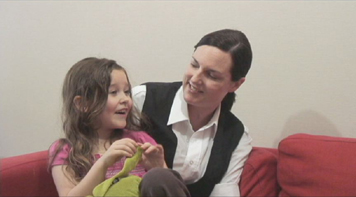
<<休止・帰国された先生のページです>>
 Q: お生まれはどちらですか?
Q: お生まれはどちらですか?
Q: Where were you born?
ワシントン州、シアトルの北に約一時間ほど行ったところにある小さな島で生れました。人口15000人ほどのとても小さな所です。 I was born in Seattle, Washington, the small island north about 1 hour about 15000 people. Yes, Very small.
Q: 生れ故郷についてもう少しお話しを聞かせてください。
Q: Please tell us more about your hometown.
 夏になると沢山の旅行者が訪れるとても楽しい場所です。一方、冬はとても静かになります。夏の間は水上スキー、鮭釣りなどのためにやってくる人々で町はいっぱいです。蟹も有名です。ダンジェラス蟹と呼ばれていますが、日本にも似た種類の蟹がいると思います。(ワタリ蟹)とてもおいしいですよ。 My hometown is very interesting, because it is many tourists and many people come for the summer. So in the winter, it can be very quite. And in the summer it is full of people with boarding activities and water skiing, fishing for salmon and we have a crab called Dungeness crab, very famous crab, maybe something similar is here in Japan, very beautiful crab, delicious.
夏になると沢山の旅行者が訪れるとても楽しい場所です。一方、冬はとても静かになります。夏の間は水上スキー、鮭釣りなどのためにやってくる人々で町はいっぱいです。蟹も有名です。ダンジェラス蟹と呼ばれていますが、日本にも似た種類の蟹がいると思います。(ワタリ蟹)とてもおいしいですよ。 My hometown is very interesting, because it is many tourists and many people come for the summer. So in the winter, it can be very quite. And in the summer it is full of people with boarding activities and water skiing, fishing for salmon and we have a crab called Dungeness crab, very famous crab, maybe something similar is here in Japan, very beautiful crab, delicious.
Q: 日本にはどのくらいお住まいですか?
Q: How long have you lived in Japan?
一年を超えたところです。 We have lived in Japan over one year now.
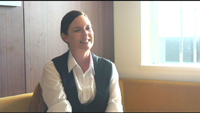 Q: 日本の滞在の目的は?
Q: 日本の滞在の目的は?
Q: What is your porpoise .of staying in Japan.
主人の仕事の関係です。 My husband’s job.
Q: 先生のご職業は?
Q: What is your occupation?
私の仕事は、母親、そして英語の先生です。 My occupation is mother and English teacher.
Q: お仕事の経歴をお聞きしてもよいですか?
Q: May I ask your job history?
17年間キャビン・アテンダントとして働いていました。また、ニューヨークでアートの販売をしていました。エルミタージュ美術館のロシアの芸術家達をニューヨークで紹介したこもあります。とても大きなアートショーでした。 I was a flight attendant, airhostess for 17 years. And I also sold arts in New York City. And we did the first art show to the Russian mission to the United Nations, where we brought Russian artists from a hermitage museum to the United States and they traveled over the U.S. and then stopped at New York. We had a big art show.
Q: 日本に来て最も大変だったことはどのようなことですか?
Q: What was the most difficult thing when you came to start to live in Japan
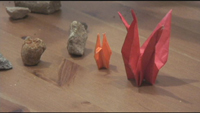 一番大変だったのは、娘をどこの学校に行かせるかということでした。私は彼女を日本の公立学校にいかせたかったのです。もし彼女がインターナショナルスクールに行ったとしたら、アメリカで生活しているのと何の変わりもなくなってしまいます。英語を学び、英語を話す子ども達と遊ぶわけですから。でも、多くの人たちが日本の学校に行くのは難しいと言われました。ですから、彼女が現在の学校に入学できたことは本当に幸運です。先生だけでなく、皆すばらしい人達ばかりです。また、その学校には外国の子ども達もたくさん来ているので、私たちが特別だと感じることはありません。 I think the hardest thing is deciding where my daughter will go to school. That was so difficult, because I wanted her to go to Japanese school. But so many people said no, you cannot do that in Japan. And I said I want to try to have her go to publish school. Because, if she went to the international school, it will be the same. Right? She will learn English, play with English speaking kids. So it will be no different. So we have been so fortunate to go to this school, because not only is the teacher than everybody so great. There are many children from other countries. So we don’t feel so different.
一番大変だったのは、娘をどこの学校に行かせるかということでした。私は彼女を日本の公立学校にいかせたかったのです。もし彼女がインターナショナルスクールに行ったとしたら、アメリカで生活しているのと何の変わりもなくなってしまいます。英語を学び、英語を話す子ども達と遊ぶわけですから。でも、多くの人たちが日本の学校に行くのは難しいと言われました。ですから、彼女が現在の学校に入学できたことは本当に幸運です。先生だけでなく、皆すばらしい人達ばかりです。また、その学校には外国の子ども達もたくさん来ているので、私たちが特別だと感じることはありません。 I think the hardest thing is deciding where my daughter will go to school. That was so difficult, because I wanted her to go to Japanese school. But so many people said no, you cannot do that in Japan. And I said I want to try to have her go to publish school. Because, if she went to the international school, it will be the same. Right? She will learn English, play with English speaking kids. So it will be no different. So we have been so fortunate to go to this school, because not only is the teacher than everybody so great. There are many children from other countries. So we don’t feel so different.
Q: 先生の趣味は何でしょうか?
Q: What is you hobby.
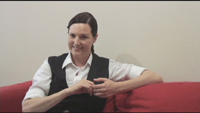 料理をすることです。日本料理、それに私は辛い料理が好きなのでタイ料理も。メキシコ料理も大好きです。豆、米、トルティーヤ、サルサ、グワカモレなど本当に大好きです。 スポーツではカヤック、ハイキング、水上スキー、スキーなど。まだ、家族と過ごす時間も大切にしています。 I like to cook Japanese food, Thai food. I like very hot. Thai food is very hot. We eat so much Mexican food. It’s crazy. Beans, rice, tortillas, salsa, and guacamole. I like kayak, hike, water ski, snow ski and spend time with my family.
料理をすることです。日本料理、それに私は辛い料理が好きなのでタイ料理も。メキシコ料理も大好きです。豆、米、トルティーヤ、サルサ、グワカモレなど本当に大好きです。 スポーツではカヤック、ハイキング、水上スキー、スキーなど。まだ、家族と過ごす時間も大切にしています。 I like to cook Japanese food, Thai food. I like very hot. Thai food is very hot. We eat so much Mexican food. It’s crazy. Beans, rice, tortillas, salsa, and guacamole. I like kayak, hike, water ski, snow ski and spend time with my family.
Q: ヒアリング、スピーキング力を高めるために何かアドバイスはありませんか?
Q: Please give your advice how we can improve our hearing ability.
今世紀最大の発明はiPodです。現在インターネット上にはたくさんのポッドキャストの番組があります。iPodに何でもかまいませんので保存して、ポケットに入れて持ち運び、一日に20分聞くのです。語学の勉強には最適のツールだと思います。 The greatest invasion in this century is the iPod. And you can put anything on your iPod, carried it in your pocket and listen to something in English for just 20 minutes a day. There are so many podcast available on the Internet now for this iPod. It’s great invasion for language.
(*)引っ越しのため新規募集はしておりません。
ノン・ネイティブだから教えられること ルシア先生(祖師谷大蔵) ETCマンツーマン英会話
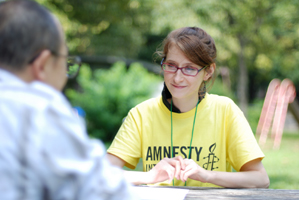
<<休止・帰国された先生のページです>>
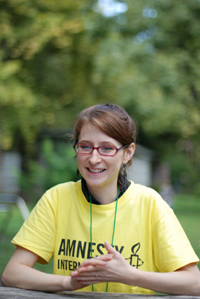 (*)引越の為、受付終了しました。
(*)引越の為、受付終了しました。
Q: 出身地と子どもの頃のお話しを聞かせてください。
スロバキアで生れました。都市部の出身なのですが、でも、東京と比べるとずっと小さな町です。多分、八王子か姫路ぐらいでしょうか。私の世代は子どもだった頃、たいてい田舎に家族や祖父母の実家や別荘がありました。夏休みや冬休み、そしてイースター休暇には、そのほとんどを田舎の祖父母の家に私は行って、村の暮らしの中で時間を過ごしたものです。当時それは、それほど楽しいことは思いませんでしたし、特別のことでもありませんでした。でも、今は違った見方をするようになってきました。畑で自分が食べるトマトを摘むなんてことは、現在では本当に難しくなりましたから。市場で手に取るぐらいですね。自然の中で育っている果物や野菜に、私たちが直に触れる機会はなくなってしまいました。ですから今は、とても貴重な体験だったと、思うようになりました。
I was born in Slovakia. I say I am from a city. But it’s not a city like Tokyo. It’s a lot smaller.It’s perhaps more like Hachiouji or Himeji – quite a small city. Yet, most kids of my generation, have family – usually grandparents – living somewhere in the countryside, or have a summer house (a 別荘) in the countryside. Also in my case, most of summer holiday, winter holiday, Easter holiday, I always used to go to my grandparents’ house in the countryside. I was used to spending my holiday time in the garden or, in general, in village environment. At that time, I didn’t really find very exciting. It wasn’t that special. But now when I think about it from different prospective, it was very special, because now it’s so difficult to simply go to the garden and pick your own fresh fruits and vegetables whenever you want, for instance. You just go to the supermarket. You don’t have contact with fresh vegetables, fruit etc. You just don’t have that contact with nature in general, anymore. So when I think about it now, it was indeed a very special experience.
 Q: 英語を話すようになった経緯と、先生になられた理由を教えてください。
Q: 英語を話すようになった経緯と、先生になられた理由を教えてください。
いい質問ですね。私は英語のネイティブスピーカーではありませんからね。私が14歳の時、母親がブラッセルで働いていたために、突然ベルギーに引越しをすることになりました。そこで3年半暮しました。中学校の終わりの頃です。私はインターナショナル・スクールに編入しました。私にとって本当に新しい体験でした。実は当時、私は上手く英語が話せなかったのです。大きなショックを受けました。幼稚園のころから英語は勉強していたいのですが、ベルギーで入学したインターナショナル・スクールの最初の授業で、私は何も理解ができなかったのです。
That’s a good question. As you know, I am not a native. But when I was 14, I moved to Belgium because my mother got a job in Brussels. We stayed there for 3 years and a half, and during that time, I was enrolled at an international school (it was at the end of junior high school, and high school). Everything was a really new experience for me. And to be honest, at the start I didn’t speak English very well, so it was a complete shock to suddenly start learning everything in English. When I went to the first class, I didn’t understand anything. I mean, of course in Slovakia I had been studying English ever since kindergarten. But after coming to Belgium and encountering life in such an international, English-speaking environment, it was the first time I realized the importance of knowing how to communicate.
Q: 英語で苦労している私たち日本人と同じような体験をされたのですね。
そうなんです。ですから英語を話そうと努力をしたり、上達せずに悩んでいる日本人の方を見ると、その気持ちが本当に良く分かるのです。私自信も同じ体験をしてきましたので。英語を話す上で、私自身が役に立ったアドバイスを、今度は日本人の方に教えてあげることができる。そう思ったことが、英語の先生になった理由だと思います。
Yes, I was in the very same situation as many Japanese are when they find themselves in an international environment. So when I see Japanese people trying or having difficulties in speaking English, I can truly understand their feeling, because when I was first forced to use English in school, I was experiencing the same anxiety. Indeed, I have gone through the same process as Japanese English-learners, so I feel I can give them advice that helped me in the past. At the same time, I study Japanese language, so I understand the structure of Japanese language, the way of thinking and tendencies in composition, which gives me a lot of insight into the way in which Japanese people construct their speech in English.And that is probably the reason why actually I became an English teacher in Japan.
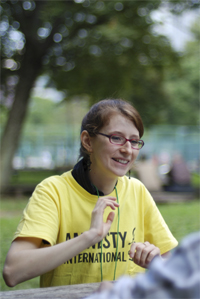 Q: 日本人の生徒さんと同じように英語で苦労した経験があるから、生徒さんが抱える問題や気持ちが分かる。これはノンネイティブ・スピーカーの先生から英語を習う利点でもありますね。
Q: 日本人の生徒さんと同じように英語で苦労した経験があるから、生徒さんが抱える問題や気持ちが分かる。これはノンネイティブ・スピーカーの先生から英語を習う利点でもありますね。
そう思います。もちろんネイティブ・スピーカーの方は母国語については完璧に理解されているでしょう。私のスロバキアの高校にも、たくさんのネイティブ・スピーカーの先生がいらっしゃいました。通常彼らは毎年アメリカやイギリスから来て一年間教えていました。皆とても若く、教えた経験の無い人達ばかりでした。教えるための手法が何も無いんです。授業に来てただ英語を話しているだけ。正直、私は全く理解できなかったですし、何も学びませんでした。もちろんネイティブの先生に教わることは良いことだと思いますが、あるレベル以上になった場合だと思います。初級のうちは、英語以外の言語で説明ができる先生に習うほうがより効果的だと思います。
I think so. In the case of natives, of course they know the language absolutely perfectly. However, if they themselves have not had an experience of learning the structure of their native language or of a foreign language, it might be difficult for them to explain certain concepts, or to anticipate certain mistakes that Japanese English-learners make.For example, when I was in junior high school, we had a lot of native teachers. Usually they came from America or from the Great Britain, for one year at a time. Every year there was a different teacher. But they were generally very young and quite inexperienced in teaching their mother tongue.Even though I was still in junior high school, from their teaching style I felt that they did not use a proper methodology of teaching. They just came to the class, and started speaking English. Nobody understood anything and I we failed to learn much. So I think it is good to have native teachers, but only from a certain level. At the very beginning, I think it’s more useful if you can give explanations in a language other than English, because students just doesn’t understand your English explanations yet.
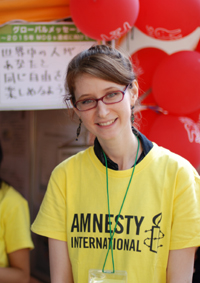 Q: 今日は日比谷公園のグローバル・フェスタ会場で、アムネスティのボランティアとして参加されているところにお邪魔してお話しをお聞きしました。よろしければ、先生の活動についてもお話しください。
Q: 今日は日比谷公園のグローバル・フェスタ会場で、アムネスティのボランティアとして参加されているところにお邪魔してお話しをお聞きしました。よろしければ、先生の活動についてもお話しください。
私がこのようなイベントの参加するのは、実は今日が始めてなのです。アムネスティのボランティアとして活動を始めたのは約1年前。アムネスティは、様々な問題に関して様々な活動を数多く行っています。例えば、死刑制度、ビルマ問題、性別問題など。私は大学で国際関係を専攻しているので、基本的に難民問題に興味があります。この活動を通して、難民問題に何らかの係わりを持てることはとても有意義なことだということに気付きました。
Today is actually the first time that I am involved in this kind of campaign. I started volunteering for Amnesty International quite recently – just about a year ago. In fact, Amnesty is an advocacy group involved in lots of various activities on various issues, for example, campaigns to stop the death penalty, Burma problem or gender issues – all kinds of different campaigns. After coming to Japan, I realized I will finally have time to participate in volunteer activities related to my study (When I was in England I did not have much time). During my university studies, my major was international relations and security studies, so I’ve been taking modules about refugee issues. When I found out that there is a team in Amnesty that focuses on refugees and their problems in Japan, I thought it might be really good to get involved.
以前私は日本の難民問題についてあまり詳しくありませんでした。アムネスティの他のボランティアの方から教えていただたり調査をしたりして、日本の難民制度についての詳細を知ることができました。現時点で日本は、難民の受入数が残念ながら予想以上に少ないのです。日本は国外のODAには多くの貢献をしていますが、国内の難民問題に対しては非常に小さいということはたいへんな驚きです。
Also, I didn’t know so much about the refugee system in Japan before, so I thought it would be a good opportunity to gain an insight into how it works. Since I started getting involved, I learned many new things from other Amnesty members and volunteers, and I found out what the main problem areas are. It’s actually unexpectedly limited. I found out that there are very few refugees in Japan that become officially recognized by the Japanese government. Unfortunately, Japan hasn’t really been open to refugees, even though its contributions in form of ODA to countries outside of its territory are high. It’s quite a paradox that for refugees within its territory, they are actually doing very little. So, participating in Amnesty’s activities has been very stimulating so far.
 今回、幾つか体験ゲームのようなものも作成してみました。くじ引きはご覧になりましたか。あれは、日本の人口に対する難民の数の割合を表しているんです。日本は1982年に難民会議に出席してその役割を担うことになったのですが、1982年から2009年の約30年の間で受け入れた難民の数は531人のみ。日本人の人口の大きさから比べたらその数がいかに小さなものかを伝えたい。日本で難民に会う確立は、宝くじに当たるよりも小さいということを何かで読んだことがあります。私たちがこのくじ引きを作ったのは、そのことを伝えたいからなのです。
今回、幾つか体験ゲームのようなものも作成してみました。くじ引きはご覧になりましたか。あれは、日本の人口に対する難民の数の割合を表しているんです。日本は1982年に難民会議に出席してその役割を担うことになったのですが、1982年から2009年の約30年の間で受け入れた難民の数は531人のみ。日本人の人口の大きさから比べたらその数がいかに小さなものかを伝えたい。日本で難民に会う確立は、宝くじに当たるよりも小さいということを何かで読んだことがあります。私たちがこのくじ引きを作ったのは、そのことを伝えたいからなのです。
For today’s event, we made a couple of interactive activities as you may have seen. We made a lottery draw box. It is supposed to symbolize the proportion of refugees in Japan. Japan has signed the 1951 Convention relating to the Status of Refugees and the 1967 Protocol in 1981 and 1982 respectively. However, in the 30 years between 1982 and 2009, Japan has only given Convention asylum to 531 refugees. So we are trying to demonstrate this little number via the lottery draw: if you would want to meet a refugee in Japan, the chances would be even smaller than wining a lottery.We feel that this should change, and therefore I find it very stimulating to participate in similar events.
「好き」「楽しい」は語学習得の強力な動機付け。あなたの目的を叶えるために英語を使おう―ロバート先生(八千代台・花見川団地) ETCマンツーマン英会話
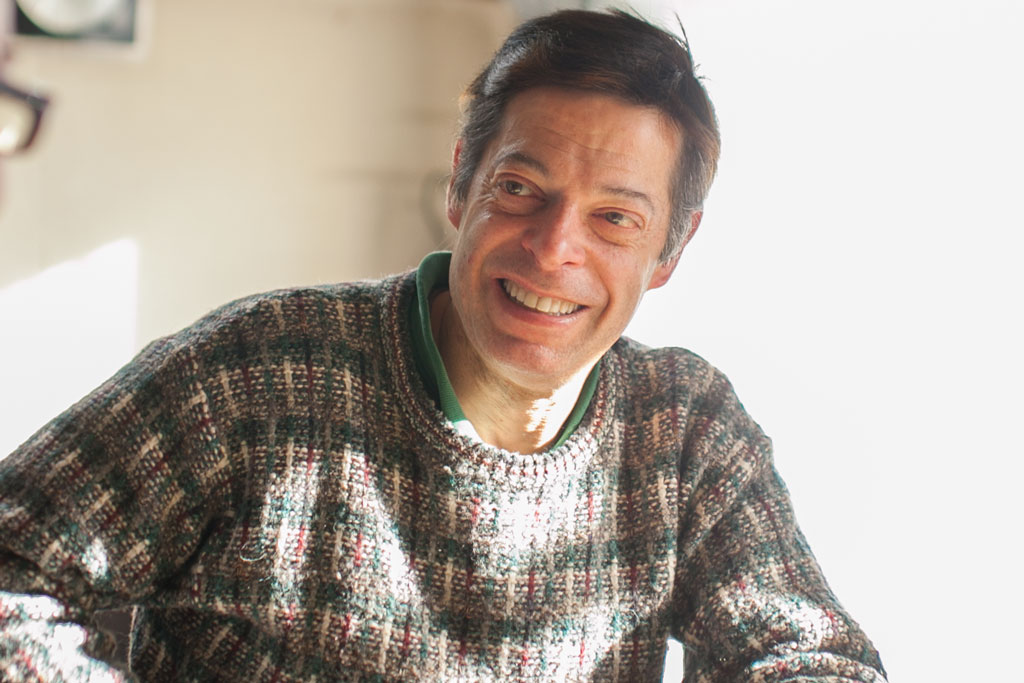
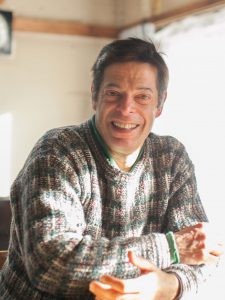 ―― お生まれどちらですか?
―― お生まれどちらですか?
ニューヨーク郊外のコルチェスター(Colchester)です。最初に来日したのは1980年で、その時は2年間滞在しました。その後、1996年に再来日し、それから現在まで20年間日本で暮らしています。
―― 日本語は話されますか?
正直なところ得意ではありません。でも、今お話しているようなレベルであれば、日本語でのコミュニケーションは可能です。
――ある程度日本が分かる先生ですと、初級レベルの生徒さんも安心だと思います。現在、主にどのような方を対象にレッスン方をされているのですか?
ビジネス英語が中心です。しかし、実際は、生徒さんの年齢層の幅は広く、下は1歳6ヶ月、上は85歳まで。教える内容もバラエティに富んでいます。
―― 一般的な日本人の英語のレベルをどう感じていますか?
電車の乗換えがわからなくなり、乗客の方に私が”Can you speak English?”と声をかけたことが何度もあります。答えは100%”No.”でした。それでも、あきらめずに20分程話し続けていると、それが嘘であることがわかります。日本人の方は、私の英語をちゃんと理解できているのです。
嘘をついた理由のひとつは、日本人は非常に内気であること。それはそれで克服する必要があるのでしょう。
他方、英語に関しては言えば、自分の英語に自信が持てない。中学校では、会話ではなく、文法中心に学んでいます。そのような教科書中心の英語の勉強に興味が持てずに、そのうち英語を使う機会もなく、やがては忘れてしまった、ということではないでしょうか。言葉は使わなければ忘れてしまいます。
―― 英語を学んでいる特に初級レベルの生徒さんに、先生からアドバイスはありますか?
 あなたが好きなものを見つけてください。そして、それを英語で読んでみてください。あなたが楽しいと思う映画やビデオを見つけてくださ。そして、それを英語で観てください、ということです。
あなたが好きなものを見つけてください。そして、それを英語で読んでみてください。あなたが楽しいと思う映画やビデオを見つけてくださ。そして、それを英語で観てください、ということです。
英語であれ他の外国語であれ、それを学ぶためには、動機付け(理由)が必要です。動機がなければ、継続はできません。
その意味で、「好き」「楽しい」は、とても強力な動機付けとなるのです。
英語は「道具」でしかありません。車にたとえるならば、目的地にたどり着くための「機械」です。ガレージに車を止めて、その中に座っていてはいけません。車を運転して移動しなければなんの意味もないのです。英語も同じです。あなたの目的をかなえるために使うのです。
また、週に一回のレッスンだけでは英語の上達は難しいです。レッスン以外にどれだけ生徒さんが時間をかけて鍛錬することができるかが、大切なポイントになります。英語の勉強では、先生以上に「生徒さんの責任」が重いのです。
―― お子さんへの英語レッスンもされているんですね。どのような内容ですか?
はい。子どもへのレッスンは、実はとても忍耐と我慢が必要とされる仕事なので、敬遠する先生も多いのですが、私は大好きです。
レッスンは、リズミックス(rhythmics)と呼ばれるものです。対象は2歳から6歳くらいまで。通常、ピアノ、もしくはCDを使って、音楽を流し、歌いながら、英語表現を使って、お遊戯のようなゲームをするのです。歌は”Ring-a-Ring-o’ Roses”や”ABC”、数え歌、等々。子どもたちは、楽しみながら、何度も遊びを繰り返しているうちに、歌や動作に併せて、英語表現を覚えていきます。また、ボードゲームやカードゲーム、かるたなども使用することもあります。

―― 英語を学ぶためにお勧めの音楽はありますか?
カーペンターズ(Carpenters)、ビートルズ(The Beatles)などはいかがでしょうか。ビートルズのメンバーの話すリバプール英語はとても聞き取りにくいですが、彼らの楽曲にはその訛りは一切ないと思います。また、スウェーデン出身ですがABBAの英語は完璧で、こちらもお勧めです。
―― 今年は日本でもトランプ新大統領の英語を聞く機会が増えそうです。彼は簡単な単語しか使わず、発音もわかり安いので、英語初心者には理解しやすい英語なのかもしれません。他方、品に欠けると感じる部分が多々あり、とても悩ましく思っています。
英語のスピーチを学びたいのであれば、マーティン・ルーサー・キング・ジュニア(Martin Luther King, Jr.)はいかがでしょうか。語彙の選び方が非常に美しく、高尚な英語です。また、彼のスピーチには音楽と言ってもいい、とても心地よい抑揚、リズムがあります。”I have a dream”と言う名台詞を残したスピーチが有名ですが、彼が暗殺される前日に行ったスピーチにも心打たれるものがあります。
▼マーティン・ルーサー・キング・ジュニア / Martin Luther King, Jr. — I’ve Been to the Mountaintop (April 3 1968)
歴代の大統領のスピーチに関して言えば、オバマ前大統領のスピーチにもマーティン・ルーサー・キング・ジュニアに似たリズムがあります。また、レーガン元大統領もスピーチのうまさには定評がありました。
他方、W.ブッシュ元大統領はテキサス訛り、アーカンソー州出身のクリントン元大統領には南部訛りがあり、とても聞きづらい部分があると思います。
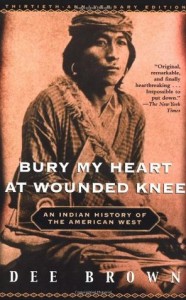
―― 最後に先生の趣味を教えてください
音楽は非常に幅広いジャンルを聞きます。カラオケも大好きです。カラオケボックスで歌うよりも、多くの聴衆の前で、歌を通して自分を表現することに、なにより楽しさを覚えます。
好きな小説は、戯曲ですが思い通りにならない人生の悲哀を描いた『Death of a Salesman(セールスマンの死)』(Arthur Miller著)、ネイティブ・アメリカンの悲痛な歴史を綴った実話『Bury My Heart at Wounded Knee (我が魂を聖地に埋めよ)』(Dee Brown 著)などです。
(了)
映画『The Blind Side』(しあわせの隠れ場所)で南部アメリカ英語マンツーマンレッスン
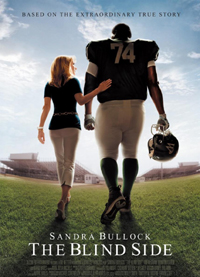

リー・アンが車で帰宅中、雨に濡れながら一人夜道を歩くマイケル・オアーに出会います。様々な経緯でホームレスとなってしまったマイケルを、リーは自宅につれて帰ります。そして、彼の境遇を知ると彼女は一家の一員として育てることを決意します。これは実話で、後に彼はNFLでプレーするプロのアメフト選手となります。
舞台はアメリカ南部のテネシー州。天性の運動神経を生かして、高校のアメフト部でめきめきと実力をあげたマイケルは、各地の大学から誘いを受けるようになり、連日のようにスカウトが訪れます。
Howdy, Houston Nutt. University of Arkansas.
(こんにちは、アーカンソー大学のヒューストン・ナットです。)
”Howdy”は、南部アメリカ特有の挨拶。”How do you do?”が短縮された形。”Hello”などと同じような意味で使われるそうです。
時代は既に21世紀。しかし、無意識下に宿る差別の感覚がこの会話の中に描かれています。
”y’all”は南部英語の象徴的な表現。you allの短縮形で、「ヤオール」とか「ヨール」のように聞こえます。
Hey, does Michael get the family discount at Taco Bell?
マイケルはタコベルの家族割引をもらっているの?
Because if he does Sean’s gonna lose a few stores.
旦那の2~3店舗を食いつぶしちゃうかもよ。
He’s a great kid.
彼はとても良い子なの。
Well, I say make it official and just adopt him.
いっそのこと養子にすればいいんじゃないの
He’s gonna be eighteen in a few months.
彼は数ヶ月で18歳になるの。
Doesn’t really make much sense to legally adopt.
だから、養子にすることはあまり意味が無いの。
Leigh Anne, is this some sort of white guilt thing?
リー・アン、それは白人であることの罪滅ぼしのようなものなの
What will your daddy say?
お父様はなんておっしゃるかしら
Umm… before or after he turns over in his grave?
草葉の陰で怒っているかしら。
Daddy’s been gone five years Elaine,
父は5年前に亡くなっているから。
make matters worse you were at the funeral.
もっと悪いことには、あなたお葬式に来ていたわよね
Remember? You were Chanel and that awful black hat.
覚えてる。シャネルを着て、ダサい黒い帽子をかぶってたわ
Look, here’s the deal.
いい、よく聞いて
I don’t need y’all to approve my choices, alright?
あなた達皆が私の選択に賛同する必要はないの。
But I do ask you to respect them.
だけど、敬意は払って欲しいわ。
You’ve no idea what this boy’s been through.
あの少年だどんな苦労をしてきたかも知らないで
And If this is going to be some running diatribe
批判ばかりをするのなら
I can find an overpriced salad a lot closer to home.
こんなに高いサラダなら、家の近所でいくらでも食べられわ(私はこの会から抜けるあw)
Leigh Anne, I’m so sorry. We didn’t intend to—
ごめんなさい。そんなつもりでは…
No. We didn’t really.
本当に、そんなつもりじゃなかったの。
I think, what you’re doing is so great.
あなたがやっていることはとても立派だと思うわ
To open up your home to him.
自宅を彼に開放して
Honey, you’re changing that boy’s life.
あの少年の人生を変えてあげているのだもの
No.He’s changing mine.
違う。彼が私の人生を変えているの。
映画『The Secret Life of Bees』(リリィ、はちみつ色の秘密)で南部アメリカ英語マンツーマンレッスン
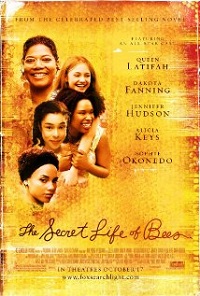
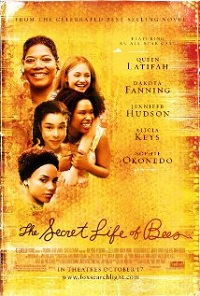 1964年のサウスカロライナ州シルヴァン郊外の農園で暮らす14歳のリリィ・オーウェンズ。
1964年のサウスカロライナ州シルヴァン郊外の農園で暮らす14歳のリリィ・オーウェンズ。
制定されたばかりの公民権法に勇気を得て、選挙登録に向かおうとする黒人家政婦のロザリンは、その途中で白人の嫌がらせを受け、怪我をした挙げ句に警察に連行されてしまいます。
リリィはロザリンを助け出し、亡き母と縁のある町ティブロンに向かいます。そこでボートライト三姉妹と出会います。
リリィを演じるハンナ・ダコタ・ファニングはアメリカ南部のジョージア州生まれ。映画でも南部アメリカ英語を聞かせてくれているようです。
(ここには何か縁がを感じるの。本当に)
Just need some time to figure out why.
(何故なのかを探るために少し時間が欲しいだけなの)
南部アメリカ英語の特徴の一つは、二重母音 [/aɪ/] が単母音化 [aː] するとういもの。
上の台詞では、why (ホワイ)が、whar (ホアー)のように発音されています。
▽The Secret Life of Bees Trailer
▽サウスカロライナ州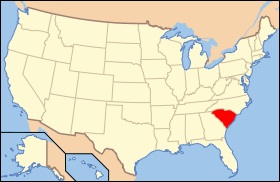
映画『Radio』(僕はラジオ)で南部アメリカ英語マンツーマンレッスン
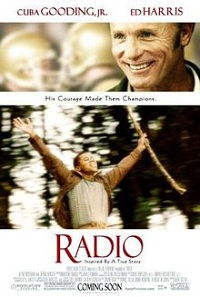
 「これがアメリカ南部、サウスカロライナ州での話であることが何よりも素晴らしい。だって、それは他のどこだって可能だということを意味するから」。映画『Radio』(僕はラジオ)にはそんな賞賛の声が掛けられました。
「これがアメリカ南部、サウスカロライナ州での話であることが何よりも素晴らしい。だって、それは他のどこだって可能だということを意味するから」。映画『Radio』(僕はラジオ)にはそんな賞賛の声が掛けられました。
この映画はアメリカのスポーツライター、ゲリー・スミス氏が有名スポーツ専門誌『Sports Illustrated』に掲載した記事”Someone to Lean Onを基とにしたノンフィクションドラマ。知的障害の黒人青年ジェームズ・ロバート・ケネディ(通称”ラジオ”)と学校の先生兼アメリカンフットボールの白人コーチ、ハロルド・ジョーンズとの友情を描いています。時代は1970年代中ごろ。公民権運動の嵐が吹き荒れた60年代を乗り越え、70年代は教育の現場で平等な教育のための具体的な取り組みが始まりましたが、現場ではまだまだ様々な軋轢が生じていた時代の話です。
知的障害の方々とどのように向き合うのか、この映画がひとつのヒントを与えてくれます。記事のタイトル、『Someone to Lean On』(学び続ける人)とは誰のことを指すのでしょうか。映画の中で、ジョーンズ・コーチのこんな言葉があります。
南部アメリカ英語の特徴、teachingの最後のgが省略されているのが分かります。
(私達がラジオに教えたんじゃない)
Radio’s the one been teachin’ us.
(ラジオが私達に教えてくれたんだ)
共に学ぶ、学び続ける。人と人との繋がるのは、まさにこのためなのかも知れません。
▽Radio Trailer
▽サウスカロライナ州
映画『O Brother, Where Art Thou?』(オー・ブラザー!)で南部アメリカ英語マンツーマンレッスン
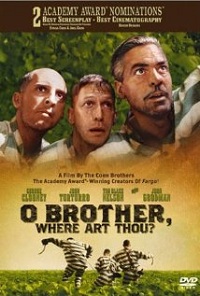
 アメリカ南部社会においてキリストの最大宗派として影響力を持っているのは、バプティスト派だそうです。
アメリカ南部社会においてキリストの最大宗派として影響力を持っているのは、バプティスト派だそうです。
宗派名の由来でもある「全身浸礼」はバプテスト派にとっては重要な伝統。まず水は、湖、河川のような自然の状態にある水であること。次に、伝道師と助手は服の上に白いロープを着用して、受洗者とともに水の中に立つ。それから受洗者の鼻をつまんで、仰向けに水の中に完全に沈めます。このときがこの世との決別、すなわち「死」を象徴する瞬間。「人は、新たに生まれなければ神の国を見ることができない」という聖書の言葉の実践だそうです。
1930年代の南部を描いた映画『O Brother, Where Art Thou?』にこの浸礼の場面が登場します。パーチマン刑務所から脱出した三人組みのうちまず一人が浸礼を受け「罪が浄められた!」と喜びます。
ときは大恐慌期のミシシッピ州。ローズベルト大統領のニューディール政策で作られたダムのひとつができあがり、主人公エヴェレットの家がまもなく水底に沈もうとしています。
次のシーンでは、南部英語の特徴的な表現、”fixing to” が使われています。通常”fix”は「固定する」、「修理する」という意味で使われますが、南部アメリカ英語では、”about to do“、「今にも〈…し〉かけていて, 〈まさに…せんとして〉」という独特の意味で使われることがあります。
He was fixin’ to betray us.
彼は俺たちを裏切ろうとした。
また、reckonも南部でしばしば使われる表現で、”guess“や”think“と同じ意味を持ちます。
I reckon it’ll fetch us enough for a good auto voiture and a little leftover besides.
それを売れば十分いい車が買えて、少々お釣りもでるだろう。
Well, didn’t look like a one-horse town,
まったく、ここはどうしようもない田舎だ
but try finding a decent hair jelly.
なんとか整髪料を手に入れないと
Gopher, Everett?
ホリネズミ、たべるかい、エヴェレット?
No transmission belt for two weeks.
トランスミッションベルトに2週間も待たなきゃいけないなんて
Huh? They dam that river on the 21st.
ダムの完成は21日だ。
Today is the 17th.
今日は17日だぞ
Don’t I know it.
そうさ。
We got but four days to get to that treasure. After that, it’ll be at the bottom of a lake.
4日以内に行かないと、お宝は湖の底に沈む
We won’t make it walkin’.
車が要るぞ
Right… – Gopher?
そうだな。ホリネズミ、食べるか?
But the old tactician’s got a plan.
俺に計画がある。
For the transportation, not keeping my coiffure in order.
車は何とかなる。問題はヘアの乱れをどうするか。
How’s this a plan? How we gonna get a car?
どんな計画だ?車をどう手に入れる
Sell that. I figure you can only have painful association for Wash.
それを売れ。つらい思い出の品さ
“To Washington Bartholomew Hogwallop, from his lovin’ Cora.””Amor fidel… is.”
“ウォッシュ・ベーソミュー・ホグワロップへ””妻より”愛をこめて
It was in his bureau,
タンスにあった。
I reckon it’ll fetch us enough for a good auto voiture and a little leftover besides.
それを売れば十分いい車が買えて、少々お釣りもでるだろう。
Whoo! You got light fingers, Everett.
抜け目がないな
Gopher?
ホリネズミ、食わないの?
You miserable little snake.
この薄汚いコソ泥
You stole from my kin!
お前は俺の親戚から盗んだな
Who was fixin’ to betray us.
俺たちを裏切ろうと親戚な
You didn’t know that at the time.
盗んだときは、知らなかったろう
So I borrowed it till I did know.
最初は借りただけ
That don’t make no sense!
理屈に合わねえ
A fool seeks logic in the chambers of the heart.
人間に論理性なんか求めるな
What the hell is that singing?
あの歌は?
Appears to be some kind of a… congregation.
どこかの宗派の信徒たちのようだな
(*)参考図書
『ロックを生んだアメリカ南部 ルーツミュージックの文化的背景』(ジェームズ・M・バーダマン、村田薫 共著)
映画『The Miracle Worker』(奇跡の人)で南部アメリカ英語マンツーマンレッスン
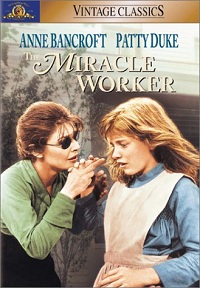
 一歳で光と音を失ったヘレン・ケラーに、言葉を教えようとする家庭教師アニー・サリバンの葛藤の日々を描く映画『The Miracle Worker』(邦題:奇跡の人)。原題からわかるように、Miracle Workerとはこのヘレン・ケラーではなく、アニーサリバンのこと。
一歳で光と音を失ったヘレン・ケラーに、言葉を教えようとする家庭教師アニー・サリバンの葛藤の日々を描く映画『The Miracle Worker』(邦題:奇跡の人)。原題からわかるように、Miracle Workerとはこのヘレン・ケラーではなく、アニーサリバンのこと。
アニーはマサチューセッツ州の生まれ。パーキンス盲学校を主席で卒業したばかりのアニーは、家庭教師としてヘレンの住むアラバマ州の小さな町タスカンビアに向かいます。南北戦争時に南軍の陸軍大尉だったヘレンの父アーサー・ケラーは、アニーにこんな言葉を浴びせます。
How can a half-blind Yankee schoolgirl manage?
目の不自由な北部人(ヤンキー)の学生が、
どうやってヘレンを教育するんだ?
語源には諸説あるようですが、Yankeeは北部人の蔑称。映画ではアーサーの反北部の感情も描かれています。
アニーは決してあきらめることなく、ヘレンに言葉の持つ力を教えようとします。
I wanted to teach you, everything the earth is full of, Helen.
Everything on it that’s ours for a wink, and it’s gone.
あなたに教えたい。この世のものは一瞬で消え去ってしまう
And what we are on it. The light we bring to it and leave behind in words.
でも私たちは言葉という光を残せる
You can see 5000 years back in the light of words.
5000年昔の光も見えるわ
Everything we feel, think, know, and share in words.
感じたことのすべて、知識も分けられる
So not a soul is in darkness, or done with even in the grave.
だから誰だって闇に住んではいないのよ
▽The Miracle Worker Trailer
人の一生は思うよりもずっと短い、一瞬のきらめきのようなもの。でも、言葉にすることで、私たちの思いや知識を時空を超えて分かちあうことができる。そして、言葉を通して人と繋がるることができ、言葉を通して共感しあうこができれば、新たな力が生まれてくる。
私たちが言葉を、そして外国語である英語も学ぼうとすることは、闇を照らす灯りを手に取るようなことなのかもしれません。そして、その光りの向こうに、同じように灯りを手にした誰かを見つけるかもしれません。それは、この地球のどこかで同じ時代を生きている仲間なのかもしれませんし、私たちに何かを伝えようと言葉を残した先人たちなのかもしれません。
映画『No Country for Old Men』(ノーカントリー)で南部アメリカ英語マンツーマンレッスン
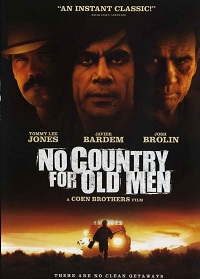
 テキサスの乾いた荒野を砂埃を舞い上げて走る白い常用車が、後ろからサイレンを鳴らして近づいてきたパトカーに止められます。運転手は、ドアの窓を開けこう聞きます。
テキサスの乾いた荒野を砂埃を舞い上げて走る白い常用車が、後ろからサイレンを鳴らして近づいてきたパトカーに止められます。運転手は、ドアの窓を開けこう聞きます。
Howdy. What’s this about?
やあ。何ですか。
”Howdy”は、南部アメリカを中心に使われる挨拶で”How do you do?”が短縮された形。でも、質問の意味合いは持たず、”Hello”などと同じような意味で使われるそうです。
エド・トム・ベル保安官を演じるトミー・リー・ジョーンズ自身もテキサス州出身。保安官を引退したベルが、昨晩見た夢について妻に語るシーンでも、南部アメリカ英語の特徴が表れています。そのひとつが”fix'”とう単語。通常は「固定する」、「修理する」という意味で使われますが、南部アメリカ英語では次のように「準備する」(prepare)という意味で使われる場合があります。
He was fixin’ to make a fire somewhere out there in all that dark and cold.
闇と寒さの中、どこかで火を焚いている(火を焚く準備をしている)
How’d you sleep?
眠れた?
I don’t know. Had dreams.
どうかな。夢を見たよ。
Well, you got time for ‘em now. Anything interesting?
暇ができたからよ。面白い夢だった?
They always is to the party concerned.
関係当事者には、夢は面白いものさ
Ed Tom, I’ll be polite.
エド。ちゃんと聞きますから。
All right, then. Two of ‘em, both had my father in ‘em. It’s peculiar.
じゃあ話すよ。2つ夢を見たが、両方に親父が出てきた。妙だよな。
I’m older now than he ever was by 20 years.
親父は今の俺より20歳若くして死んだ。
So, in a sense, he’s the younger man.
だから、夢では親父のほうが若いんだ。
Anyway, the first one I don’t remember too well
最初の夢はよく覚えていない
but it was about meeting him in town somewheres, and he give me some money.
どこかの町で親父に会い、金をもらうが、
I think I lost it.
それを無くしてしまったようだ。
Second one, it was like we was both back in older times.
2つめは、2人で昔に戻ったような夢で
And I was a-horseback, going through the mountains of a night.
俺は馬に乗り、夜中に山を越えていた。
Going through this pass in the mountains.
山道を通って行くんだが
It was cold, and there was snow on the ground.
寒くて、雪が積もっていて
And he rode past me and kept on going. never said nothing going by, just rode on past.
親父は俺を追い抜き、何も言わず先に行った。
He had his blanket wrapped around him and his head down.
体に毛布を巻きつけうなだれていた
When he rode past, I seen he was carrying fire in a horn the way people used to do,
親父は手に日を持っていた。昔のように牛の角に火を入れて
and I I could see the horn from the light inside of it ‘bout the color of the moon.
中の火が透けた角は月のような色だった。
And, in the dream, I knew that he was going on ahead.
夢の中で俺は知ってた。親父が先に行き
He was fixin’ to make a fire somewhere out there in all that dark and cold.
闇と寒さの中、どこかで火を炊いている
And I knew that whenever I got there, he’d be there.
俺が行く先に、親父がいる。
And then I woke up.
そこで目が覚めた。
映画『Big fish』(ビッグ・フィッシュ)で南部アメリカ英語マンツーマンレッスン
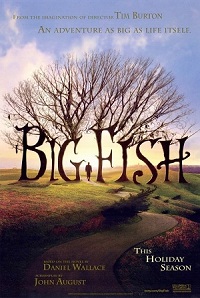
 映画のタイトルになった『Big Fish』は、原作者のダニエル・ウォレス氏の父が口癖のように言っていた言葉からとったそうです。
映画のタイトルになった『Big Fish』は、原作者のダニエル・ウォレス氏の父が口癖のように言っていた言葉からとったそうです。
I didn’t want to be a big fish a little pound.
(小さな池の大きな魚になるのはご免だ)
”big fish”は、才能のある人、important people, talented peopleという意味で使われます。また、上の文でも使われていますが、”a big fish in a small pond”というフレーズを使って次のように言うこともあります。
an important person in a small community.
(狭い所にいるにはもったいないほどの才能がある人)
ウォレス氏の父は生まれ故郷のアラバマを離れて、国際ビジネスマンとして活躍します。カリスマ性に富み、どこか踏み込めない領域がある雰囲を漂わせている方だったそうです。
その父との思い出から生まれた『Big Fish』で、父親役を演じたユアン・マクレガーはスコットランド人。しかし映画ではしっかりと南部アメリカ英語を聞かせてくれています。
アラバマで地元の人々に話し方の指導を受けたそうです。南部アメリカ人ではない方が、話すほうがより特徴が分かりやすいかもしれません。次のシーンでも、二重母音の”my”(マイ)が、短母音化して”mah arm”(マー・アーny)”、mah leg”(マー・レーグ)、”I”(アイ)が”Ah wouldn’t lie to you.(アー・ウドゥント・ラーイ・トゥー・ユー)”となっています。
Armed with the foreknowledge of my own death I knew the giant couldn’t kill me.
巨人に殺されるのが僕の死に方ではない。そのことを知っていることが強みだった。
All the same, I preferred to keep my bones unbroken.
だが、骨を折られるのはご免だ。
Why are you here?
何しにきた?
So you can eat me.
僕を食べていいよ
The town decided to send a human sacrifice and I volunteered.
街のために生け贄になりに来た
My arms are a little stringy, but there’s some good eating in my legs.
腕は細いけど足は美味いぜ
I mean, I’d be tempted to eat them myself.
自分で食いたいくらいだ
So I guess, well If you’d just get it over with quick, because I’m not much for pain, really.
さあ、さっさと食っちまってくれ。痛いのは苦手だから。
Oh, come on! I can’t go back! I’m a human sacrifice!
このままでは帰れない。僕は生け贄だ。
If I go back, they’ll think I’m a coward.
このまま戻ったら、僕は臆病者だと思われる。
I’d rather be dinner than a coward.
だったら、食われるほうがましだ。
Here. You can start with my hand. It’ll be an appetizer.
さあ。手からどうぞ。前菜になるよ。
I don’t want to eat you. I don’t want to eat anybody.
お前なんか食べない。
I just get so hungry. I’m just too big.
ただ腹が減った。体がでかすぎるんだ。
Did you ever think that maybe you’re not too big but maybe this town is just too small?
あんたがでかいんじゃなくて、この街が小さすぎると思ったことはないのかい?
I’ve heard in real cities there are buildings so tall you can’t even see the tops of them.
大都会のビルは高すぎて天辺が見えないそうだ。
Really?
本当か?
Oh, I wouldn’t lie to you.
うそなんかついていない。
And all-you-can-eat buffets.
食べ放題のブッフェもある。
Now, you can eat a lot, can’t you?
あんた、大食いだろう?
I can.
そうだな。
So why are you wasting your time in a small town?
だったら、どうしてこんな小さな町で時間を無駄にしているんだ。
You’re a big man. You should be in a big city.
あんたは大男だ。大男は大都市にいるべきだ。
You’re just trying to get me to leave, aren’t you?
俺を追い払うつもりだな?
What’s your name, giant?
あんたの名前は
Karl.
カール
Well, mine’s Edward.
僕はエドワード
And truthfully Well, I do want you to leave, Karl.
事実だ。町を出て行ってほしい。
But I want to leave with you.
でも僕も一緒に行く
I mean, you think this town is too small for you?
この町はあんたにも小さく
Well, it’s too small for a man of my ambition.
高い望みをもつ僕にも小さすぎる
So, what do you say? Join me?
どうする?一緒に行くかい?
Okay.
いいよ
Okay.
よし
(*)関連リンク
“big fish”の意味は?
映画『Remember the Titans』( タイタンズを忘れない)で南部アメリカ英語マンツーマンレッスン
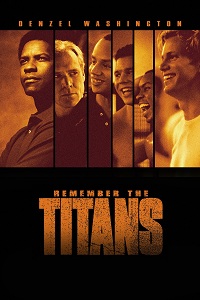
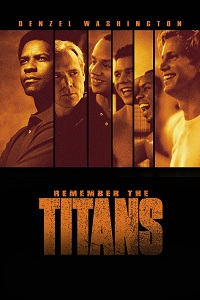 先人たちが何層にも重なり合って土となった大地には、長い時間を掛けて様々な記憶が刻まれているのかもしれません。そんな土地に足を踏み入れたとたんに、言葉にでは言い表せない何かが、人の心に直接訴えかけてくるの感じることがあります。
先人たちが何層にも重なり合って土となった大地には、長い時間を掛けて様々な記憶が刻まれているのかもしれません。そんな土地に足を踏み入れたとたんに、言葉にでは言い表せない何かが、人の心に直接訴えかけてくるの感じることがあります。
人種差別が渦巻く1971年、教育改革によりヴァージニア州のT.C.ウィリアムズ高校に白人黒人混合の高校フットボールチーム生まれました。争いごとの耐えないチームの状況を見かねた黒人コーチのハーマン・ブーンは、合宿早朝3時半にチーム全員を叩き起こし、ある場所までランニングをさせます。
たどり着いたのはゲティスバーグ。アメリカが二つに分かれて戦った南北戦争の中でも最大の犠牲を生んだ戦地でした。ブーンは人々が敵意を持ち、憎しみ合うことの無意味さを訴えます。
朝もやの中からあわられたたくさんの墓石は、コーチの言葉以上に説得力をもってチームメンバーに何かを訴え行きます。
ハーマン・ブーンは実在の人物。ノースカロライナのインディアン保留地で生まれたチェロキー族の母と、黒人の父の間に生まれています。 彼を演じるディンゼル・ワシントンの台詞の中にも南部アメリカ英語の特徴が、見つけられます。
”fighting”の最後のg音が消えて、”finghtin”と発音したり、二重母音の”my”(マイ)が、短母音化して”mah heart”(マー・ハート)、”mah brother”(マー・ブラザー)、”I”(アイ)が”Ah don’t know(アー・ドン・ノー)”と言っているのが分かります。
Anybody know what this place is?
ここを知っているか?
This is Gettysburg.
ゲティスバーグ
This is where they fought the Battle of Gettysburg.
南北戦争の決戦場だ
50,000 men died right here on this field,
5万人の人間がこの場所で死んだ
fightin‘ the same fight that we’re still fightin‘ amongst ourselves today.
同じ戦いを、我々はまだ続けている。今もだ
This green field right here was painted red.
この緑の野が赤く染まった。
Bubbling with the blood of young boys.
若者の流した血で
Smoke and hot lead pouring right through their bodies.
煙と鉛の弾が彼らに降り注いだ
Listen to their souls, men.
死者の声がする
”I killed my brother with malice in my heart. ”
“敵意が兄弟を殺させた”
”Hat red destroyed my family.”
“憎しみが家族を破壊した”
You listen
聞け
and you take a lesson from the dead.
死者から学べ
If we don’t come together right now, on this hallowed ground then we, too, will be destroyed.
この聖なる地でひとつになれなければ、我々も終わる
Just like they were.
彼らと同じだ
I don’t care if you like each other or not, but you will respect each other,
お互い嫌いでも、相手を認めれば
and maybe I don’t know, maybe we’ll learn to play this game like men.
きっと、いつの日か人として向き合える
映画『JFK』で南部アメリカ英語マンツーマンレッスン(2)

 ケネディ大統領の暗殺にかかわったとされるクレイ・ショーに対する裁判には、無罪判決が言い渡されます。この訴えを起こしたジム・ギャリソン(ニューオーリンズ地方検事)は、その25年後に当時を振り返った著書の最後を、次のように結んでいます。
ケネディ大統領の暗殺にかかわったとされるクレイ・ショーに対する裁判には、無罪判決が言い渡されます。この訴えを起こしたジム・ギャリソン(ニューオーリンズ地方検事)は、その25年後に当時を振り返った著書の最後を、次のように結んでいます。
「事実がここまで判明しているにもかかわらず、司法省は現代におけるもっとも重大な暗殺事件を真摯に究明することを拒んでいる。ケネディ大統領暗殺から25年も経ってしまった今となっては、もはや手遅れというものかもしれない。
だが、歴史の教訓を学び取り、私たちは今どこにたっていて誰がこの国を動かしているのかを学ぶのに、遅すぎるということはない」
日本もアメリカに遅れながらも、似たような道を通ってきているのではと感じることがあります。「歴史の教訓」から学ぶ取ることの大切さを訴えるジム・ギャリソンの言葉が、私達の心に訴えかけます。
次のシーンは映画『JFK』の裁判の中で、ジム・ギャリソンが最後に述べる言葉です。
「私達の大半は、正義は自然に生まれるものであり、善は当然、悪に勝つと、そう思っていました」
ケネディ大統領の暗殺から50年経った今、この言葉は今の私達の大きな共感を呼びます。「正義は、何もせず、ただ待っているだけで、自然に生まれてくるものではない」
ジム・ギャリソンを演じるケビン・コスナーはこのシーンをワン・テークで行ったとの事。後半声を震わせて語る姿が印象的です。
But someday, somewhere, someone may find out the damn truth.
しかし、いつの日か、どこかで、誰かが真実を発見することでしょう。
We’d better. We’d better or we might just as well build ourselves another government like the Declaration of Independence says to, “when the old one ain’t workin’, just, just a little farther out West. “
我々としては、独立宣言が「古い社会が停滞したら、さらに西へ行け」と言っているように政府を一新した方がいいと思います。
An American naturalist wrote:
あるアメリカの自然主義者は次のように書いています。
“A patriot must always be ready to defend his country against its government.”
「愛国者は常に自分の国を政府から守るべき覚悟がいる」と。
I’d hate to be in your shoes today.
今日みなさんが下さなければならない決定には承服できません。
You have a lot to think about. You’ve seen much hidden evidence the American public has never seen.
考えることはたくさんあります。皆さんはアメリカの大衆がこれまで見ていない多くの隠された証拠を目にされました。
You know, going back to when we were children,
いいですか、私たちが子供の頃、
I think that most of us in this courtroom thought justice came into being automatically, that virtue was its own reward, that, that good would triumphs over evil.
この法廷にいる私達の大半は、正義は自然に生まれるものであり、善は当然、悪に勝つと、そう思っていました。
But as we get older, we know this just isn’t true.
しかし、年をとるにつれて、私達はそれは真実ではないと認識します。
Individual human beings have to create justice, and this is not easy; because the truth often poses a threat to power, and one often has to fight power at great risk to themselves.
一人一人の個人が正義を作りださなけらばならないのです。そして、これは容易な事ではありません。なぜなら真実はときに権力にとって脅威となるからであり、人は時に大きな犠牲を払って権力と戦わなければならないからです。
People like S.M. Holland, Lee Bowers, Jean Hill, Willie O’Keefe have all taken that risk.
S.M.ホーランド、リー・バワーズ、ジーン・ヒル、ウィリー・オキーフといった人々は、そうした犠牲となったのです。
They’ve all come forward.
証言すべく、皆出廷したのです。
I have here some $8,000 in these letters sent to my office from all over the country.
ここに、届いた手紙に同封されていた現金が8千ドルあります。検察局に全国から寄せられたものです。
Quarters, dimes, dollars bills from housewives plumbers, car salesmen, teachers, invalids.
25セント玉、10セント玉、1ドル札で主婦や配管工、車のセールスマン、教師、そして病気の人々から送られたお金です。
These are people who cannot afford to send money but do.
送金する余力のない人々からの貴重なお金です。
These are the one who drive cabs, who nurse in the hospitals, who see their kids go to Vietnam.
タクシーの運転手、病院の看護婦、子供をベトナムの戦場へ送り出した親もいます。
Why?
なぜでしょうか?
Because they care.
なぜなら、人々が真実望んでいるからです。
Because they wanna know the truth.
なぜなら、誰もが祖国をその手に取り戻したいと思っているからです。
Because they want their country back.
なぜなら、誰もが祖国をその手に取り戻したいと思っているからです。
Because it still belongs to us as long as the people have the guts to fight for what they believe in.
なぜなら、国民が自ら信じるもののために戦うガッツがある限り、祖国は国民のものだからです。
The truth is the most important value we have because if it doesn’t endure if the government murders truth, if we cannot respect these people then this is not the country I was born in, and it is sertainly not the country I want to die in.
真実は私達の信じる価値の中で最も重要なものです。なぜなら真実が無力になり、政府が真実を抹殺し、私たちが彼らを信じられなくなれば、この国はもはや私がうまれた国ではないし、ましてや、そんな国で死にたいとはとうてい思わないからです。
Tennyson wrote: “Authority forgets a dying king.”
テニソンは書いていています。「死に行く王に権威なし」と。
This was never more true than for John F. Kennedy whose murder was probably one of the most terrible moments in the history of our country.
ジョン・F・ケネディは実にその通りになりました。彼の死はアメリカの歴史でおそらく最大の悲劇です。
And you the people, the jury system sitting in judgment on Clay Shaw represent the hope of humanity against government power.
そして義務を果たすべく、不安定な状況の中で、クレー・ショーを裁くためにこの場に座っている陪審員の方々は、国家権力に対抗する人間性の望みの綱なのです。
In discharging your duty, in bringing the first conviction in this house of cards against Clay Shaw “ask not what your country can do for you, but what you can do for your country.”
その義務を果たすに当たり、クレー・ショーへの有罪判決を提出するに当たり、「祖国があなたに何が出来るかではなく、あなたが祖国のために何ができるかを問うて頂きたい」。
Do not forget your dying king.
死に行く王を忘れないでください。
Show this world this is still “a government of the people, for the people and by the people.”
いまだ「人民の人民のための人民による政府」が存在していることを、生きている限り、これこそ最も重要なのです。
Nothing as long as you live will ever be more important.
生きている限り、これこそ最も重要な点です。
It’s up to you.
あなた方次第なのです。
(*)参照図書
『スクリーンプレーJFK』
『JFK ケネディ暗殺犯を追え』 (ジム・ギャリソン 著 / 岩瀬孝雄 訳)
映画『JFK』で南部アメリカ英語マンツーマンレッスン(1)

 ジム・ギャリソンはニューオーリンズ(ルイジアナ州)の地方検事。ケネディ大統領暗殺事件の容疑者として逮捕されたリー・ハーヴェイ・オズワルドが、事件の前の夏、ニューオーリンズに住んでいたため、ジムはこの事件とかかわりを持つようになります。
ジム・ギャリソンはニューオーリンズ(ルイジアナ州)の地方検事。ケネディ大統領暗殺事件の容疑者として逮捕されたリー・ハーヴェイ・オズワルドが、事件の前の夏、ニューオーリンズに住んでいたため、ジムはこの事件とかかわりを持つようになります。
事件から3年が経ったころ、知人の上院議員ラッセル・ロングがジムにこう言います。「ウォーレン委員会の連中はまったく話しにならん。一人の人間がジョン・ケネディをあんなふうに撃てるわけがないじゃないか」。ウォーレン委員会とは、次の大統領のジョンソンが設置した暗殺事件の調査委員会です。
ロング氏の言葉に好奇心を刺激されたジムは、26巻に及ぶ同委員会の資料を取り寄せ調べ上げるうちに、彼はその報告書は支離滅裂であることに気がつきます。
次の動画は、ジムがニューオーリンズの検事局スタッフとオズワルドについて語っているシーンです。ジムはアイオア生まれのニューオーリンズ育ち。彼を演じるケビン・コスナーも南部英語を話しているようです。また、実在のスタッフであるビル・ブロザード(Bill Broussard)、ルイス・イヴォン(Lou Ivon)、ヌーマ・バーテル(Numa Bertel)を演じる役者たちも、それぞれマイケル・ルーカーはアラバマ州出身、ジェイ・O・サンダースがテキサス州、そして、ウェイン・ナイトはジョージア州と南部出身者で固めています。
南部アメリカ英語の特徴のひとつは、母音を引き伸ばし気味に発音する「ドロール」(drawl)という癖。
たとえば、
”they buy her new dresses”の”buy”(バイ)が
「ゼイ・バー・ハー・ニュー・ドレーシズ」、
”polish her appearance”の”polish”(ポリッシュ)が
「ポーリッシュ・ハーピアランス」と、母音部分をやや引き伸ばして発音しているように聞こえます。
また、南部英語の象徴的な表現、you allのくずれた発音である”y’all”(ヨオール)も使われています。
Susie Cox:
When he’s arrested, Marina buries him with the public.
She describes him as a psychotic and violent man.
彼が逮捕された時、マリーナは夫を異常者で暴力的だと言ったわ
Marina Oswald:
I have too much facts and facts tell me that Lee shot Kennedy.
事実を知っています
ケネディを撃ったのは夫だと思いますわ
Jim Garrison:
After they kept her locked away for two months surrounded by federal people,
and fearing she’d be deported back to Russia, right?
The poor woman was probably suffering from nervous exhaustion.
They taught her how to answer.
and when they think she’s ready, they buy her new dresses
polish her appearance and wheel her out on cue.
当局に2ヶ月も保護されて、彼女は国外追放を恐れた
きっと神経も参ってたろう
答え方を教えられ、心の準備ができて、ドレスを買い、カメラの前に立たせた
Marina Oswald:
I’d like to thank the Warren Commission.
ウォーレン委員会に感謝を
Jim Garrison:
And Oswald was no angel, that’s clear,
But who was he?
オズワルドは悪者だ
でも正体は?
Bill Broussard:
I’m lost, Boss. What are we saying here?
何だか分からなくなってきた
Jim Garrison:
We are saying that when Oswald went to Russia, he was not a real defector,
that he was an intelligence agent on some kind of mission for our government and remained one untill the day he died.
That’s what we’re saying.
彼がソ連へ行ったのは亡命じゃなかった
政府の情報部員で結局死ぬまで、その身分のままだった
Bill Broussard:
Therefore, because Oswald pulled the trigger
the intelligence community murdered their own Commander-In-Chief?
Is, is that what you’re saying?
彼が犯人だとしたら、情報当局が大統領を殺した?
そう言うのか?
Jim Garrison:
I’ll go you one better, Bill. Maybe Oswald
didn’t pull the trigger.
Nitrate tests indicate he hadn’t fired a rifle on November 22nd.
And on top of that, they didn’t even bother to see if the rifle’d been fired that day.
オズワルドは撃ってないかもしれない
暗殺の日、彼に硝煙反応は出なかった
彼が発砲したかどうかも調べない
Bill Broussard:
His had his palm print on the weapon.
銃の掌紋は?
Jim Garrison:
Well, it went to the FBI, Bill. The FBI didn’t find a goddamn thing.
It comes back a week later and one guy in a Dallas Police Department suddenly finds a palm print?
For all we know, it could’ve been taken off Oswald in the morgue. There’s no chain of evidence.
最初FBIでは発見されなかった
一週間後にダラス警察が突然掌紋を発見した
遺体収容所で銃に手を押し付けたんだろう
Lou Ivon:
I never could figure out why this guy orders a traceable weapon
to this post office box, when he can go into any store in Texas
give a phony name and walk out with an rifle which could never be traced.
なぜ通信販売で銃を注文したのんでしょう?
テキサスなら店で買える銃だ
偽名を使えば秘密で買えます
Jim Garrison:
To frame him, obviously!
犯人に仕立てた
Numa Bertel:
There’s a lot of smoke there, but there’s some fire.
結局は状況証拠ですよ
Bill Broussard:
We’re talking about our government here.
まさか政府筋が…
Jim Garrison:
No. We’re talking about a crime.
Bill and simple.
Y’all got to start thinking on a different level, like the CIA does.
Now we’re through the looking glass here, people.
White is black.
And black is white.
Just maybe Oswald is exactly what he said he was.
A patsy.
でも、これは犯罪なんだ
CIAの犯行という線も無視できない
鏡の国のアリスだよ
白が黒 黒が白に見える
本人が行った通り、オズワルドはいけにえだ
(*)参照図書
『スクリーンプレーJFK』
『JFK ケネディ暗殺犯を追え』
(ジム・ギャリソン 著 / 岩瀬孝雄 訳)
演説の上手さで現代アメリカを代表する一人~Mario Cuomo (マリオ・クオモ)
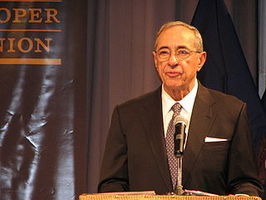
 ブレンダン先生お薦めの図書、『How to Talk to Anyone, Anytime, Anywhere: The Secrets of Good Communication』
ブレンダン先生お薦めの図書、『How to Talk to Anyone, Anytime, Anywhere: The Secrets of Good Communication』の中で、著者のLarry Kingが最良のゲストの一人として紹介している人物です。
マリオ・クオモ(弁護士・政治家・元ニューヨーク州知事)。1984年にサンフランシスコで開かれた民主党大会で彼が行った基調演説は米国の名演説として語り継がれてます。
クオモ氏の他にも名スピーチと言われているものが数多く存在しています。スピーチが上手くなるために、まず歴史的スピーチを聞いてみたい。そんな方にお薦のサイトがあります。
▽ American Rhetoric’s top 100 speeches
政治家が中心ですが、20世紀に行われた全米を代表する歴史的スピーチが100件、音声ファイルとトンスクリプト付きで確認することができます。例えばこんなスピーチです。
◎Martin Luther King, Jr. – “I Have A Dream”
◎John Fitzgerald Kennedy – Inaugural Address
◎Franklin Delano Roosevelt – First Inaugural Address
◎Barbara Charline Jordan – 1976 DNC Keynote Address
◎Richard Milhous Nixon – “Checkers”
◎Malcolm X – “The Ballot or the Bullet”
下記に掲載したのは、1984年にサンフランシスコで開かれた民主党大会でMario Cuomo氏が行った基調演説です。クオモ氏は、2015年1月82歳で亡くなりました。
Thank you very much.
On behalf of the great Empire State and the whole family of New York, let me thank you for the great privilege of being able to address this convention. Please allow me to skip the stories and the poetry and the temptation to deal in nice but vague rhetoric. Let me instead use this valuable opportunity to deal immediately with the questions that should determine this election and that we all know are vital to the American people.
(動画はここから始まります。)
Ten days ago, President Reagan admitted that although some people in this country seemed to be doing well nowadays, others were unhappy, even worried, about themselves, their families, and their futures. The President said that he didn’t understand that fear. He said, “Why, this country is a shining city on a hill.” And the President is right. In many ways we are a shining city on a hill.
But the hard truth is that not everyone is sharing in this city’s splendor and glory. A shining city is perhaps all the President sees from the portico of the White House and the veranda of his ranch, where everyone seems to be doing well. But there’s another city; there’s another part to the shining the city; the part where some people can’t pay their mortgages, and most young people can’t afford one; where students can’t afford the education they need, and middle-class parents watch the dreams they hold for their children evaporate.
In this part of the city there are more poor than ever, more families in trouble, more and more people who need help but can’t find it. Even worse: There are elderly people who tremble in the basements of the houses there. And there are people who sleep in the city streets, in the gutter, where the glitter doesn’t show. There are ghettos where thousands of young people, without a job or an education, give their lives away to drug dealers every day. There is despair, Mr. President, in the faces that you don’t see, in the places that you don’t visit in your shining city.
In fact, Mr. President, this is a nation — Mr. President you ought to know that this nation is more a “Tale of Two Cities” than it is just a “Shining City on a Hill.”
Maybe, maybe, Mr. President, if you visited some more places; maybe if you went to Appalachia where some people still live in sheds; maybe if you went to Lackawanna where thousands of unemployed steel workers wonder why we subsidized foreign steel. Maybe — Maybe, Mr. President, if you stopped in at a shelter in Chicago and spoke to the homeless there; maybe, Mr. President, if you asked a woman who had been denied the help she needed to feed her children because you said you needed the money for a tax break for a millionaire or for a missile we couldn’t afford to use.
Maybe — Maybe, Mr. President. But I’m afraid not. Because the truth is, ladies and gentlemen, that this is how we were warned it would be. President Reagan told us from the very beginning that he believed in a kind of social Darwinism. Survival of the fittest. “Government can’t do everything,” we were told, so it should settle for taking care of the strong and hope that economic ambition and charity will do the rest. Make the rich richer, and what falls from the table will be enough for the middle class and those who are trying desperately to work their way into the middle class.
You know, the Republicans called it “trickle-down” when Hoover tried it. Now they call it “supply side.” But it’s the same shining city for those relative few who are lucky enough to live in its good neighborhoods. But for the people who are excluded, for the people who are locked out, all they can do is stare from a distance at that city’s glimmering towers.
It’s an old story. It’s as old as our history. The difference between Democrats and Republicans has always been measured in courage and confidence. The Republicans — The Republicans believe that the wagon train will not make it to the frontier unless some of the old, some of the young, some of the weak are left behind by the side of the trail. “The strong” — “The strong,” they tell us, “will inherit the land.”
We Democrats believe in something else. We democrats believe that we can make it all the way with the whole family intact, and we have more than once. Ever since Franklin Roosevelt lifted himself from his wheelchair to lift this nation from its knees — wagon train after wagon train — to new frontiers of education, housing, peace; the whole family aboard, constantly reaching out to extend and enlarge that family; lifting them up into the wagon on the way; blacks and Hispanics, and people of every ethnic group, and native Americans — all those struggling to build their families and claim some small share of America. For nearly 50 years we carried them all to new levels of comfort, and security, and dignity, even affluence. And remember this, some of us in this room today are here only because this nation had that kind of confidence. And it would be wrong to forget that.
So, here we are at this convention to remind ourselves where we come from and to claim the future for ourselves and for our children. Today our great Democratic Party, which has saved this nation from depression, from fascism, from racism, from corruption, is called upon to do it again — this time to save the nation from confusion and division, from the threat of eventual fiscal disaster, and most of all from the fear of a nuclear holocaust.
That’s not going to be easy. Mo Udall is exactly right — it won’t be easy. And in order to succeed, we must answer our opponent’s polished and appealing rhetoric with a more telling reasonableness and rationality.
We must win this case on the merits. We must get the American public to look past the glitter, beyond the showmanship to the reality, the hard substance of things. And we’ll do it not so much with speeches that sound good as with speeches that are good and sound; not so much with speeches that will bring people to their feet as with speeches that will bring people to their senses. We must make — We must make the American people hear our “Tale of Two Cities.” We must convince them that we don’t have to settle for two cities, that we can have one city, indivisible, shining for all of its people.
Now, we will have no chance to do that if what comes out of this convention is a babel of arguing voices. If that’s what’s heard throughout the campaign, dissident sounds from all sides, we will have no chance to tell our message. To succeed we will have to surrender some small parts of our individual interests, to build a platform that we can all stand on, at once, and comfortably — proudly singing out. We need — We need a platform we can all agree to so that we can sing out the truth for the nation to hear, in chorus, its logic so clear and commanding that no slick Madison Avenue commercial, no amount of geniality, no martial music will be able to muffle the sound of the truth.
And we Democrats must unite. We Democrats must unite so that the entire nation can unite, because surely the Republicans won’t bring this country together. Their policies divide the nation into the lucky and the left-out, into the royalty and the rabble. The Republicans are willing to treat that division as victory. They would cut this nation in half, into those temporarily better off and those worse off than before, and they would call that division recovery.
Now, we should not — we should not be embarrassed or dismayed or chagrined if the process of unifying is difficult, even wrenching at times. Remember that, unlike any other Party, we embrace men and women of every color, every creed, every orientation, every economic class. In our family are gathered everyone from the abject poor of Essex County in New York, to the enlightened affluent of the gold coasts at both ends of the nation. And in between is the heart of our constituency — the middle class, the people not rich enough to be worry-free, but not poor enough to be on welfare; the middle class — those people who work for a living because they have to, not because some psychiatrist told them it was a convenient way to fill the interval between birth and eternity. White collar and blue collar. Young professionals. Men and women in small business desperate for the capital and contracts that they need to prove their worth.
We speak for the minorities who have not yet entered the mainstream. We speak for ethnics who want to add their culture to the magnificent mosaic that is America. We speak — We speak for women who are indignant that this nation refuses to etch into its governmental commandments the simple rule “thou shalt not sin against equality,” a rule so simple —
I was going to say, and I perhaps dare not but I will. It’s a commandment so simple it can be spelled in three letters: E.R.A.
We speak — We speak for young people demanding an education and a future. We speak for senior citizens. We speak for senior citizens who are terrorized by the idea that their only security, their Social Security, is being threatened. We speak for millions of reasoning people fighting to preserve our environment from greed and from stupidity. And we speak for reasonable people who are fighting to preserve our very existence from a macho intransigence that refuses to make intelligent attempts to discuss the possibility of nuclear holocaust with our enemy. They refuse. They refuse, because they believe we can pile missiles so high that they will pierce the clouds and the sight of them will frighten our enemies into submission.
Now we’re proud of this diversity as Democrats. We’re grateful for it. We don’t have to manufacture it the way the Republicans will next month in Dallas, by propping up mannequin delegates on the convention floor. But we, while we’re proud of this diversity, we pay a price for it. The different people that we represent have different points of view. And sometimes they compete and even debate, and even argue. That’s what our primaries were all about. But now the primaries are over and it is time, when we pick our candidates and our platform here, to lock arms and move into this campaign together.
If you need any more inspiration to put some small part of your own difference aside to create this consensus, then all you need to do is to reflect on what the Republican policy of divide and cajole has done to this land since 1980. Now the President has asked the American people to judge him on whether or not he’s fulfilled the promises he made four years ago. I believe, as Democrats, we ought to accept that challenge. And just for a moment let us consider what he has said and what he’s done.
Inflation — Inflation is down since 1980, but not because of the supply-side miracle promised to us by the President. Inflation was reduced the old-fashioned way: with a recession, the worst since 1932. Now how did we — We could have brought inflation down that way. How did he do it? 55,000 bankruptcies; two years of massive unemployment; 200,000 farmers and ranchers forced off the land; more homeless — more homeless than at any time since the Great Depression in 1932; more hungry, in this world of enormous affluence, the United States of America, more hungry; more poor, most of them women. And — And he paid one other thing, a nearly 200 billion dollar deficit threatening our future.
Now, we must make the American people understand this deficit because they don’t. The President’s deficit is a direct and dramatic repudiation of his promise in 1980 to balance the budget by 1983. How large is it? The deficit is the largest in the history of the universe. It — President Carter’s last budget had a deficit less than one-third of this deficit. It is a deficit that, according to the President’s own fiscal adviser, may grow to as much 300 billion dollars a year for “as far as the eye can see.” And, ladies and gentlemen, it is a debt so large — that is almost one-half of the money we collect from the personal income tax each year goes just to pay the interest. It is a mortgage on our children’s future that can be paid only in pain and that could bring this nation to its knees.
Now don’t take my word for it — I’m a Democrat. Ask the Republican investment bankers on Wall Street what they think the chances of this recovery being permanent are. You see, if they’re not too embarrassed to tell you the truth, they’ll say that they’re appalled and frightened by the President’s deficit. Ask them what they think of our economy, now that it’s been driven by the distorted value of the dollar back to its colonial condition. Now we’re exporting agricultural products and importing manufactured ones. Ask those Republican investment bankers what they expect the rate of interest to be a year from now. And ask them — if they dare tell you the truth — you’ll learn from them, what they predict for the inflation rate a year from now, because of the deficit.
Now, how important is this question of the deficit. Think about it practically: What chance would the Republican candidate have had in 1980 if he had told the American people that he intended to pay for his so-called economic recovery with bankruptcies, unemployment, more homeless, more hungry, and the largest government debt known to humankind? If he had told the voters in 1980 that truth, would American voters have signed the loan certificate for him on Election Day? Of course not! That was an election won under false pretenses. It was won with smoke and mirrors and illusions. And that’s the kind of recovery we have now as well.
But what about foreign policy? They said that they would make us and the whole world safer. They say they have. By creating the largest defense budget in history, one that even they now admit is excessive — by escalating to a frenzy the nuclear arms race; by incendiary rhetoric; by refusing to discuss peace with our enemies; by the loss of 279 young Americans in Lebanon in pursuit of a plan and a policy that no one can find or describe.
We give money to Latin American governments that murder nuns, and then we lie about it. We have been less than zealous in support of our only real friend — it seems to me, in the Middle East — the one democracy there, our flesh and blood ally, the state of Israel. Our — Our policy — Our foreign policy drifts with no real direction, other than an hysterical commitment to an arms race that leads nowhere — if we’re lucky. And if we’re not, it could lead us into bankruptcy or war.
Of course we must have a strong defense! Of course Democrats are for a strong defense. Of course Democrats believe that there are times that we must stand and fight. And we have. Thousands of us have paid for freedom with our lives. But always — when this country has been at its best — our purposes were clear. Now they’re not. Now our allies are as confused as our enemies. Now we have no real commitment to our friends or to our ideals — not to human rights, not to the refuseniks, not to Sakharov, not to Bishop Tutu and the others struggling for freedom in South Africa.
We — We have in the last few years spent more than we can afford. We have pounded our chests and made bold speeches. But we lost 279 young Americans in Lebanon and we live behind sand bags in Washington. How can anyone say that we are safer, stronger, or better?
That — That is the Republican record. That its disastrous quality is not more fully understood by the American people I can only attribute to the President’s amiability and the failure by some to separate the salesman from the product.
And, now — now — now it’s up to us. Now it’s up to you and to me to make the case to America. And to remind Americans that if they are not happy with all that the President has done so far, they should consider how much worse it will be if he is left to his radical proclivities for another four years unrestrained. Unrestrained.
Now, if — if July — if July brings back Ann Gorsuch Burford — what can we expect of December? Where would — Where would another four years take us? Where would four years more take us? How much larger will the deficit be? How much deeper the cuts in programs for the struggling middle class and the poor to limit that deficit? How high will the interest rates be? How much more acid rain killing our forests and fouling our lakes?
And, ladies and gentlemen, please think of this — the nation must think of this: What kind of Supreme Court will we have?
Please. [beckons audience to settle down]
We — We must ask ourselves what kind of court and country will be fashioned by the man who believes in having government mandate people’s religion and morality; the man who believes that trees pollute the environment; the man that believes that — that the laws against discrimination against people go too far; a man who threatens Social Security and Medicaid and help for the disabled. How high will we pile the missiles? How much deeper will the gulf be between us and our enemies? And, ladies and gentlemen, will four years more make meaner the spirit of the American people? This election will measure the record of the past four years. But more than that, it will answer the question of what kind of people we want to be.
We Democrats still have a dream. We still believe in this nation’s future. And this is our answer to the question. This is our credo:
We believe in only the government we need, but we insist on all the government we need.
We believe in a government that is characterized by fairness and reasonableness, a reasonableness that goes beyond labels, that doesn’t distort or promise to do things that we know we can’t do.
We believe in a government strong enough to use words like “love” and “compassion” and smart enough to convert our noblest aspirations into practical realities.
We believe in encouraging the talented, but we believe that while survival of the fittest may be a good working description of the process of evolution, a government of humans should elevate itself to a higher order.
We — Our — Our government — Our government should be able to rise to the level where it can fill the gaps that are left by chance or by a wisdom we don’t fully understand. We would rather have laws written by the patron of this great city, the man called the “world’s most sincere Democrat,” St. Francis of Assisi, than laws written by Darwin.
We believe — We believe as Democrats, that a society as blessed as ours, the most affluent democracy in the world’s history, one that can spend trillions on instruments of destruction, ought to be able to help the middle class in its struggle, ought to be able to find work for all who can do it, room at the table, shelter for the homeless, care for the elderly and infirm, and hope for the destitute. And we proclaim as loudly as we can the utter insanity of nuclear proliferation and the need for a nuclear freeze, if only to affirm the simple truth that peace is better than war because life is better than death.
We believe in firm — We believe in firm but fair law and order.
We believe proudly in the union movement.
We believe in a — We believe — We believe in privacy for people, openness by government.
We believe in civil rights, and we believe in human rights.
We believe in a single — We believe in a single fundamental idea that describes better than most textbooks and any speech that I could write what a proper government should be: the idea of family, mutuality, the sharing of benefits and burdens for the good of all, feeling one another’s pain, sharing one another’s blessings — reasonably, honestly, fairly, without respect to race, or sex, or geography, or political affiliation.
We believe we must be the family of America, recognizing that at the heart of the matter we are bound one to another, that the problems of a retired school teacher in Duluth are our problems; that the future of the child — that the future of the child in Buffalo is our future; that the struggle of a disabled man in Boston to survive and live decently is our struggle; that the hunger of a woman in Little Rock is our hunger; that the failure anywhere to provide what reasonably we might, to avoid pain, is our failure.
Now for 50 years — for 50 years we Democrats created a better future for our children, using traditional Democratic principles as a fixed beacon, giving us direction and purpose, but constantly innovating, adapting to new realities: Roosevelt’s alphabet programs; Truman’s NATO and the GI Bill of Rights; Kennedy’s intelligent tax incentives and the Alliance for Progress; Johnson’s civil rights; Carter’s human rights and the nearly miraculous Camp David Peace Accord.
Democrats did it — Democrats did it and Democrats can do it again. We can build a future that deals with our deficit. Remember this, that 50 years of progress under our principles never cost us what the last four years of stagnation have. And we can deal with the deficit intelligently, by shared sacrifice, with all parts of the nation’s family contributing, building partnerships with the private sector, providing a sound defense without depriving ourselves of what we need to feed our children and care for our people. We can have a future that provides for all the young of the present, by marrying common sense and compassion.
We know we can, because we did it for nearly 50 years before 1980. And we can do it again, if we do not forget — if we do not forget that this entire nation has profited by these progressive principles; that they helped lift up generations to the middle class and higher; that they gave us a chance to work, to go to college, to raise a family, to own a house, to be secure in our old age and, before that, to reach heights that our own parents would not have dared dream of.
That struggle to live with dignity is the real story of the shining city. And it’s a story, ladies and gentlemen, that I didn’t read in a book, or learn in a classroom. I saw it and lived it, like many of you. I watched a small man with thick calluses on both his hands work 15 and 16 hours a day. I saw him once literally bleed from the bottoms of his feet, a man who came here uneducated, alone, unable to speak the language, who taught me all I needed to know about faith and hard work by the simple eloquence of his example. I learned about our kind of democracy from my father. And I learned about our obligation to each other from him and from my mother. They asked only for a chance to work and to make the world better for their children, and they — they asked to be protected in those moments when they would not be able to protect themselves. This nation and this nation’s government did that for them.
And that they were able to build a family and live in dignity and see one of their children go from behind their little grocery store in South Jamaica on the other side of the tracks where he was born, to occupy the highest seat, in the greatest State, in the greatest nation, in the only world we would know, is an ineffably beautiful tribute to the democratic process.
And — And ladies and gentlemen, on January 20, 1985, it will happen again — only on a much, much grander scale. We will have a new President of the United States, a Democrat born not to the blood of kings but to the blood of pioneers and immigrants. And we will have America’s first woman Vice President, the child of immigrants, and she — she — she will open with one magnificent stroke, a whole new frontier for the United States.
Now, it will happen. It will happen if we make it happen; if you and I make it happen. And I ask you now, ladies and gentlemen, brothers and sisters, for the good of all of us, for the love of this great nation, for the family of America, for the love of God: Please, make this nation remember how futures are built.
Thank you and God bless you.
映画『Forrest Gump (フォレスト・ガンプ/一期一会)』で南部アメリカ英語マンツーマンレッスン
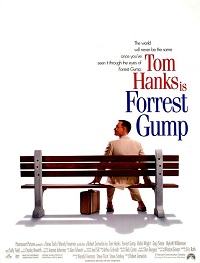
 映画『Forrest Gump』の舞台はアメリカ南部アラバマ州から始まります。
映画『Forrest Gump』の舞台はアメリカ南部アラバマ州から始まります。
“We lived about a quarter mile off Route about a half mile from the town of Greenbow, Alabama.”
(僕の家は17号線から4分の1マイル、アラバマ州グリーンボウの町から歩いて2分の1マイル)
フォレスト・ガンプの母親を演じるサリー・フィールドさんはカリフォルニア州の生まれですが、ルイジアナ州が舞台の映画『Steel Magnolias』でも南部訛りで力強い母親役を演じています。特徴的なのは母音を伸ばしてゆっくりと話す「サザン・ドロール」(Southern drawl)。
次のシーンでも、best がヴェースト、getがゲーッのように聞こえます。また、二重母音 [ai] を長母音 [a:] で発音されています。time がターッム、life がラーフと言っているように聞こえます。
Forrest Gump:
What’s the matter, Mama?
どうしたの?
Mrs. Gump:
I’m dying, Forrest. Come on in, sit down over here.
いよいよだめみたいね。さあ、こっちに来てかけなさい。
Forrest Gump:
Why are you dying, Mama?
どうしてだめなの
Mrs. Gump:
It’s my time. It’s just my time.
寿命よ これがママの寿命なの
Now, don’t you be afraid, sweetheart.
いいの 何も怖がることなんかないは
Death is just a part of life.
死は人生の一部なんだから
Something we’re all destined to do.
誰でも持ってる運命よ
I didn’t know it, but I was destined to be your mama.
私の運命はあんたの母親として生きたこと
I did the best I could.
でも、がんばった
Forrest Gump:
You did good.
がんばったよ
Mrs. Gump:
Well, I happen to believe you make your own destiny.
でしょ あんたも自分の運命を早くつかみなさい
You have to do the best with what God gave you.
後は自分の力で努力することよ
Forrest Gump:
What’s my destiny, Mama?
運命ってどういうこと?
Mrs. Gump:
You’re going to have to figure that out for yourself.
それは自分で見つけなければね
Life is a box of chocolates, Forrest. You never know what you’re going to get.
人生はチョコレートの箱とおんなじ 開けてみるまでわからない
Forrest Gump:
Mama always had a way of explaining things so I could understand them.
ママの説明が上手だったから僕はいつでも理解できた
I will miss you, Forrest.
あんたに会えなくなると寂しいわねえ
Forrest Gump:
She had got the cancer and died on a Tuesday. I bought her a new hat with little flowers on it.
And that’s all I have to say about that.
ママは癌だった 火曜日に亡くなった 僕は小さな花の飾りがある帽子を買ってあげた
僕の話はこれで終わりです
▽アラバマ州
 「人生はチョコレートの箱、開けてみるまで分からない」(“Mama always said life was like a box of chocolates. You never know what you’re gonna get.”)は、日本では映画のキャッチコピーとしても使われたフレーズですが、実は原作にはこの表現はありません。映画化の際に脚本化によって付け加えられた言葉なのかもしれません。
「人生はチョコレートの箱、開けてみるまで分からない」(“Mama always said life was like a box of chocolates. You never know what you’re gonna get.”)は、日本では映画のキャッチコピーとしても使われたフレーズですが、実は原作にはこの表現はありません。映画化の際に脚本化によって付け加えられた言葉なのかもしれません。
原作でチョコレートが登場するのは一度だけ。次のようなフレーズです。ややネガティブな表現の中で使われています。
“Being a idiot is no box of chocolates.”
バカっていうのは、箱の無いチョコレートのようなものだ。
ちなみに脚本家はエリック・ロス、わずか60ページの原作を2時間の映画に仕立てた『ベンジャミン・バトン』の脚本家でもあります。このように気に入った脚本家というテーマで映画をみてみるのもよいかもしれません。お気に入りの英文フレーズに出会えそうです。
映画『The Green Mile (グリーンマイル)』で南部アメリカ英語マンツーマンレッスン
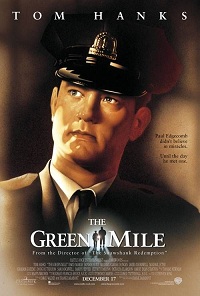

コールド・マウンテン刑務所(ルイジアナ州)、死刑囚監房の看守ポール・エッジコムはこう言います。
What happens on the Mile stays on the Mile.
Always has.
グリーンマイル(この監房)の出来事は外に出ない。
絶対に。
この「絶対に外に出ない出来事」が、映画『The Green Mile (グリーンマイル)』のストーリーです。
命を蘇生させるという不思議な力をもつジョン・コーフィーが、無実の罪を着せられていること知ってしまったポールは、耐え切れず自分の思いを打ち明けます。ジョンが脱走したいのであれば、その手助けさえする意思があることを伝えます。
”ought to ~”は義務を表す助動詞、should と同様の意味ですが、南部アメリカでよく使われる表現だそうで、”oughta ~”などの省略されて使用されることも多いようです。
Paul Edgecomb:
On the day of my judgment when I stand before God and He asks me why did l did I kill one of His true miracles. What am I going to say? That it was my job? It’s my job.
最後の審判の日、神の前に立った時、神はおれにお尋ねになる。”なぜ”お前は殺したのだ?奇跡を行う”私の使いを”。私はどう答える?”職務だったから”と?”職務だった”と?
John Coffey:
You tell God the Father it was a kindness you done. I know you’re hurting and worrying. I can feel it on you.
こう答えなさい ”私は親切な行いをしたのだ”と あんたは苦しんでいる おれは感じる
But you ought to quit on it now. I want it to be over and done with. I do.
だが もういい おれはこれ以上生きていたくないんだ
I’m tired, boss.Tired of being on the road, lonely as a sparrow in the rain.
おれは疲れた 雨の中のスズメのように一人旅に疲れた
I’m tired of never having me a buddy to be with to tell me where we’s going to, coming from, or why.
旅をともにする友達もなく どこから どこへ なぜさまようのかもわからない
Mostly, I’m tired of people being ugly to each other.
酷いことをし合う人間たちにもつかれた
I’m tired of all the pain I feel and hear in the world .every day.
毎日 世の中の苦しみを感じ聞くことにも疲れた
There’s too much of it.
もう耐えられない
It’s like pieces of glass in my head all the time.
いつも頭の中にガラスの破片がささっているようだ
Can you understand?
分かってくれる?
Paul Edgecomb:
Yes, John, I think I can.
分かるような気がする
(*)日本語訳『グリーンマイル』DVDより
▽The Green Mile Trailer
▽ルイジアナ州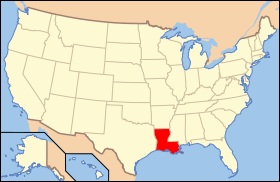 「グリーンマイルの出来事は外に出ない。絶対に。」の台詞の通り、「日本のグリーンマイル」での出来事も外に出ることはありません。
「グリーンマイルの出来事は外に出ない。絶対に。」の台詞の通り、「日本のグリーンマイル」での出来事も外に出ることはありません。
しかし、この映画のように漏れ伝わってくる話しがないわけではありません。裁判員制度という日本の新しい制度の下、私たちも「日本のグリーンマイル」のストーリーに思いを巡らす必要があるのかもしれません。
映画『Ray/レイ』で南部アメリカ英語マンツーマンレッスン
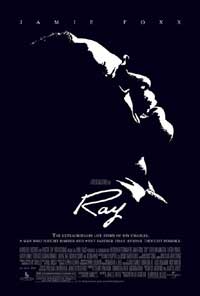
 もしも、生まれ故郷に足を踏み入れることを禁じられたら。
もしも、生まれ故郷に足を踏み入れることを禁じられたら。
歌手のレイ・チャールズは1930年9月23日アメリカ南部のジョージア州生まれ。「わが心のジョージ」が全米で大ヒットした翌年の1962年3月、ジョージア州のペイン大学で公演を行うことになっていました。会場は当時としては普通に、黒人と白人の観客席が分けられていました。しかし、そのことを学生たちが直接レイに抗議したところ、彼は寸前でライブを断念。激怒した白人プロモーターは契約違反を訴え、レイは敗訴。さらにジョージア州での演奏がその後18年もの間禁止されることになります。
映画『Ray/レイ』の中にこのシーンが登場しますが、南部アメリカ英語の特徴を見つけることができます。まず、二重否定と主語の省略。文法的には“There is nothing…”または“There isn’t anything…”と言うところを、主語のthereを省略して“Ain’t nothing…”と言っています。
また、“Y’all”も南部英語の象徴的な表現。You allが短縮された形で「ヤオール」とか「ヨール」と聞こえます。
PROTESTER:
No more segregation! No more segregation!
差別をなくせ! 差別をなくせ!
PROMOTER:
Welcome back to Augusta, Ray!
アーガスタへようこそ 歓迎するよ
RAY
Hey, good to see you.
いやあ どうも
PROTESTER:
No more segregation!
差別をなくせ!
REPORTER
Do you believe in the protest, Ray?
この訴えをどう思われます?
PROMOTER:
Get out of here! Ray, I’m sorry about this. Hurry on up inside.We got refreshments waiting.
じゃまだ レイ すまんな 早く中に入って冷たいものでも飲もう
PROTESTER:
Mr. Charles! Mr. Charles!
チャールズさん
You know tonight’s show is segregated? The dance floor is whites only. Negroes can’t leave the balcony.
今夜のショーも差別だ ダンスフロアーは白人だけ 黒人は踊れない
RAY
That’s how it is, man.
しょうがない ここは南部だ
PROTESTER:
You know, this is Georgia.You think we don’t know that? Negroes are persecuted in this state every day!
ここジョージアでは黒人は日々迫害を受けています
RAY
Ain’t nothing I can do about that.I’m an entertainer.And… and we all gotta play Jim Crow down here. I’m sorry, man.
俺になにができる 俺はただの歌手だ 郷に入れば郷に従え
PROMOTER:
Now get out of here, boy.
失せろ
PROTESTER:
It doesn’t have to be that way. You could change things, right here and now!
差別は間違っている 今すぐにも正すべきです
RAY
I’m sorry, son. Ain’t nothing I can do.
俺には同にもできない
PROMOTER:
You hear that, boy? That’s the way things are. Ain’t nothing or nobody can change it.
聞いたか? 誰にも変えようのないものがあるんだ
Now get your black ass out of here, and take that trash with you!
わかったらその黒いケツをあげて、とっとと失せろ
RAY
Hold on… hold on. He… he’s right. He’s right, Jeff. Get them on the bus.
待ってくれ 彼の言う通りだ ジェフ バスに戻ろう
JEFF
You sure?
本気ですか?
RAY
Get them back on the bus!
バスに戻れ
JEFF
Y’all heard him! Y’all heard Ray! Back on the bus!
聞いたか? みんなバスに戻れ
PROMOTER:
Are you serious?
正気か?
RAY
Get them on the bus. I can’t do nothing here.
バスに戻る ここでは歌えない
PROMOTER:
Ray, you know me. I’m not gonna lose money just because you suddenly got religion.
いいんだな? わしは損を被って黙っているような男じゃないぞ
RAY
Ain’t nothing I can do, man.
もう決めた
PROMOTER:
We have a contract with me. You break it, I’ll sue your ass! I’ll win, Ray!
契約がある 訴えてやるぞ わしが勝つ
RAY
You gotta do what you gotta do.
好きにしてくれ
PROMOTER:
Look, I’ll win big!
後悔するぞ
RAY
Do what you gotta do.
気にしないね
PROMOTER:
I told you, I’ll own your ass, Ray!
ケツの毛までむしってやる
PROTESTER:
Thank you, Mr. Charles. You could be the first.
ありがとう チャールズさん 先駆者です
RAY
No, thank you, son.You were right. You’re right.
僕こそ礼を言う 君の言う通りだ
PROMOTER:
You’ll never work Georgia again!
二度とジョージアには来させない!
(*)参考 DVD『Ray/レイ』
自伝『わが心のジョージア レイ・チャールズ物語』 では、この事件について次のように語っています。
誤解しないでほしい。私はアメリカの白人全員を責めようなどと思ったわけではなく、特定のグループを悪者に仕立てるつもりもなかった。白人たちは、黒人にランチを出したり、ガソリン・スタンドのトイレを貸したりして、自分たちが仕事を失うはめになるのを恐れていたのだ。彼らには、友人からのプレッシャーがあったようだ。もし白人が黒人に親切にしようものなら、彼の仲間は「おまえは黒んぼ好きか?(略)」とどなりつけたことだろう。
一方で、白人判事によって設定された人種別の学校制度を変えようとした有名な最高裁判決の話も知っていた。(略)
盲目であるおかげで、人種間の違いに気づかずにいられた。(略)私は肌の色を気にしたことがない。男性や女性を見る時には、その内面を知りたいと思う。色の違いや見た目にこだわるのは愚かなこと。それは進展を阻むものであり、私には色の違いも見えなければ、そうした差別も理解できないものなのである。
幼い頃に視力を失ったレイの苦悩を、目が見える人々が推し量ることはとても難しいことなのだと思います。その一方で、私たちは見える世界に気をとられるがあまり、本当に大切なことに気づきづらくなっているのかもしれません。毎日のように当たり前のように視界に入ってくる世界を一度遮断してみる。一瞬でも目を瞑り、聞こえてくる音に集中してみる。そうすることで、本質的な何かに気づけるのかもしれません。
▽ジョージア州 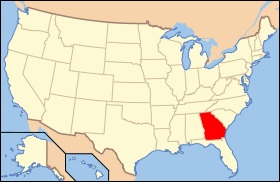
(*)参考書籍
『わが心のジョージア レイ・チャールズ物語』 (レイ・チャールズ&ヂヴィッド・リッツ共著 吉岡正晴訳・監修)
映画『Cold Mountain (コールドマウンテン)』で南部アメリカ英語マンツーマンレッスン
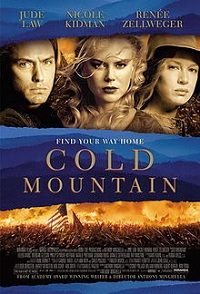
 なぜ、アメリカ南北戦争は起こったのでしょうか?
なぜ、アメリカ南北戦争は起こったのでしょうか?
一般的に南部諸州の奴隷制度を巡る戦いと言われますが、当時の大統領エイブラハム・リンカーンの本来の目的は、奴隷制の廃止ではありませんでした。彼の究極の目的は、アメリカ政府(北部側)が南部の広大な土地と資源、そして市場を支配し続けることでした。
映画『Cold Mountain(コールドマウンテン)』の舞台となるサウスカロライナ州のアパラチアには、他の南部の平地地方と異なり、気候が厳しく土壌が痩せていたために大農園はなく、奴隷を所有できる農民も少なかったので、戦争の意味の捉え方も違っていました。「なぜアメリカ人同士が血で血を洗うような戦いを続けるのか?」という疑問を映画でも描いています。
主人公のエイダ(Ada)は牧師の父とともに、チャールストンからコールドマウンテンの山間に越してきます。急病で父を亡くしてしまったエイダは、地元の少女ルビー(Ruby)と共同生活を送ることになります。興味深いのは、この二人の話す英語が全く異なるのです。原因は二人が生まれ育った境遇の違いにあるようです。
同名の原作小説によれば、エイダは父親の方針で、徹底的に教育を受けます。芸術、政治、文学、フランス語、ラテン語、ギリシャ語、編み物、刺繍、ピアノ、鉛筆画、水彩画。よく本も読みました。ところが、自給自足で生活を送らなければならない戦時下では、このエイダの能力はひとつも役に立ちませんでした。
一方、ルビーは生まれたときから母親を知らず、父親は近所で有名な問題人間。家に木の床はなく、地面にじかに住み、壁から突き出した棚で寝起きし、乾いた苔を袋に詰め込み、マットレス代わりに使っていました。おそらく学校に通ったことはなく、文字は独学で学んだのでしょう。
そんなルビーが一人では何もできないエイダを手伝いにやってきます。映画で二人が初めて出会うシーンです。ルビーには南部アメリカ英語の特徴である g-droppingsの傾向がみられ、語末の-ingのg音はほとんど抜け落ちています。また、「I ain’t a servant」と、ルビーは 頻繁にain’tを使用しているのにたいして、アイダは「You’re not a servant」とain’tをare not言い換えて復唱するなど、ain’tを決して使いません。同じ南部生まれでも、二人が生きてきた環境がこの瞬間まで全く異なっていたことが良くわかるシーンです。
Ruby:
That cows wants milkin’. If that letter ain’t urgent, then cows is what I’m sayin’.
手紙を書くより 牛のお乳をしぼった方がいいんじゃない?
Ada:
I don’t know you.
あなたは?
Ruby:
Old lady Swanger says you need help. Here I am.
サリー・スワンがーがここの手伝いをしろって
Ada:
I… I need help but… I need… I do need help, but I need a labore.
手伝いは必要だけど力仕事ができなくては…
There’s… there’s plowing and rough work. I think there’s been a misunderstanding.
畑を耕したり 物を運んだりするのよ。 せっかくだけど
Ruby:
What’s that rake for?
その熊手は?
Ada:
The rake?
熊手?
Ruby:
Well, it ain’t for gradenin’, that’s for sure.
花壇のお手入れ?
Number one, you got a horse? I can plow all day. I’m a worker.
1つ あたしは畑仕事が得意
Number two, ain’t no man better’n me.
2つ 男もかなわない
’cause there ain’t no man around who ain’t old or full of mischief.
残っている男は年寄りと子供だから
I know your plight.
不運は聞いたわ
Ada:
My plight?
不運?
Ruby:
Am I hard to hear? Cause you keep repeatin’ everythin’.
いちいち聞き返さないでよ
I ain’t look’ for money. I never cared for it and it ain’t worth nothin’.
お金は要らないわ 価値がないから
I expect to board and eat, at the same table.
食事と寝床だけ
I ain’t a servant, if you get my meanin’.
メイドじゃないから同じテーブルに
Ada:
You’re not a servant.
メイドじゃない
Ruby:
People’s gonna have to empty their own night jars is my point.
寝室の便器は自分で始末する
And I don’t expect to work whilst you sit around and watch, neither.
あんたも働くのよ
Ada:
Right.
Ruby:
Right. Is that a yes or a no?
それはイエス? ノー?
二人は共同生活を始め、ルビーはエイダに畑仕事や狩を教えます。エイダはルビーに『嵐が丘』を読み聞かせ、亡き父への想いを語り、戦地にいる恋人インマンに対する気持ちを打ち明けます。それまで全く重なることがなかった二人の人生が、お互いの心根を垣間見るうちに、二人の間に信頼が生まれ、友情が芽生えていきます。
▽サウスカロライナ州 アパラチアはかつてチェロキーが静かにくらしていた場所です。ところがアメリカ合衆国によってその地を追われてしまいます。チェロキーの「高い山の頂は天国と接している」という言葉から、「コールドマウンテンがその場所だ」と信じられるようになる原作のエピソードが印象的です。
アパラチアはかつてチェロキーが静かにくらしていた場所です。ところがアメリカ合衆国によってその地を追われてしまいます。チェロキーの「高い山の頂は天国と接している」という言葉から、「コールドマウンテンがその場所だ」と信じられるようになる原作のエピソードが印象的です。
(*)参考図書
『学校では教えてくれない本当のアメリカの歴史』
(ハワード・ジン著)
『コールドマウンテン』
(チャールズ・フレイジャー著、土屋政雄訳)
『ロックを生んだアメリカ南部』
(ジェームス・バーダマン 村上薫共著)
映画『Mississippi Burning(ミシシッピー・バーニング)』で南部アメリカ英語マンツーマンレッスン その2
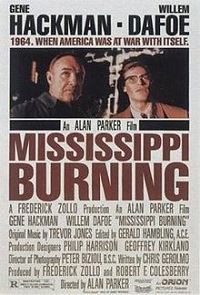
 映画『Mississippi Burning(ミシシッピー・バーニング)』の舞台になっているのは、1964年のミシシッピー州。この時代は黒人に選挙権の登録を促進させようとした公民権運動が非常に活発になっていました。その機運が高まれば高まる程、同州では一部の白人による、黒人に対するリンチ、暴行、放火、爆破、吊るし首など、目を覆いたくなるような暴力が激化していった時代でもあったそうです。映画の中でもその光景が描かれていますが、あまりの残忍さに目を覆いたくなります。
映画『Mississippi Burning(ミシシッピー・バーニング)』の舞台になっているのは、1964年のミシシッピー州。この時代は黒人に選挙権の登録を促進させようとした公民権運動が非常に活発になっていました。その機運が高まれば高まる程、同州では一部の白人による、黒人に対するリンチ、暴行、放火、爆破、吊るし首など、目を覆いたくなるような暴力が激化していった時代でもあったそうです。映画の中でもその光景が描かれていますが、あまりの残忍さに目を覆いたくなります。
なぜ、これらの白人は黒人をここまで憎むことになったのでしょう。そもそもの原因はどこにあったのでしょうか。書籍『American Slavery, American Freedom(アメリカの奴隷制とアメリカの自由)』(エドマンド・モーガン著)には、「人種差別は、黒人と白人の違いからもたらされる<自然な>感情ではなかった」と書かれています。
映画では、北部出身のFBI捜査官Rupert Anderson(ルパート・アンダーソン)が、同僚でかつてミシシッピー州の警官だった南部出身のRupert Anderson(アラン・ウォード)に、この憎しみの根源がどこから生まれたのかを問うシーンがあります。
Alan Ward
Where does it come from, all this hatred?
一体なぜ こんな憎しみが?
Rupert Anderson
You know, when I was a little boy……there was an old Negro farmer lived down the road from us, name of Monroe.
おれが子供の頃、近所にモンローって黒人がいた。
And he was… Well, I guess he was just a little luckier than my daddy was.
そいつは、おやじより運のいい奴だ。
He bought himself a mule.
ラバを買った。
That was a big deal around that town.
当時 大変なものだった。
My daddy hated that mule.
おやじは嫌ってた。
His friends kidded him that they saw Monroe ploughin’ with his new mule…..
皆がはやした。モンローはラバで畑を耕してる。
and Monroe was gonna rent another field now that he had a mule.
モンローの畑はどんどんでかくなってね。
One morning that mule just showed up dead.
ある朝 ラバが死んでた。
They poisoned the water.
だれかが毒を。
After that there was never any mention about that mule around my daddy.
以来 だれもラバの話をしなくなった。
One time we were drivin’ past, Monroe’s place and we saw it was empty.
ある日、モンローの家はからになっていた。
He’d just packed up and left, I guess. Gone up North or somethin’.
北部にでも行ったんだろう。
I looked over at my daddy’s face……and I knew he’d done it.
おやじの顔を見たよ。おやじの仕業だった。
And he saw that I knew. He was ashamed. I guess he was ashamed.
おやじは息子に気づかれて、恥じたんだろう。
He looked at me and he said……”If you ain’t better than a nigger, son, who are you better than?”
おれにこう言った。「クロに負けちゃおしまいだ」とね。
Alan Ward
Do you think that’s an excuse?
言い訳か?
Rupert Anderson
No, it’s not an excuse. It’s just a story about my daddy.
おやじの話をしたのさ。
Alan Ward
Where does that leave you?
つまり?
Rupert Anderson
With an old man who was so full of hate……that he didn’t know that bein’ poor was what was killin’ him.
黒人を憎んだおやじの本当の敵は貧乏だった。
(日本語訳:同映画DVD字幕より)
当時の南部アメリカを考える際に忘れてはいけないのは、迫害を受けた黒人のことだけではなく、「貧乏白人」(プアホワイト/一種の差別用語)の存在です。貧困問題が問題と言われるのは、貧困そのものではなく、そのことが人々の心にもたらす負の感情、その感情によって引き起こされる副次的な出来事、さらには、その感情が第三者によって都合よく利用されてしまうことではないでしょうか。
名作は過去の歴史を知るだけではなく、今の時代の問題に気づかせてくれるきっかけをもたらしてくれるようです。
▽Mississippi Burning
映画『In The Heat Of The Night(夜の大捜査線)』で南部アメリカ英語マンツーマンレッスン
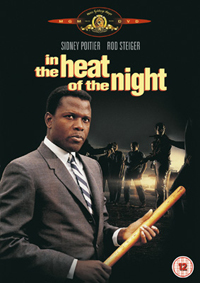
 アメリカの口語英語でよく、ain’tとうい単語を耳にします。これは、次のようなbe動詞の否定と同じ意味を表します。
アメリカの口語英語でよく、ain’tとうい単語を耳にします。これは、次のようなbe動詞の否定と同じ意味を表します。
Am not Are not Is not
今では全米各地で耳にするようになっていますが、もともとはその特徴的なイントネーションとあわせてアメリカ南部英語特有の表現だったそうです。
“I aint going.” ”We aint going.” ”He aint going.”
映画『In The Heat Of The Night』の中に、この表現の南部と北部の違いを感じさせる場面がありました。Virgil Tibbs(ヴァージル・ティッブス)はフィラデルフィア警察の敏腕刑事、ミシシッピー州の小さな町を通りかかったところ殺人事件に巻き込まれて行きます。現地の警察が捕まえた容疑者Harveyをほんの一瞬調べただけで、Tibbsは彼が無罪であることを見抜きます。
北部出身のTibbsと、ミシシッピーの警官の会話です。
Virgil Tibbs
He’s left-handed, isn’t he?
(彼は左利きだ。そうだろう?)
現地警官1
How do I know?
(なんで?)
Virgil Tibbs
Well, he seemed left-handed to me.
(私にはそう見えた)
現地警官2
I believe Harvey is a southpaw.
Now, ain’t he, Shagbag?
(彼はサウスポーだな。そうだう?)
現地警官3
What if he is? What’s that make him?
(だったら何だ?)
Virgil Tibbs
Innocent.
(彼は無実だ)
他にもこの映画でミシシッピーの役の人々は何度もain’tを使いますが、北部出身のTibbsは一度も使うことはありませんでした。
Bill Gillespie 警察署長
There ain’t no trains this time of mornin’.
(朝のこの時間に列車はない。)
Harvey Oberst 容疑者
Well, I ain’t got no watch, but it must have been after two, by the courthouse clock.
(時計は持っていないが、裁判所の時計で2時過ぎだった。)
Ralph Henshaw 食堂の給仕
I ain’t servin’ him!
(奴に食わせるものなど無い)
James Patterson Deloresの兄
I ain’t talkin’ about this with him in the room.
(奴がこの部屋にいるんだったら俺は話さないぞ)
この映画が発表されたのは1967年。アメリカでは公民権運動の機運が高まり、北部と南部が緊張関係にあった時代でした。
監督のNorman Jewison(ノーマン・ジュイソン)は次のように解説しています。
「1967年当時のアメリカについて話したい。その頃アメリカは公民権運動のまっただ中で、各地でデモが行われ都市部では焼き討ちが続出した。人々が大義のために死んでいった。迫害の時代に、私は素晴らしい映画を撮る機会に恵まれた。主人公は南部の町に足止めを食った黒人刑事。67年の時点では横行していた人種差別を体験する話だ。時代をとらえた企画だった。」
どんな言葉を使うのかとういことは、あなたが誰であるのかを表すものなのかもしれません。
▽In the Heat of the Night (1967) Trailer
(*)関連リンク
▽ain’t の意味は

